

What Is Ecotourism?
Conservation, offering market-linked long-term solutions, ecotourism provides effective economic incentives for conserving and enhancing bio-cultural diversity and helps protect the natural and cultural heritage of our beautiful planet., communities, by increasing local capacity building and employment opportunities, ecotourism is an effective vehicle for empowering local communities around the world to fight against poverty and to achieve sustainable development., interpretation, with an emphasis on enriching personal experiences and environmental awareness through interpretation, ecotourism promotes greater understanding and appreciation for nature, local society, and culture., the definition., ecotourism is now defined as “responsible travel to natural areas that conserves the environment, sustains the well-being of the local people, and involves interpretation and education” (ties, 2015). education is meant to be inclusive of both staff and guests., principles of ecotourism, ecotourism is about uniting conservation, communities, and sustainable travel. this means that those who implement, participate in and market ecotourism activities should adopt the following ecotourism principles:.
- Minimize physical, social, behavioral, and psychological impacts.
- Build environmental and cultural awareness and respect.
- Provide positive experiences for both visitors and hosts.
- Provide direct financial benefits for conservation.
- Generate financial benefits for both local people and private industry.
- Deliver memorable interpretative experiences to visitors that help raise sensitivity to host countries’ political, environmental, and social climates.
- Design, construct and operate low-impact facilities.
- Recognize the rights and spiritual beliefs of the Indigenous People in your community and work in partnership with them to create empowerment.
Privacy Overview
Necessary cookies are absolutely essential for the website to function properly. This category only includes cookies that ensures basic functionalities and security features of the website. These cookies do not store any personal information.
Any cookies that may not be particularly necessary for the website to function and is used specifically to collect user personal data via analytics, ads, other embedded contents are termed as non-necessary cookies. It is mandatory to procure user consent prior to running these cookies on your website.
- WordPress.org
- Documentation
What Is Ecotourism? Definition, Examples, and Pros and Cons
- Chapman University
- Sustainable Fashion
- Art & Media
Ecotourism Definition and Principles
Pros and cons.
- Examples of Ecotourism
- Frequently Asked Questions
Ecotourism is about more than simply visiting natural attractions or natural places; it’s about doing so in a responsible and sustainable manner. The term itself refers to traveling to natural areas with a focus on environmental conservation. The goal is to educate tourists about conservation efforts while offering them the chance to explore nature.
Ecotourism has benefited destinations like Madagascar, Ecuador, Kenya, and Costa Rica, and has helped provide economic growth in some of the world’s most impoverished communities. The global ecotourism market produced $92.2 billion in 2019 and is forecasted to generate $103.8 billion by 2027.
A conservationist by the name of Hector Ceballos-Lascurain is often credited with the first definition of ecotourism in 1987, that is, “tourism that consists in travelling to relatively undisturbed or uncontaminated natural areas with the specific object of studying, admiring and enjoying the scenery and its wild plants and animals, as well as any existing cultural manifestations (both past and present) found in these areas.”
The International Ecotourism Society (TIES), a non-profit organization dedicated to the development of ecotourism since 1990, defines ecotourism as “responsible travel to natural areas that conserves the environment, sustains the well-being of the local people, and involves interpretation and education [both in its staff and its guests].”
The International Union for Conservation of Nature (IUCN) looks at ecotourism as a significant tool for conservation, though it shouldn’t be seen as a fix-all when it comes to conservation challenges:
“There may be some areas that are just not appropriate for ecotourism development and some businesses that just won’t work in the larger tourism market. That is why it is so important to understand the basics of developing and running a successful business, to ensure that your business idea is viable and will be profitable, allowing it to most effectively benefit the surrounding environment and communities.”
Marketing an ecosystem, species, or landscape towards ecotourists helps create value, and that value can help raise funds to protect and conserve those natural resources.
Sustainable ecotourism should be guided by three core principles: conservation, communities, and education.
Conservation
Conservation is arguably the most important component of ecotourism because it should offer long-term, sustainable solutions to enhancing and protecting biodiversity and nature. This is typically achieved through economic incentives paid by tourists seeking a nature-based experience, but can also come from the tourism organizations themselves, research, or direct environmental conservation efforts.
Communities
Ecotourism should increase employment opportunities and empower local communities, helping in the fight against global social issues like poverty and achieving sustainable development.
Interpretation
One of the most overlooked aspects of ecotourism is the education component. Yes, we all want to see these beautiful, natural places, but it also pays to learn about them. Increasing awareness about environmental issues and promoting a greater understanding and appreciation for nature is arguably just as important as conservation.
As one of the fastest growing sectors of the tourism industry, there are bound to be some downsides to ecotourism. Whenever humans interact with animals or even with the environment, it risks the chance of human-wildlife conflict or other negative effects; if done so with respect and responsibility in mind, however, ecotourism can reap enormous benefits to protected areas.
As an industry that relies heavily on the presentation of eco-friendly components to attract customers, ecotourism has the inevitable potential as a vessel for greenwashing. Part of planning a trip rooted in ecotourism is doing research to ensure that an organization is truly providing substantial benefits to the environment rather than exploiting it.
Ecotourism Can Provide Sustainable Income for Local Communities
Sustainably managed ecotourism can support poverty alleviation by providing employment for local communities, which can offer them alternative means of livelihood outside of unsustainable ones (such as poaching).
Research published in Proceedings of the National Academy of Sciences found that communities in regions surrounding conservation areas in Costa Rica had poverty rates that were 16% lower than in areas that weren’t near protected parks. These protected areas didn’t just benefit from conservation funds due to ecotourism, but also helped to reduce poverty as well.
It Protects Natural Ecosystems
Ecotourism offers unique travel experiences focusing on nature and education, with an emphasis on sustainability and highlighting threatened or endangered species. It combines conservation with local communities and sustainable travel , highlighting principles (and operations) that minimize negative impacts and expose visitors to unique ecosystems and natural areas. When managed correctly, ecotourism can benefit both the traveler and the environment, since the money that goes into ecotourism often goes directly towards protecting the natural areas they visit.
Each year, researchers release findings on how tourist presence affects wildlife, sometimes with varying results. A study measuring levels of the stress hormone cortisol in wild habituated Malaysian orangutans found that the animals were not chronically stressed by the presence of ecotourists. The orangutans lived in the Lower Kinabatangan Wildlife Sanctuary, where a local community-managed organization operates while maintaining strict guidelines to protect them.
Ecotourism May Also Hurt Those Same Natural Ecosystems
Somewhat ironically, sometimes ecotourism can hurt ecosystems just as much as it can help. Another study in the journal Trends in Ecology and Evolution found that ecotourism can alter animal behaviors in ways that put them at risk. If the presence of humans changes the way animals behave, those changes may make them more vulnerable by influencing their reaction to predators or poachers.
It's not just the animals who are at risk. As ecotourism activities become too popular, it can lead to the construction of new infrastructure to accommodate more visitors. Similarly, more crowds mean more pressure on local resources, increased pollution, and a higher chance of damaging the soil and plant quality through erosion. On the social side, these activities may displace Indigenous groups or local communities from their native lands, preventing them from benefiting from the economic opportunities of tourism.
Ecotourism Offers the Opportunity to Experience Nature
Renown conservationist Jane Goodall has a famous quote: “Only if we understand, will we care. Only if we care, will we help. Only if we help, shall all be saved.” It can be difficult to understand something that we haven’t seen with our own eyes, and ecotourism gives travelers the opportunity to gain new experiences in natural areas while learning about the issues they face.
Ecotourism also educates children about nature, potentially creating new generations of nature lovers that could someday become conservationists themselves. Even adult visitors may learn new ways to improve their ecological footprints .
EXAMPLES OF ECOTOURISM
The East African country has some competitive advantages over its neighbors thanks to its rich natural resources, paired with the fact that it has allocated over 25% of its total area to wildlife national parks and protected areas. Because of this, an estimated 90% of tourists visit to Tanzania seeking out ecotourism activities. Ecotourism, in turn, supports 400,000 jobs and accounts for 17.2% of the national GDP, earning about $1 billion each year as its leading economic sector.
Some of Tanzania’s biggest highlights include the Serengeti, Mount Kilimanjaro , and Zanzibar, though the country still often goes overlooked by American tourists. Visitors can take a walking safari tour in the famous Ngorongoro Conservation area, for example, with fees going to support the local Maasai community.
The country is also known for its chimpanzees , and there are several ecotourism opportunities in Gombe National Park that go directly towards protecting chimpanzee habitats.
Galapagos Islands
It comes as no surprise that the place first made famous by legendary naturalist Charles Darwin would go on to become one of the most sought-after ecotourism destinations on Earth, the Galapagos Islands .
The Directorate of the Galapagos National Park and the Ecuadorian Ministry of Tourism require tour providers to conserve water and energy, recycle waste, source locally produced goods, hire local employees with a fair wage, and offer employees additional training. A total of 97% of the land area on the Galapagos is part of the official national park, and all of its 330 islands have been divided into zones that are either completely free of human impact, protected restoration areas, or reduced impact zones adjacent to tourist-friendly areas.
Local authorities still have to be on their toes, however, since UNESCO lists increased tourism as one of the main threats facing the Galapagos today. The bulk of funding for the conservation and management of the archipelago comes from a combination of governmental institutions and entry fees paid by tourists.
Costa Rica is well-known throughout the world for its emphasis on nature-based tourism, from its numerous animal sanctuaries to its plethora of national parks and reserves. Programs like its “Ecological Blue Flag” program help inform tourists of beaches that have maintained a strict set of eco-friendly criteria.
The country’s forest cover went from 26% in 1983 to over 52% in 2021 thanks to the government’s decision to create more protected areas and promote ecotourism in the country . Now, over a quarter of its total land area is zoned as protected territory.
Costa Rica welcomes 1.7 million travelers per year, and most of them come to experience the country’s vibrant wildlife and diverse ecosystems. Its numerous biological reserves and protected parks hold some of the most extraordinary biodiversity on Earth, so the country takes special care to keep environmental conservation high on its list of priorities.
New Zealand
In 2019, tourism generated $16.2 billion, or 5.8% of the GDP, in New Zealand. That same year, 8.4% of its citizens were employed in the tourism industry, and tourists generated $3.8 billion in tax revenue.
The country offers a vast number of ecotourism experiences, from animal sanctuaries to natural wildlife on land, sea, and even natural caves. New Zealand’s South Pacific environment, full of sights like glaciers and volcanic landscapes, is actually quite fragile, so the government puts a lot of effort into keeping it safe.
Tongariro National Park, for example, is the oldest national park in the country, and has been named by UNESCO as one of only 28 mixed cultural and natural World Heritage Sites. Its diverse volcanic landscapes and the cultural heritage of the indigenous Maori tribes within the create the perfect combination of community, education, and conservation.
How to Be a Responsible Ecotourist
- Ensure that the organizations you hire provide financial contributions to benefit conservation and find out where your money is going.
- Ask about specific steps the organization takes to protect the environment where they operate, such as recycling or promoting sustainable policies.
- Find out if they include the local community in their activities, such as hiring local guides, giving back, or through initiatives to empower the community.
- Make sure there are educational elements to the program. Does the organization take steps to respect the destination’s culture as well as its biodiversity?
- See if your organization is connected to a non-profit or charity like the International Ecotourism Society .
- Understand that wildlife interactions should be non-invasive and avoid negative impacts on the animals.
Ecotourism activities typically involve visiting and enjoying a natural place without disturbing the landscape or its inhabitants. This might involve going for a hike on a forest trail, mountain biking, surfing, bird watching, camping, or forest bathing .
Traveling in a way that minimizes carbon emissions, like taking a train or bike instead of flying, may also be part of an ecotourism trip. Because these modes of travel tend to be slower, they may be appreciated as enjoyable and relaxing ecotourism activities.
The Wolf Conservation Center ’s programing in New York State is an example of ecotourism. This non-profit organization is dedicated to the preservation of endangered wolf species. It hosts educational sessions that allow visitors to observe wolves from a safe distance. These programs help to fund the nonprofit organization’s conservation and wildlife rehabilitation efforts.
Stonehouse, Bernard. " Ecotourism ." Environmental Geology: Encyclopedia of Earth Science , 1999, doi:10.1007/1-4020-4494-1_101
" What is Ecotourism? " The International Ecotourism Society .
" Tourism ." International Union for Conservation of Nature .
https://doi.org/10.1073/pnas.1307712111
https://doi.org/10.1371/journal.pone.0033357
https://doi.org/10.1016/j.tree.2015.09.010
https://doi.org/10.5897/JHMT2016.0207
" Galapagos Islands ." UNESCO .
" About Costa Rica ." Embassy of Costa Rica in Washington DC .
https://www.stats.govt.nz/information-releases/tourism-satellite-account-2019
- What Is Sustainable Tourism and Why Is It Important?
- How to Be a Sustainable Traveler: 18 Tips
- Best of Green Awards 2021: Sustainable Travel
- Costa Rica’s Keys to Success as a Sustainable Tourism Pioneer
- What Is Community-Based Tourism? Definition and Popular Destinations
- What Is Voluntourism? Does It Help or Harm Communities?
- What Is Overtourism and Why Is It Such a Big Problem?
- Defeating Deforestation Through Rum, Chocolate, and Ecotourism
- Why Are National Parks Important? Environmental, Social, and Economic Benefits
- Why Bonobos Are Endangered and What We Can Do
- What Is a Wilderness Area? Definition and Examples
- The World’s Smallest Tiger Is Inching Towards Extinction
- Regenerative Travel: What It Is and How It's Outperforming Sustainable Tourism
- Top 8 Agritourism Destinations in the World
- 15 of the Most Beautiful Botanical Gardens in the US
- 15 of the Best City Parks in America
- Phone This field is for validation purposes and should be left unchanged.
- Climate Change
- Policy & Economics
- Biodiversity
- Conservation
Get focused newsletters especially designed to be concise and easy to digest
- ESSENTIAL BRIEFING 3 times weekly
- TOP STORY ROUNDUP Once a week
- MONTHLY OVERVIEW Once a month
- Enter your email *
- Comments This field is for validation purposes and should be left unchanged.
Explainer: What Is Ecotourism?

The world has slowly become more connected over time. People take an interest in other cultures and want to experience them themselves. Traveling is an exciting part of life because it broadens your horizons and provides excellent educational opportunities, but how can you do so sustainably? To celebrate World Tourism Day 2023 under the theme “Tourism and green investment”, we dive deep into the world of ecotourism and explore new and innovative solutions to promote the movement of people around the world.
What Is Ecotourism?
Ecotourism involves traveling sustainably. When you vacation, domestically or abroad, you stay conscious of the environment as much as possible. Ecotourists try to limit their carbon footprint and support local ecosystems by contributing positively. For example, they could eat at a local restaurant or refrain from using plastic on their trip. Ecotourism has become critical as people try to expand their worldview while staying environmentally conscious.
Why Should You Practice Ecotourism?
Tourism is vital for many communities worldwide. Vacationers spend their money to help small businesses thrive and to stimulate local economies. However, tourism can negatively impact the environment. A 2022 study found that tourism is responsible for nearly 8% of the world’s carbon dioxide (CO2) emissions, most of which came from food and waste management.
The pandemic hit the tourism industry with a steep 74% decline in international travel. Many countries had lockdowns in place to prevent COVID-19 transmission from foreign places. While this contributed to a significant drop in carbon emissions in 2020, tourist-dependent nations suffered huge economic losses.
Three years after the first case was detected in Wuhan, China, the pandemic is finally winding down and international travel is resuming, with air traffic set to reach 2019 levels soon. Last year saw a 153% increase in air travel compared to 2021 and about 62% pre-pandemic levels. In 2023, air traffic is expected to continue rising as most countries lift restrictions.
The bounce-back of tourism means the same will happen in terms of emissions. In 2022, GHG emissions increased by 7% in the first quarter compared to 2020.
It is critical to practice ecotourism as global warming becomes more apparent. You’ll benefit from learning and becoming a better friend to the environment. Implementing ecotourism comes with many benefits:
- Educate yourself: The most significant benefit of ecotourism is educating yourself on environmental issues. If you find ways to be environmentally conscious on your trip, you are more likely to repeat those behaviors at home. Reading literature and research from scientists puts into perspective how the planet needs your help to survive.
- Protect resources: Sustainable travel means using natural and renewable resources to improve the planet’s health. You’re protecting the environment around you from the negative impacts of travel. If you believe in leaving something better than when you found it, ecotourism is the way to go.
- Help economies: Practicing ecotourism means other vacationers behind you also get to enjoy a clean environment . One way is by spending your money at local businesses. These shops are the heart of communities and give the location its remarkable personality. Patronising these companies helps them grow and continue their services for future visitors.
How Can You Be Mindful on Vacation?
It’s challenging to be perfect regarding your carbon footprint when traveling, but there are ways to limit your environmental impact abroad and contribute positively to the area. These five ways show how you can be a mindful ecotourist on your next trip.
1. Research Ecotourism Locations
Ecotourism starts before you travel. Research as thoroughly as possible to see what destinations are the most conducive to ecotourism and find ways to be an ecotourist at the location. For example, you could look for hotels with biophilic designs. These spaces combine buildings with nature to maintain a connection with the environment. You may see natural materials like hardwood , stones, and trees inside the facility.
Ecotourism means accounting for your environmental impact, but you should also examine how the area cares about green practices. When planning a trip, search for cities that implement eco-friendly policies to promote ecotourism. For example, Seattle, Washington, uses hydroelectric power for nearly 100% of its energy consumption.
2. Beware of Greenwashing
Talking about environmentally friendly practices is one thing, but implementing them and supporting the planet are the next steps that some businesses do not take. You may know this strategy as greenwashing . Due diligence can tell you which organisations stay true to their word and which only use eco-friendliness as a marketing term.
It is essential to be able to spot greenwashing when you travel. Research hotels and businesses in the area and review their practices. How do they align with environmentally positive initiatives that they claim? For example, in 2018, Hilton said it would reduce CO2 emissions. However, critics accused the company of greenwashing because it cut down palm and mangrove trees to build its resort in the Maldives. Tearing down palm trees significantly affects carbon levels in the atmosphere.
One way to research a company like Hilton for greenwashing is to examine its environmental, social and governance (ESG) scores. These metrics track companies’ operations and give an objective measurement to gauge practices. Organisations like Bloomberg developed databases that show exhaustive lists of ESG scores. They monitor thousands of businesses worldwide, so it is easier to see which are telling the truth beyond their ‘green’ campaigns.
3. Visit a Wildlife Refuge
Part of ecotourism is finding ways to limit your environmental impact, but you can make positive contributions while still having fun. Visit a wildlife refuge when on vacation. These sanctuaries are some of the best places to support wildlife conservation and educate yourself.

Photo by Joshua J. Cotten on Unsplash
Wildlife refuges provide large, safe, and green spaces for animals to thrive. Many of them risk extinction and can thrive in a sanctuary. The money you spend at the refuges goes toward keeping the facilities standing and funding research to examine these animals. There are wildlife sanctuaries in all 50 states and five territories in the U.S. Internationally, there are numerous opportunities on every continent to support conservation.
Seeing wildlife is a terrific experience, but remember to be mindful when visiting. For example, do not disturb animals by calling or touching them, and refrain from feeding them, even if they approach you. These creatures have special diets and oftentimes, human food is not suitable for them. If you bring food, clean up your waste afterward. Curious wildlife may get their heads stuck in plastic containers or eat things they are not supposed to.
4. Use Green Transportation Methods
Another way to practice ecotourism is to use green transportation methods. This strategy is something you can do abroad and practice at home. Eco-friendly transit reduces your carbon footprint significantly because it reduces greenhouse gas (GHG) emissions and negative environmental impacts.

Photo by freestocks on Unsplash
Depending on your destination, you should search for ways to take public transportation. These options may include buses, trains and metro lines. Public transit is more efficient than passenger vehicles because it emits 45% fewer CO2 emissions than cars on the road. Use bicycles and other low-emissions options if it’s not available.
5. Learn Local Customs
Ecotourism goes hand-in-hand with mindful traveling. When you vacation, try to be one with the culture and immerse yourself. That’s how you get the most out of your travels. Learn local customs and find out what the residents do. They say when in Rome, do as the Romans do — and that’s a solid start for being an ecotourist.
Eating local food is an excellent way to immerse yourself and be an ecotourist. Ask a guide or resident where the best places to eat are. Small businesses and restaurants are likelier to have a lower carbon footprint than tourist traps. Find establishments that source their food locally. The shortened supply chain delivers delicious items at a lower price than you may see in chains.
Being an Ecotourist Worldwide
Calls for sustainability are growing as humans begin recognising their negative environmental impact. You can find ways to lower your carbon footprint at home, and you should keep the same mindful attitude when traveling abroad. Focus on being an ecotourist and helping the environment wherever you go.
You might also like: Can EcoTourism Save Coral Reefs?

15 Biggest Environmental Problems of 2024

Water Shortage: Causes and Effects

10 Deforestation Facts You Should Know About
Hand-picked stories weekly or monthly. We promise, no spam!
- Email This field is for validation purposes and should be left unchanged.
Boost this article By donating us $100, $50 or subscribe to Boosting $10/month – we can get this article and others in front of tens of thousands of specially targeted readers. This targeted Boosting – helps us to reach wider audiences – aiming to convince the unconvinced, to inform the uninformed, to enlighten the dogmatic.
- More from M-W
- To save this word, you'll need to log in. Log In
Definition of ecotourism
Examples of ecotourism in a sentence.
These examples are programmatically compiled from various online sources to illustrate current usage of the word 'ecotourism.' Any opinions expressed in the examples do not represent those of Merriam-Webster or its editors. Send us feedback about these examples.
Word History
1980, in the meaning defined above
Dictionary Entries Near ecotourism
ecotoxicology
Cite this Entry
“Ecotourism.” Merriam-Webster.com Dictionary , Merriam-Webster, https://www.merriam-webster.com/dictionary/ecotourism. Accessed 28 Jun. 2024.
More from Merriam-Webster on ecotourism
Britannica.com: Encyclopedia article about ecotourism
Subscribe to America's largest dictionary and get thousands more definitions and advanced search—ad free!

Can you solve 4 words at once?
Word of the day.
See Definitions and Examples »
Get Word of the Day daily email!
Popular in Grammar & Usage
Plural and possessive names: a guide, your vs. you're: how to use them correctly, every letter is silent, sometimes: a-z list of examples, more commonly mispronounced words, how to use em dashes (—), en dashes (–) , and hyphens (-), popular in wordplay, it's a scorcher words for the summer heat, flower etymologies for your spring garden, 12 star wars words, 'swash', 'praya', and 12 more beachy words, 8 words for lesser-known musical instruments, games & quizzes.

- Skip to primary navigation
- Skip to main content
- Skip to primary sidebar
- Skip to footer
Green Global Travel
World's largest independently owned Ecotourism / Green Travel / Sustainable Travel / Animal & Wildlife Conservation site. We share transformative Responsible Travel, Sustainable Living & Going Green Tips that make a positive impact.
What Is Ecotourism? (The History & Principles of Responsible Travel)

Disclaimer: This post may contain affiliate links. All hosted affiliate links follow our editorial policies .
What is ecotourism? How does it work? Why does it matter? And how can we, as travelers, put the core principles of ecotourism into practice?
In recent years, the growth of interest in responsible travel has outpaced that of traditional sun/sand tourism by an increasingly wide margin.
With some experts estimating that ecotourism now represents 11.4% of all consumer spending, these sorts of questions have become more and more common.
And, as we continue to see more negative impacts of mass tourism on beloved destinations around the world, the answers to these questions will become increasingly vital.
Part of the confusion surrounding sustainable travel is the plethora of names being used for it within the industry.
E cotourism, a movement that began to take shape back in the 1980s, is the oldest and most commonly used word for it.
More recent industry buzzwords include sustainable tourism, green tourism, nature tourism, responsible tourism, ethical tourism, mindful travel, conscious travel, pro-poor tourism, and many others.
Regardless of what you call it, the central concepts that these philosophies share in common are that the travel industry as a whole should adopt more environmentally friendly practices, protect the natural and cultural heritage of a destination, and support local communities.
With the United Nations designating 2017 as the International Year of Sustainable Tourism for Development , this seems like a great time to deepen the conversation about what ecotourism is and why it’s important for the future of travel.
Here we’ll explain the definition of ecotourism, examine its history and evolution, explore its core principles and benefits, and look at 10 ways that each of us as responsible travelers can ensure our adventures ultimately make a positive impact.
READ MORE: How Mass Tourism is Destroying Destinations
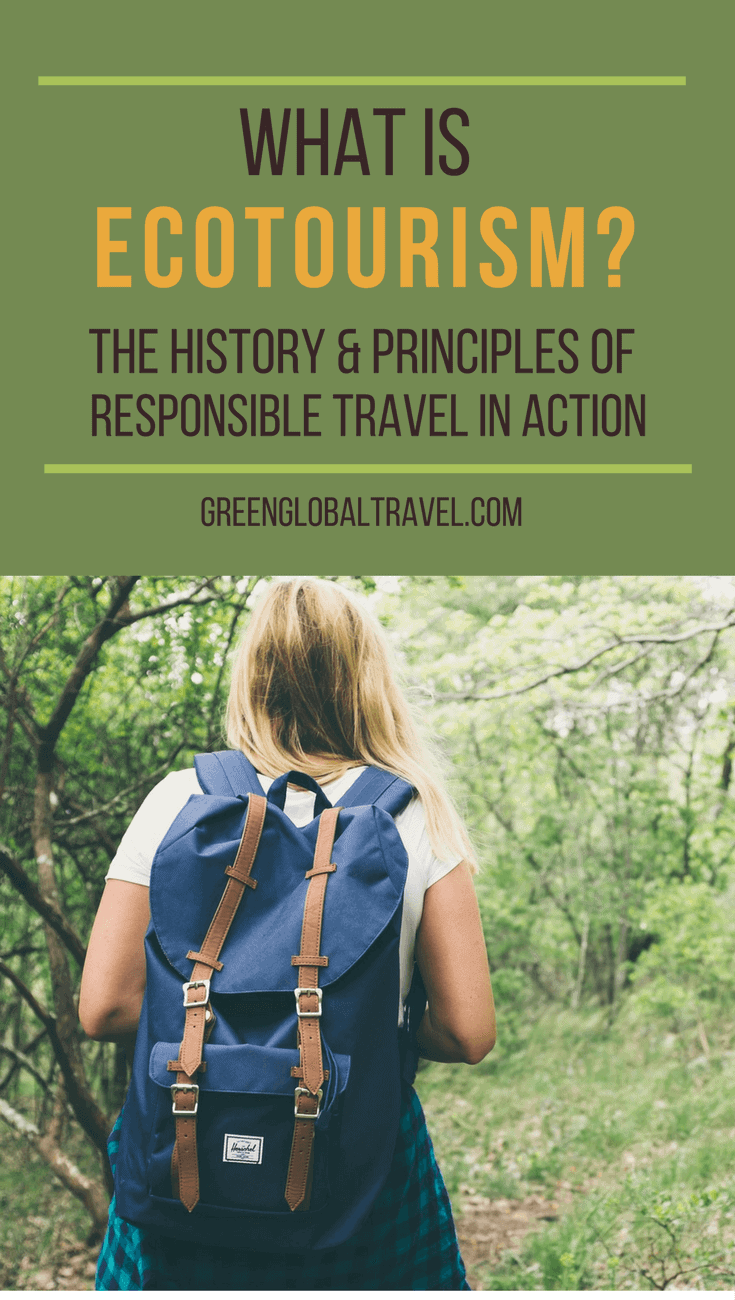
- The Definition of Ecotourism
- A Brief History of Ecotourism
- Ecotourism in the ’90s & Beyond
- The Principles of Ecotourism
- Ecotourism Principles in Action
The Benefits of Ecotourism
- Other Articles on Ecotourism

THE DEFINITION OF ECOTOURISM
According to The Oxford English Dictionary , the word “ecotour” was first recorded in 1973, followed by “ecotourism” in 1982.
There, the word is defined as, “Tourism to areas of ecological interest (typically exotic and often threatened natural environments), especially to support conservation efforts and observe wildlife; spec. access to an endangered environment controlled so as to have the least possible adverse effect.”
Ecotourism was perhaps best defined in 1990 by Megan Epler Wood, the co-founder of The International Ecotourism Society (TIES) and author of six influential books on the subject.
Her latest, Sustainable Tourism on a Finite Planet: Environmental, Business and Policy Solutions , was released in 2017.
Now the director of the International Sustainable Tourism Initiative at Harvard, Epler Wood’s original definition was more simple and to the point. She described ecotourism as, “Responsible travel to natural areas that conserves the environment and improves the well-being of local people.”
In simple words, the meaning of ecotourism is travel that makes a positive impact on both the ECO logy and ECO nomy of a given destination.
One mistake many people make is assuming that ecotourism is all about conserving nature and wildlife by any means necessary. But if a destination or business’ tourism development strategy does not actively provide concrete financial benefits for the indigenous people, it’s not truly ecotourism.
Other NGOs, such as The Center for Responsible Travel (CREST, whose co-founder Dr. Martha Honey also served as the Executive Director of TIES for four years), have since expanded on Epler Wood’s concept to provide more in-depth definitions of ecotourism.
CREST currently defines ecotourism as, “Responsible travel to natural areas that conserves the environment, socially and economically sustains the well-being of local people, and creates knowledge and understanding through interpretation and education of all involved (including staff, travelers, and community residents).”
Other responsible travel organizations may have their own take on what ecotourism is, but these three are the most significant definitions.
READ MORE: Megan Epler Wood on the Evolution of Ecotourism
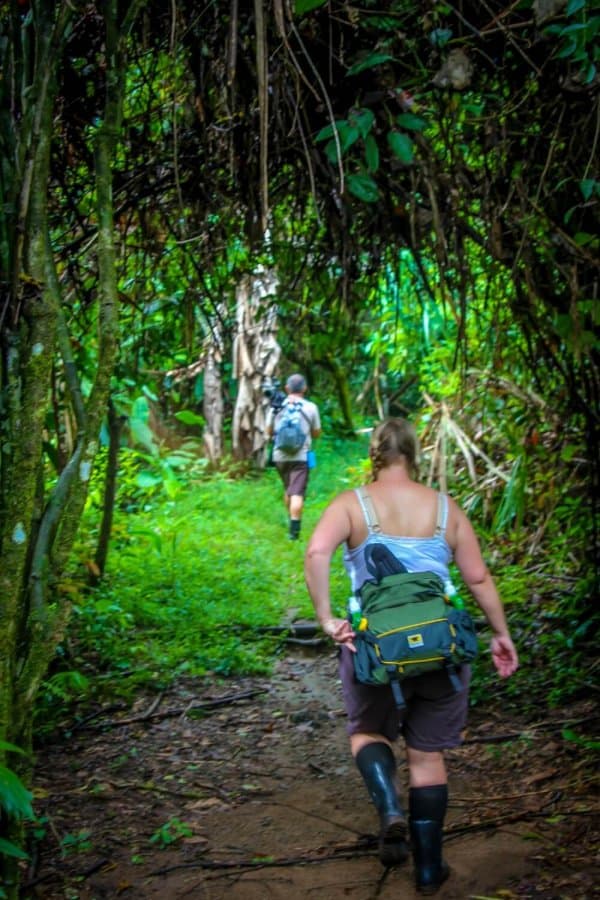
A BRIEF HISTORY OF ECOTOURISM
Ecotourism’s earliest origins arguably began with the Sierra Club’s Outing program. Launched in 1901, these annual expeditions took hikers into the Sierra Nevada’s backcountry in order to show members natural wonders, “so that those persons could become active workers for the preservation of the forests.”
The modern movement began to take root in the environmental activism of the 1970s. Some sources suggest that the term ecotourism was originally coined by Mexican architect-turned-environmentalist Héctor Ceballos-Lascuráin . He used the word to describe traveling to undisturbed areas in order to enjoy their natural beauty and culture.
In 1981 Ceballos-Lascuráin became the founding president of the Mexican Association for the Conservation of Nature, the most influential Mexican NGO in the conservation arena. In 1984 he founded the first Mexican ecotourism agency, ECOTOURS.
His 315-page book on Tourism, Ecotourism, and Protected Areas was published in 1996 by the International Union for the Conservation of Nature (IUCN). He served for many years as an Ecotourism Advisor to both the IUCN and United Nations World Tourism Organization.
Megan Epler Wood was another one of the ecotourism movement’s earliest adopters. She was a young wildlife biologist hired by World Wildlife Fund founder (and former EPA director) Russell Train right out of grad school in the early ’80s.
Their all-star team at the time also included Russell Mittermeier (now President of Conservation International) and Thomas Lovejoy , who’s known as the “godfather of biodiversity.”
“In the 1980s the idea of sustainable development was new,” Epler Wood recalls. “There was a big conversation about finding ways to benefit local people who wanted to conserve natural areas. A few years later my husband and I lived in Colombia on a joint Fulbright scholarship. [We realized that] people visiting the rainforest were bringing a majority of the benefits those locals were seeing.
READ MORE: Top Ecotourism Destinations According to Experts

ECOTOURISM IN THE ’90s & BEYOND
After she returned home in 1988, Epler Wood went on to produce The Environmental Tourist for PBS. She started pitching conservation NGOs a documentary on ecotourism that would be “the very first global investigation of how tourism could contribute to conservation of natural resources and local well-being.”
When that project lost its funding, she tapped into her contacts and started The International Ecotourism Society. The organization’s goal was to contribute to the development of ecotourism as a viable tool for conservation, protection of bio-cultural diversity, and sustainable community development.
Epler Wood left TIES in 2002 to start her own consulting firm. She was replaced by Dr. Martha Honey, the veteran journalist/historian who wrote the seminal book, Ecotourism and Sustainable Development: Who Owns Paradise? in 1999. She was Executive Director of the organization from 2003 to 2006, and eventually founded the Center for Responsible Travel in Washington, DC.
I had the pleasure of interviewing Dr. Honey during a keynote presentation at the TBEX Travel Blogging Conference in Cancun, Mexico in 2014. When I asked about the changes she’s seen in the ecotourism industry over the past 20 years, Dr. Honey insisted that they were positive for the most part.
“It hasn’t lost or changed its core values, which are essentially that tourism should be done in a way that’s beneficial to environmental conservation and local communities and respectful of local cultures…The Slow Food movement, organic agriculture, travel philanthropy, concern about human trafficking and child sexual abuse, fair trade , carbon offsets, and animal welfare are all branches on the original tree.
There have been countless other ecotourism icons over the past 30 years, from Jonathan Tourtellot (NatGeo’s Destination Stewardship Center) and Jeff Greenwald (founder of Ethical Traveler) to eco-design authority Hitesh Meta.
Now ecotourism is considered one of the fastest-growing sectors in the travel industry (about 5% annually), accounting for around 6% of the world’s gross domestic product. Even as the market for traditional tourism grew stagnant, the UNWTO’s global forecast projected rapid growth in the ecotourism industry over the next decade.
READ MORE: Q&A With Dr. Martha Honey on Ecotourism
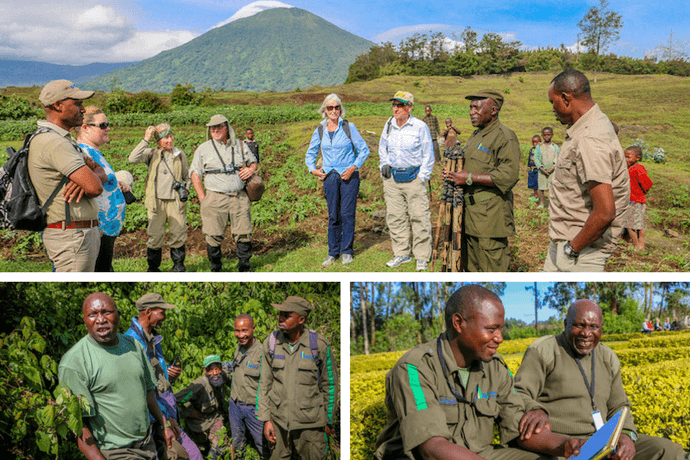
THE PRINCIPLES OF ECOTOURISM
Ecotourism is essentially all about bringing nature/wildlife conservationists, local communities, and the responsible travel industry together to ensure development focused on long-term sustainability rather than short-term profits.
The goal is to develop tourist accommodations, activities, and attractions that benefit everyone involved– the local flora/fauna, the local people, travel industry stakeholders, and travelers alike.
With this mission in mind, the ecotourism industry has collectively developed a number of core guiding principles over the past few decades. Although international regulation and accreditation have remained elusive, these guidelines provide a general blueprint for responsible tourism development.
Many of these principles align with those of the Global Sustainable Tourism Council , which developed an extensive list of criteria for sustainable destinations, hotels, and tour operators.
1. Build Environmental & Cultural Awareness
Education is a key aspect of ecotourism initiatives, for locals and visitors alike. Most of these efforts are focused on improving awareness, sensitizing people to environmental issues, and encouraging them to be conscious of their impact on the places they visit.
Some tour operators create conservation education programs for local schools. Many offer interpretative guides, naturalists, and guest lecturers to help deepen travelers’ understanding of their experiences.
Immersive interactions with local cultures are also becoming increasingly common. These experiences often emphasize interaction rather than a typical performer-audience relationship with visitors.
2. Design & Operate Low-Impact Eco Tours/Facilities
Remember the old environmental adage, “Take only pictures, leave only footprints”? Today’s ecotourism industry strives to take it one step further.
The focus is all about sustainability, minimizing the negative carbon footprint travel often leaves on the environment. But these days the big picture goal is to create positive, rather than merely neutral impact.
From using alternative energy sources and ensuring all building materials are locally sourced to limiting eco tour group sizes, conscious consideration should be made to ensure low impact at every stage, from development to implementation.
3. Provide Financial Benefits for Conservation
The idea of using the revenue generated by ecotourism to help fund the conservation of nature and wildlife is not a new idea. In fact, it dates back more than 100 years, to the creation of the US National Parks Service .
Referred to by documentarian Ken Burns as “America’s Best Idea,” this concept has since been applied to more than 6,000 national parks in nearly 100 different countries around the world.
When managed properly, ecotourism can help provide a revenue-generating alternative to urbanization, deforestation, unsustainable agriculture, and poaching. And though critics claim ecotourism often fails to deliver on its promise, recent scientific studies continue to illustrate its conservation benefits.
4. Provide Financial Benefits for Local People
Critics have similarly pointed out that some ecotourism initiatives have created more problems for local people than they solve. Poorly managed programs can lead to conflicts over land and resources, unfair profit distribution, and cultural exploitation.
This is what happens when the phenomenon known as greenwashing – the disinformation disseminated by an organization so as to present an environmentally responsible public image– rears its ugly head.
True ecotourism MUST provide financial benefits to local people, whether through direct (tours, admission fees, and donations) or indirect means (such as taxes on travel or accommodation). It generally works best when there is smaller scale, slower growth, and greater involvement by local communities in all steps of the tourism development process.
5. Support Human Rights
Ecotourism initiatives should always strive to support human rights, economic empowerment, and democratic movements in a given destination.
In addition to increasing awareness about sociopolitical and environmental issues facing a given destination, ecotourism initiatives should support local businesses and the rights of indigenous inhabitants to control their land and assets.
This principle is arguably the most problematic and contentious. Should tour companies or travelers boycott a given destination due to human rights abuses or unfair treatment of its indigenous population? In many cases, such boycotts don’t punish the powers-that-be nearly as harshly as the locals who rely heavily on tourism revenue to survive.
READ MORE: Why Responsible Travel Matters
ECOTOURISM PRINCIPLES IN ACTION
Becoming a more responsible traveler is the best way to ensure your adventures are positive for the local people and the planet.
Whe n the core principles of ecotourism are applied, it can stimulate financial growth in developing nations, strengthening the global economy.
Individually, one person taking these baby steps to going green might not seem to make much of an impact. But if we all take simple strides towards being more conscious of our choices, collectively we can m ake a world of difference. Here’s how!
Lightening up your load saves money on baggage fees and increases plane fuel-efficiency.
Pack items that can be washed in the sink and are quick drying so they can be worn multiple times during your trip.
We recommend (but do not receive compensation from) the ExOfficio brand, and wear it everywhere we travel.
Take shorter showers, turn off the faucet while shaving and brushing your teeth, and re-use towels for multiple days.
And NEVER use the hotel laundry, as they typically wash each guest’s clothes separately, even if there are only a few items.
READ MORE: The Best Travel Clothing For 7 Travel Styles (An Epic Guide)

SAVE ENERGY
When you leave your hotel room, turn off the lights, heat/AC and TV.
Consider leaving the “Do Not Disturb” sign on the door so that the housekeeping staff won’t clean your room every day.
This will save on harsh chemical cleaning supplies and the electricity of vacuuming and washing bed linens.
REDUCE/REUSE/RECYCLE
Take a BPA-free water bottle you can refill, use just one bar of soap for both sink and shower.
Return brochures and maps once you’re finished using them, and hold on to your trash until you find a place to recycle it.
Seek out indigenous artisans and learn about their craft.
When we were in the Riviera Maya near Coba, we saw tons of assembly line art.
But instead we wound up buying from a man who taught local children and tourists the ancient craft of Mayan pottery and distributed profits equally among families in his village.
READ MORE: What Is An Eco Lodge? A Guide to Eco-Friendly Accommodations

LEAVE ONLY FOOTPRINTS
Stick to marked trails to avoid harming native flora, and consider taking a bag to pick up trash along your journey.
Not only is it a great way to help keep the outdoors beautiful, but it also protects wildlife that might eat or get tangled in the garbage.
BE A TRAVELER, NOT A TOURIST
Take time to immerse yourself in the local music, art and cuisine. Embrace the cultural differences that make it unique.
Get to know the locals and how they view life. You might be surprised at the things you learn when you open your mind to new ideas!
HONOR LOCAL TRADITIONS
Some cultures have very different traditions from yours.
Women are forbidden to show skin in some Muslim countries. For some, being photographed in like having your soul stolen.
Understand and respect these traditions, or risk offending the people whose culture you’re there to experience.
READ MORE: Embracing the Culture of the Maasai People of Tanzania

Developing nations are badly in need of basic necessities most people take for granted.
Traveling gives you a unique experience that stays with you for the rest of your life.
In return, consider giving something back, such as bringing school supplies on tours in which you know you’ll interact with locals.
SHOP SMARTER
Read labels, and ask questions like “What is this item made from?”
All over the planet people sell items made from non-sustainable hardwoods, endangered species, and ancient artifacts.
It may be alright in their country to sell them, but you can still vote with your wallet by refusing to buy them.
READ MORE: The Problem with Animal Selfies
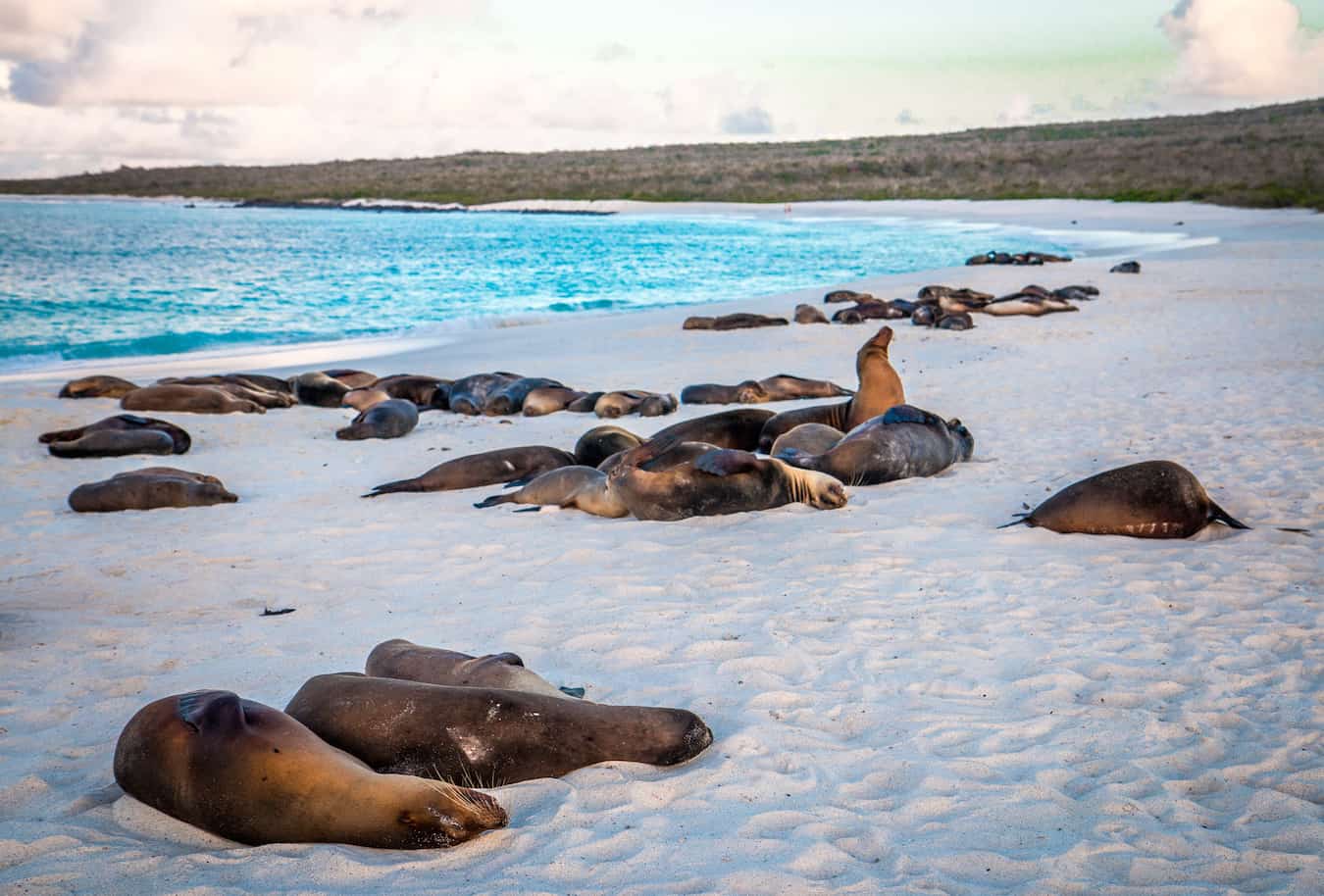
THE BENEFITS OF ECOTOURISM
To quote CREST founder Dr. Martha Honey during our Keynote session at TBEX Cancun in 2014, we earnestly believe that ecotourism is “ simply a better way to travel . ” Here’s a look at how this transformational approach to travel benefits conservation, increases cross-cultural understanding, and ultimately turns travelers into environmental advocates:
Benefits to Wildlife
To see how ecotourism benefits nature and wildlife, let’s look at endangered species such as African Elephants . Ivory from Elephant tusks is worth $1500 a pound on the black market, which has led to a dramatic increase in poaching.
But Elephants are worth 76 times more alive than dead . When you consider the revenue from wildlife photography tours , luxury safari camps, and other ecotourism offerings, a single Elephant is worth $1.3 million over the course of its lifetime!
Other heavily poached species, such as Lions and Rhinos , have shown to be similarly valuable alive. Ecotourism offers a long-term alternative to exploitation, generating sustainable revenue and ensuring better overall health of the ecosystem.
Benefits to the Environment
Nature reserves and national parks help prevent deforestation and pollution, while also protecting the habitat of endemic species.
The revenue that ecotourism provides can help replace profits from exploitative practices such as mining or slash ‘n’ burn agriculture. It can also help ensure the long-term financial viability of the area.
Naturalist guides also help travelers understand the value of a pristine ecosystem, and teach them about the importance of conservation. This ultimately help to create a more mindful and conscious legion of travelers.
Benefits to Local People
When managed properly, ecotourism can offer locals alternative revenue streams. In wildlife-rich countries such as Rwanda , former poachers are often employed as guides or trackers, capitalizing on their knowledge of the animals and their habitat.
In Costa Rica , unemployment has fallen to less than 10% since the country started building its ecotourism infrastructure in the 1970s. The country now enjoys the highest standard of living in Central America .
Involving local communities in tourism management empowers them by ensuring that more revenue is reinvested locally. Ecotourism also offers indigenous peoples an opportunity to remain on ancestral land, conserve it, and preserve traditional culture.
Benefits to Travelers
In the words of United Nations Secretary General Talib Rifai, the Year of Sustainable Tourism provided “a unique opportunity to advance the contribution of the tourism sector to the three pillars of sustainability– economic, social and environmental– while raising awareness of the true dimensions of a sector which is often undervalued.”
Sure, being a responsible traveler takes a greater level of commitment to being conscious and mindful of the impact we have on the destinations we visit. But ecotourism also offers us incredible, transformative experiences, allowing us to develop closer personal relationships to the nature, wildlife, and local people we encounter during our adventures.
Learning about ecotourism during my life-changing experience in South Africa in 2000 permanently changed my understanding of mankind’s role in our planetary ecosystem. And I firmly believe that, once you’ve had that sort of travel experience, you’ll never want to travel the traditional way again. –Bret Love; photos by Bret Love & Mary Gabbett unless otherwise noted

OTHER ARTICLES ON ECOTOURISM
How Mass Tourism is Destroying Destinations Travelers Love
Why Responsible Tourism is Better
7 Harmful Practices Tourists Should Never Support
Why Slow Travel is Better
Why Community Based Tourism is Vital to Responsible Travel
What Is An Eco Lodge? A Guide to Eco-Friendly Accommodations
What Is Glamping? An Intro to Luxury Camping
10 Steps to Becoming a More Responsible Traveler
Green Travel Tips: The Ultimate Guide to Sustainable Travel
How to Choose a Green Hotel
How to Choose a Responsible Scuba Diving Tour Operator
How to Eat Ethically When You Travel
Top 10 Latin American Ecotourism Adventures
Top 10 Off the Beaten Path Ecotourism Destinations
Ecotourism in Costa Rica
Ecotourism in Jordan
Ecotourism in Antarctica
Ecotourism in Australia
Ecotourism in Cancun
Ecotourism in Egypt
Ecotourism in Ireland
Ecotourism in Jamaica
Ecotourism in New Zealand
Ecotourism in Northern Italy
Ecotourism in Sabah, Borneo
Ecotourism in Spain
Ecotourism in Taipei
Ecotourism in Tonga
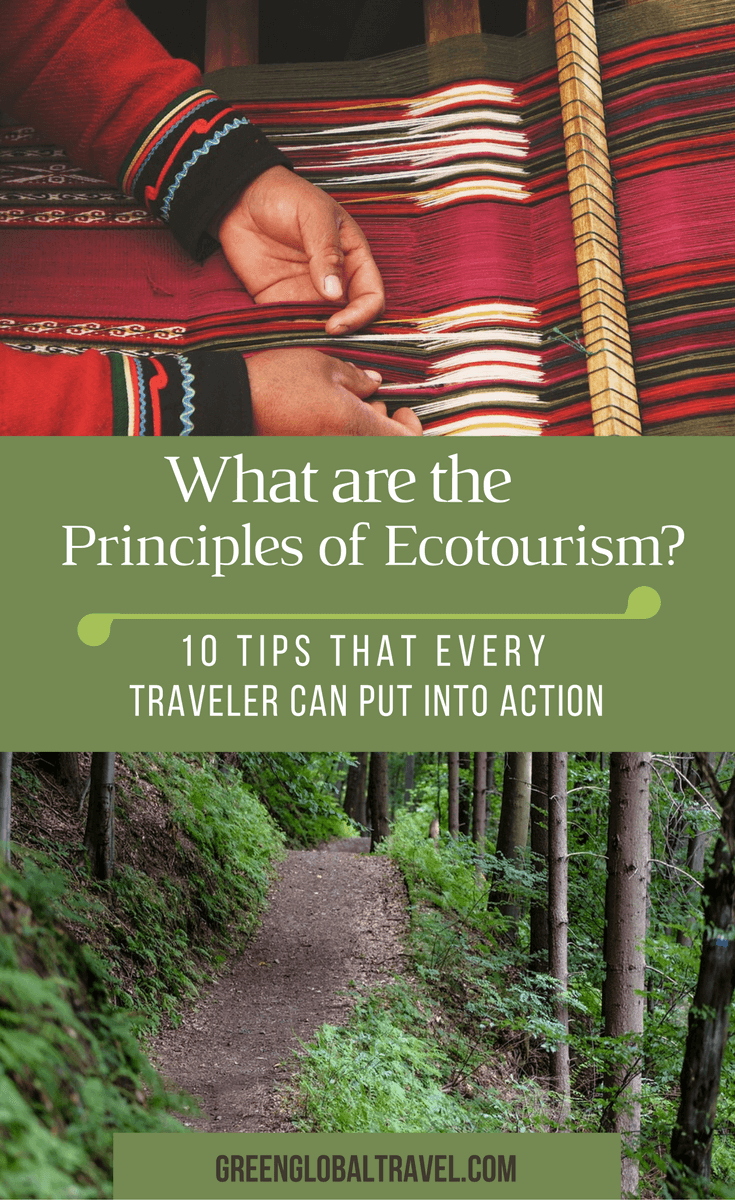
About the Author
Green Global Travel is the world's #1 independently owned ecotourism website encouraging others to embrace sustainable travel, wildlife conservation, cultural preservation, and going green tips for more sustainable living.
We've been spotlighted in major media outlets such as the BBC, Chicago Tribune, Forbes, The Guardian, Lonely Planet, National Geographic, Travel Channel, Washington Post and others.
Owned by Bret Love (a veteran journalist/photographer) and Mary Gabbett (business manager/videographer), USA Today named us one of the world's Top 5 Travel Blogging Couples. We were also featured in the 2017 National Geographic book, Ultimate Journeys for Two, for which we contributed a chapter on our adventures in Rwanda. Other awards we've won include Best Feature from both the Caribbean Tourism Organization and the Magazine Association of the Southeast.
As Seen On…

Join the 300,000+ people who follow Green Global Travel’s Blog and Social Media
UN Tourism | Bringing the world closer
Biodiversity.
- ECOTOURISM AND PROTECTED AREAS
share this content
- Share this article on facebook
- Share this article on twitter
- Share this article on linkedin
Ecotourism and Protected areas
According to the UN Tourism's definition, ecotourism refers to forms of tourism which have the following characteristics:
- All nature-based forms of tourism in which the main motivation of the tourists is the observation and appreciation of nature as well as the traditional cultures prevailing in natural areas.
- It contains educational and interpretation features.
- It is generally, but not exclusively organised by specialised tour operators for small groups. Service provider partners at the destinations tend to be small, locally owned businesses.
- It minimises negative impacts upon the natural and socio-cultural environment.
- Generating economic benefits for host communities, organisations and authorities managing natural areas with conservation purposes;
- Providing alternative employment and income opportunities for local communities;
- Increasing awareness towards the conservation of natural and cultural assets, both among locals and tourists.
Source: The British Ecotourism Market, UNWTO 2002
UN Tourism has been involved in the field of ecotourism since the early 1990s and developed a set of guidelines focusing on the strong link between protected area and tourism, with the aim of ensuring that tourism contributes to the purposes of protected areas and does not undermine them.
In the framework of the UN-declared International Year of Ecotourism (IYE) 2002, UN Tourism undertook a wide range of activities, including the organization of regional conferences and the World Ecotourism Summit , and published guidelines and methodologies for ecotourism development and market studies, as well as supported regional and national activities.
At the request of the United Nations General Assembly, the UN Tourism prepared a report on the activities undertaken by States and major international organizations in the framework of the International Year of Ecotourism . Also UN Tourism prepared a series of market reports to increase the knowledge of seven important countries considered “Ecotourism generating markets”.

- Travel Updates
A Complete Guide To Understanding Ecotourism
Terms like ecotourism, green tourism, and sustainable tourism have been popping up in discussions easily, and unfortunately, they are being used interchangeably. Here, we will take a look at what is ecotourism and what are the principles of ecotourism.

Over the years, ecotourism has been gaining a lot of importance, especially considering that more and more travellers are looking to be more responsible and follow environment-friendly practices. However, many are still not clear about exactly what is ecotourism or the principles of ecotourism. There is a misconception that ecotourism, green tourism, and sustainable tourism are the same thing, and while they all promote responsible tourism, they all mean different things and have different scopes.
In this article, while trying to give a deeper understanding of what is ecotourism, we will give you information about ecotourism like the meaning of ecotourism, ecotourism tourism definition, and the principles of ecotourism. By the end of this article, we hope you will have a clearer understanding of the term and its evolution.
Also read: What is the difference between eco tourism, green tourism and sustainable tourism?
What Is Ecotourism?
Eco-tourism or ecological tourism has been defined as “responsible travel to natural areas that conserves the environment, sustains the well-being of the local people, and involves interpretation and education” by The International Ecotourism Society (TIES, 2015). To answer the question “What is ecotourism?” in a simpler way, it is a form of tourism that is about going out into the natural world and is more about what you do in a place than where you stay. It is more than just travelling around the whole world and sightseeing.
It is the kind of tourism where fragile and/or pristine natural environments are visited in a way that the impact of the visit is minimised. The environment and local communities should benefit in such a way that the latter is motivated to keep the local environment pristine.
Another way to explain what is ecotourism is to say that it involves travel to places where flora, fauna, and cultural heritage are the main attractions. It supports conservation efforts through the education of tourists, giving them an insight into the human impact on the environment, and helping them gain a better appreciation of natural habitats. It may also benefit the environment through direct investment in conservation efforts.
Also read: 10 simple ways to become a responsible traveller
History Of Ecotourism
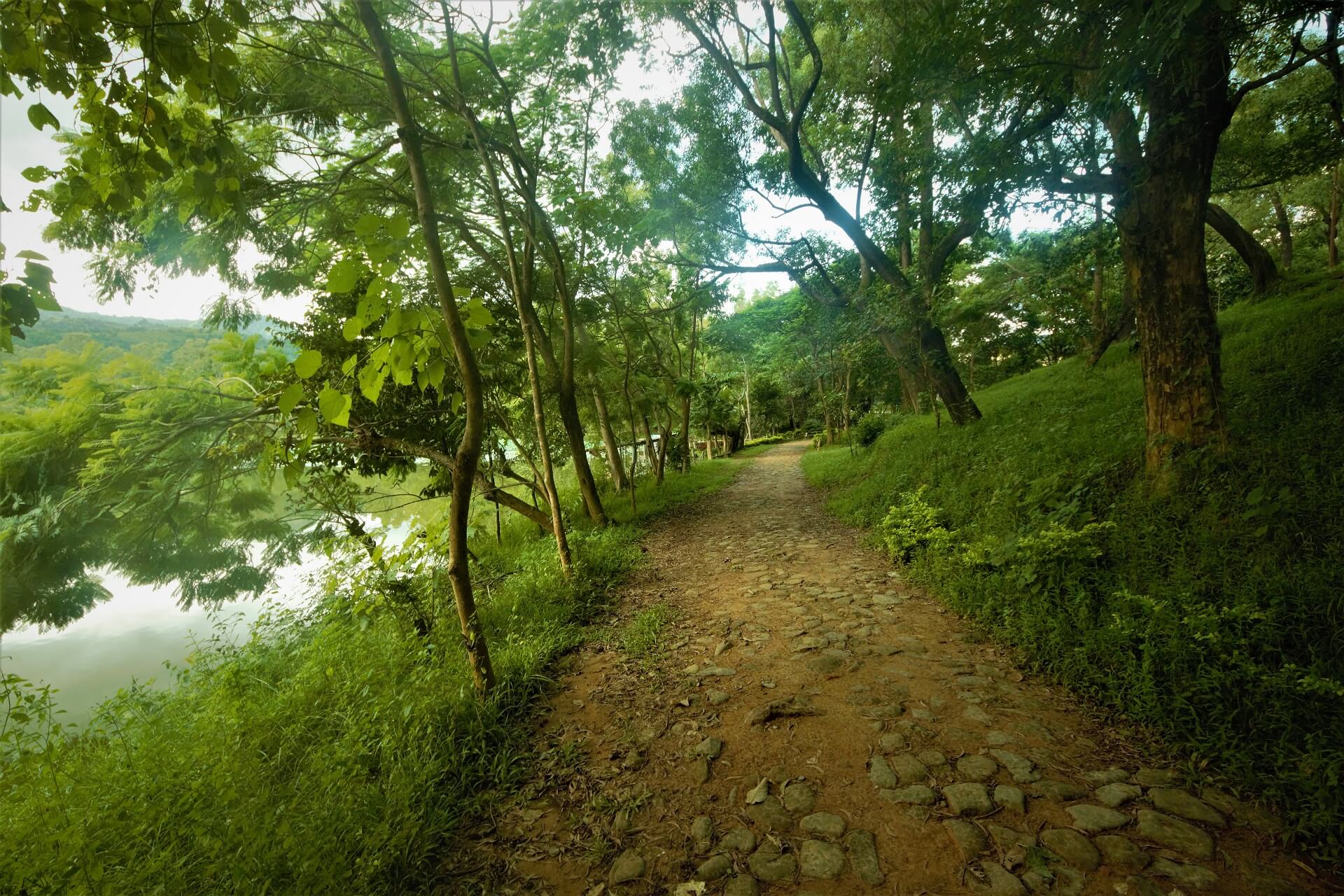
Although the term ecotourism has been gaining popularity in recent years, it is not a new concept. However, there is no clarity as to the origins of the term as there are several different claims as to when it came into use.
Some claim that the term ecotourism was popularised by Hector Ceballos-Lascurian, who also claimed to have coined the term in the year 1983. This is when he was in the dual role of founding president of PRONATURA (an influential Mexican conservationist NGO) and Director General of Standards and Technology of SEDUE (the Mexican Ministry of Urban Development and Ecology). To him, ecotourism meant travelling to undisturbed areas to enjoy the natural beauty and culture. Later, in 1984, he founded ECOTOURS, Mexico’s first ecotourism agency. Ceballos-Lascurian even served as an Ecotourism Advisor to the International Union for the Conservation of Nature and the United Nations World Tourism Organisation for many years.
Some others claim that the term was coined in 1965 by Claus-Dieter (Nick) Hetzer, who was an academic and adventurer from the Forum International, Berkeley, USA. He is also believed to have run the first eco-tours in Yucatán in the early 1970s.
[What is an eco-tour?: Tours that involve visits to scenic or remote natural areas and are designed to minimise negative impacts on the environment and local inhabitants.]
There is another claim that eco tourism originated even earlier, in 1901 in fact, with the Sierra Club’s Outing program. These were annual expeditions that took hikers into the Sierra Nevada’s backcountry, showing them its natural wonders so that they could actively work for the preservation of the forests.
Over the past decades, there have been many icons of ecotourism and now, this form of tourism has been gaining a lot of importance. Ecotourism is considered to be one of the fastest-growing tourism sectors in the industry (about 5 percent annually) and there are no signs of it slowing down, even though more traditional forms of tourism have seen a stagnation.
Principles Of Ecotourism
Now that we have seen what is ecotourism and taken a look at its history, we will go over the principles that guide the ecotourism industry. Ecotourism is essentially about bringing together communities, conservation, and sustainable travel.
Many tour packages are being classified as “eco-tours” even though they do not emphasise conservation, education, or social and cultural participation, and low impact on the places visited. Therefore, to help you understand which tours are actually eco-tours, here are the principles of ecotourism:
1. Building Environmental And Cultural Awareness And Respect

The major focus of ecotourism is to sensitise people towards environmental issues, improve awareness, and encourage people to be conscious of the effect on the places they visit. Following this principle, a few tour operators create educational programs on conservation for local schools. Interpretive guides, naturalists, and guest lecturers are also offered by other operators to help visitors get a deeper understanding of their experiences. Some operators also offer immersive interactions with local cultures (that are becoming more common) that emphasise proper interactions instead of a usual performer-audience relationship.
2. Minimize Physical, Social, Behavioural, And Psychological Impacts By Operating Low-Impact Eco Tours

The ecotourism industry’s focus is sustainability, and minimising the negative impact that conventional tourism leaves on the environment. Over time, however, the concept has evolved to include making a positive impact, rather than merely having a neutral impact on the environment and the locals. Maintaining small groups and avoiding under-managed or over-visited destinations is a good way to minimise the impact of the group on the areas visited.
3. Provide Direct Financial Benefits For Conservation

One of the main objectives of ecotourism is to help local conservation efforts by inviting financial benefits. Visiting national parks is one way for tourists to contribute towards the conservation of nature and wildlife. When ecotourism gains more importance and practitioners, more revenue generation opportunities are created that are environmentally better alternatives to urbanisation, deforestation, unsustainable agriculture, and poaching.
Also read: How to be a more responsible wildlife tourist
4. Generate Financial Benefits For Locals And Private Industry

Another important principle of ecotourism is the generation of financial benefits for local communities. Through direct or indirect means, locals must get the financial benefits of eco-tourism. This could be through tours, admission fees, donations, and taxes on travel and accommodation. Community tours are a good way to generate financial benefits for local communities.
5. Deliver Memorable Interpretative Experiences For The Visitors

Although ecotourism is geared towards reducing a negative impact on the environment and the local communities and generating a positive impact on the same, it doesn’t mean that the tours have to be all about work. Any tour (conventional or not) should be designed in such a way that visitors should enjoy their trip. If the eco-tours are tough and/or too boring, there is a fair chance that many may start losing interest in more responsible tour packages, thereby having a negative impact on the communities that depend on these tours.
6. Recognise The Rights And Spiritual Beliefs Of The Indigenous People And Work With Them

Tourists who are part of eco-tours are encouraged to respect the rights and spiritual beliefs of the locals/indigenous population of the destinations instead of just getting in their faces and taking their photos without their permission. Like any other individual, the local communities value their privacy and it would always be better to first interact and have meaningful conversations with them and, only once permission is received, take a picture of them.
Beware Of Greenwashing!
While you are in safe waters when you practice ecotourism, sustainable tourism, or responsible (all of which are eco-friendly), you must always be careful of tour operators and tourism companies that only pretend to be eco-friendly in order to attract more business, a practice widely known as greenwashing. A good way to make sure that the company or tour operator to whom you are giving your business is legitimately eco-friendly, you will have to do a bit of digging and gathering of all the facts. Once you are convinced that the company is legitimate, go ahead and book your eco-tour and contribute to a better and happier world.
LEAVE A REPLY Cancel reply
Save my name, email, and website in this browser for the next time I comment.
Unveiling the wonders of culture and tradition!

Are you ready to embark on a journey filled with adventure, culture, tradition, and exciting attractions? Let your explorer's spirit soar and make unforgettable memories as you explore the beauty of our diverse world.
Ecotourism: Definition, Meaning And Examples
- Publié le 28 April 2020
- Mis à jour le 25 March 2024
What is the definition and meaning of ecotourism? In what ways can ecotourism hurt the environment? Why has ecotourism been growing and how is it different from mass tourism and staycation? Let’s take a closer look at these questions.
Ecotourism Official Definition
According to The International Ecotourism Society (TIES) , ecotourism can be defined as “responsible travel to natural areas that conserve the environment, sustains the well-being of the local people, and involves interpretation and education”. Such traveling can be created thanks to an international network of individuals, institutions, and the tourism industry where tourists and tourism professionals are educated on ecological issues.
At the same time, the Australian National Ecotourism defines ecotourism as “ecologically sustainable tourism with a primary focus on experiencing natural areas that fosters environmental and cultural understanding, appreciation and conservation.”
- Related: Traveling Today And Tomorrow: Cities And Countries With More Travelers
Ecotourism: The Principles Behind It
TIES highlights some principles associated with what ecotourism stands for: more than minimizing physical, social, behavioral, and psychological impacts, ecotourism is also about building a culture of environmental respect and protection while providing positive experiences to visitors and hosts. On the host’s side, an ecotourism mindset is one generating value for local people and the industry, and they should help deliver remarkable experiences to visitors while raising their sensitivity to local environmental, political or social issues.
The Benefits and Reasons Why Ecotourism Has Been Growing
Among the reasons that help understand why ecotourism has been growing are:
- It is easier to access remote ecotourism destination nowadays thanks to cheap flights and accessible infrastructures;
- Many people are not happy or feel fulfilled with traditional tourism destinations and activities – so there’s a greater interest in challenging and more educative tourism;
- There is a greater awareness about the need to protect the environment and desire to contribute towards this cause;
- Travelers wish to be perceived as different and eco-friendly;
- Ecotourism may help protect sensitive environment locations and raise awareness on local environmental and social delicate issues;
- It may also generate income opportunities for local people
Why Join the Ecotourism Movement
Joining the ecotourism cause is a way of guaranteeing the tourism industry will continue prospering and providing social and economic benefits to destinations and communities throughout the globe. Ecotourism provides the opportunity for immersion into the natural world in an enjoyable and effective manner, resulting in greater compassion and better stewardship of the world’s remaining natural wonders.
The Environmental Dimension of Ecotourism: It Can Also Harm The Environment
Despite the goal of protecting the environment, ecotourism can, even if unintentionally, create environmental harm because :
- Ecotourists often go to (already very) environmentally fragile areas that risk collapse or getting eroded;
- Disturbance of wildlife, the removal of vegetation (for plant collection, for instance) and garbage generation increases due to visitors are also likely consequences of ecotourism;
- Some visits are done in sensitive periods like during breeding or hatching periods;
- There are hidden impacts such as the consumption of fuel for air or road travel;
- There’s the risk of ecotourism turning into mass tourism with a huge impact at different levels besides environmental.
- Off-site impacts such as clearing lands to build infrastructures (roads, hotels) are also relevant;
Ecotourism vs. Conventional (Mass) Tourism: What’s the Difference?
- There is a greater chance of eco-tourists traveling to nature-surrounded sites compared to mass tourists looking for plenty of distractions, cultural sites, and the busy life of large cities;
- Ecotourism usually means travelers make their own travel arrangements, while mass tourism relies on a greater number of travel agents and tour operators;
- With mass tourism, the expectations are that there are many different services involved, while in ecotourism site there are only a few if any, services involved;
- Ecotourism activities are usually nature-related (such as hiking and exploring trails, birdwatching or reef diving) and, therefore, tend to be more physically demanding whereas typical tourism is more comfortable and less physical;
- Small groups and long-term stays are also common in ecotourism travelers, while mass tourism often relies on large groups staying for short time periods;
Ecotourism and Staycation
Just like ecotourism, “ staycation ” is also a term representing an idea with a reduced ecological impact. Staycation, i.e., vacations spent at home or near home rather than traveling to distant places, have the potential to cause less environmental harm as less fuel (or no fuel at all if we consider electric vehicles) is spent. It also means more money spent at a local or national level and this consumption helps strengthen the economy, supports existing or new jobs and increases local resilience .
- Related: What Is Staycation, The Latest Trend In Sustainable Tourism
[Photo by Marieke Weller on Unsplash ]
An Introduction to Ecotourism
An Overview of Ecotourism
- Physical Geography
- Political Geography
- Country Information
- Key Figures & Milestones
- Urban Geography
- M.A., Geography, California State University - East Bay
- B.A., English and Geography, California State University - Sacramento
Ecotourism is broadly defined as low impact travel to endangered and often undisturbed locations. It is different from traditional tourism because it allows the traveler to become educated about the areas — both in terms of the physical landscape and cultural characteristics, and often provides funds for conservation and benefits the economic development of places that are frequently impoverished.
When Did Ecotourism Start?
Ecotourism and other forms of sustainable travel have their origins with the environmental movement of the 1970s. Ecotourism itself did not become prevalent as a travel concept until the late 1980s. During that time, increasing environmental awareness and a desire to travel to natural locations as opposed to built up tourist locations made ecotourism desirable.
Since then, several different organizations specializing in ecotourism have developed and many different people have become experts on it. Martha D. Honey, PhD , a co-founder of the Center for Responsible Tourism, for example, is just one of many ecotourism experts.
Principles of Ecotourism
Due to the growing popularity of environmentally-related and adventure travel, various types of trips are now being classified as ecotourism. Most of these are not truly ecotourism, however, because they do not emphasize conservation, education, low impact travel, and social and cultural participation in the locations being visited.
Therefore, to be considered ecotourism, a trip must meet the following principles set forth by the International Ecotourism Society :
- Minimize the impact of visiting the location (i.e.- the use of roads)
- Build respect and awareness for the environment and cultural practices
- Ensure that the tourism provides positive experiences for both the visitors and the hosts
- Provide direct financial aid for conservation
- Provide financial aid, empowerment and other benefits for local peoples
- Raise the traveler's awareness of the host country's political, environmental and social climate
Examples of Ecotourism
Opportunities for ecotourism exist in many different locations worldwide and its activities can vary as widely.
Madagascar, for instance, is famous for its ecotourist activity as it is a biodiversity hotspot, but also has a high priority for environmental conservation and is committed to reducing poverty. Conservation International says that 80% of the country's animals and 90% of its plants are endemic only to the island. Madagascar's lemurs are just one of many species that people visit the island to see.
Because the island's government is committed to conservation, ecotourism is allowed in small numbers because education and funds from the travel will make it easier in the future. In addition, this tourist revenue also aids in reducing the country's poverty.
Another place where ecotourism is popular is in Indonesia at Komodo National Park . The park is made up of 233 square miles (603 sq km) of land that is spread out over several islands and 469 square miles (1,214 sq km) of water. The area was established as a national park in 1980 and is popular for ecotourism because of its unique and endangered biodiversity. Activities at Komodo National Park vary from whale watching to hiking and accommodations strive to have a low impact on the natural environment.
Finally, ecotourism is also popular in Central and South America. Destinations include Bolivia, Brazil, Ecuador, Venezuela, Guatemala, and Panama. These destinations are just a few where ecotourism is popular but opportunities exist in hundreds of more places worldwide.
Criticisms of Ecotourism
Despite the popularity of ecotourism in the above-mentioned examples, there are several criticisms of ecotourism as well. The first of these is that there is no one definition of the term so it is difficult to know which trips are truly considered ecotourism.
In addition, the terms "nature," "low impact," "bio," and "green" tourism are often interchanged with "ecotourism," and these do not usually meet the principles defined by organizations like the Nature Conservancy or the International Ecotourism Society.
Critics of ecotourism also cite that increased tourism to sensitive areas or ecosystems without proper planning and management can actually harm the ecosystem and its species because the infrastructure needed to sustain tourism such as roads can contribute to environmental degradation.
Ecotourism is also said by critics to have a negative impact on local communities because the arrival of foreign visitors and wealth can shift political and economic conditions and sometimes make the area dependent on tourism as opposed to the domestic economic practices.
Regardless of these criticisms though, ecotourism and tourism, in general, are increasing in popularity all over the globe and tourism plays a large role in many worldwide economies.
Pick a Travel Company That Specializes
In order to keep this tourism as sustainable as possible, however, it is essential that travelers understand what principles make a trip fall into the category of ecotourism and attempt to use travel companies that have been distinguished for their work in ecotourism — one of which is Intrepid Travel, a small company that offers worldwide eco-conscious trips and has won a number of awards for their efforts.
International tourism will no doubt continue to increase in the coming years and as the Earth's resources become more limited and ecosystems suffer more damage, the practices shown by Intrepid and others associated with ecotourism can make future travel a little more sustainable.
- An Overview of the Galapagos Islands
- The Great Barrier Reef
- Countries of Scandinavia
- Geography of Madagascar
- An Overview of the History and Geography of New Zealand
- Geography of Queensland, Australia
- Geography and History of Costa Rica
- Geographic and Historical Facts About London
- Geographic Facts About Oregon
- Geography and History of Kashmir
- Tourism Development in China
- Largest City in Area in the United States
- Geography of the Gulf of Mexico
- Geography of the Gulf of Mexico States
- What Are Geothermal Pools?
- History and Geography of the Florida Keys
- What is Ecotourism?
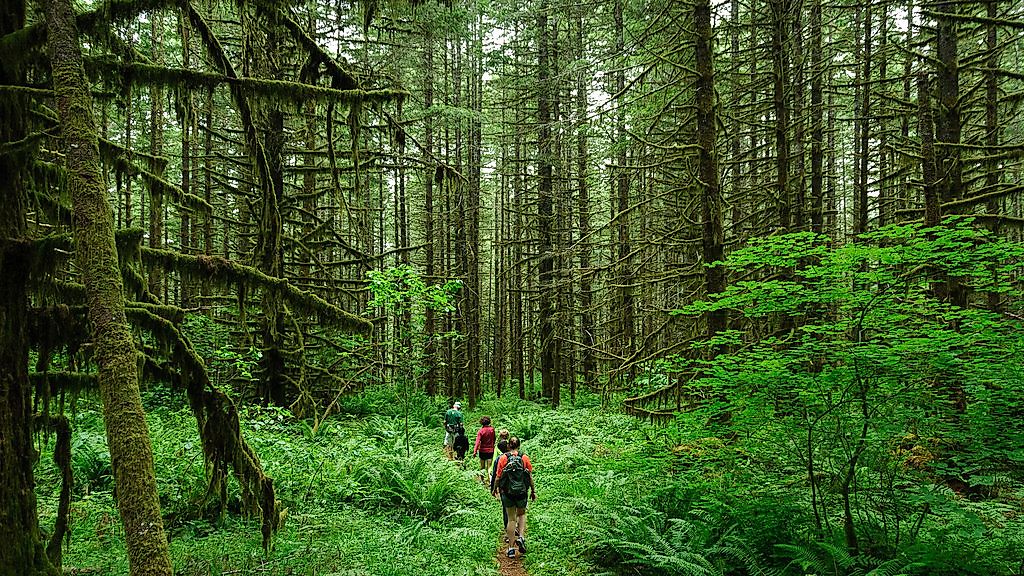
Ecotourism is a type of tourism that involves visiting pristine, fragile, and relatively uninterrupted natural areas, planned as a small scale alternative and low-impact tour as an alternative to standard commercial tourism. Ecotourism promotes conservation, and aims to have a positive socio-economic impact on the local people surrounding the attraction. The primary objective for ecotourism may be to provide finances for the conservation of ecology, to champion for the respect of different cultures, to educate the traveler or to politically empower local communities. Environmentalists have considered ecotourism as a critical endeavor since the 1980s, when the environmental "green" movement was just starting to emerge.
An Overview On Ecotourism
In general, ecotourism handles interaction with living things that shape an ecosystem of the natural environments while focusing on environmental sustainability, personal growth, and socially responsible travel. Typically, ecotourism involves going to places where cultural heritage together with flora and fauna are the main attractions. The primary intention for ecotourism was to provide tourists with insight on the effects of human beings on the environment thus encouraging the appreciation of the existing natural habitats.
The History Of Ecotourism
The term ecotourism traces its history back to the late twentieth century. It is believed that ecotourism was first recorded in 1982 after the word ecotour which was recorded in 1973. While ecotourism refers to tourism in areas that are of ecological interest for purposes of conserving the environment, ecotour refers to a visit to areas that are of ecological interest for purposes of education. However, there are some accounts that the term ecotourism had been used earlier than 1970s. Some say that Claus-Dieter Hetzer, an adventurer and academician from Berkeley, California, was the first person who supposedly came up with the word ecotourism in 1965 and conducted the first ecotours during the early 1970s in the Yucatán.
Benefits Of Ecotourism
An ecotourist is different from a regular tourist in the sense that they are more mindful of their surroundings and they help contribute to the sustainability of natural environments. Ecotourism is beneficial because it promotes water conservation, recycling, and energy efficiency together with the development of economic opportunities for the local communities living in such areas. Other benefits include the potential to spread environmental awareness to the rest of the world, respecting the cultures of different people, protecting the ecosystem and the conservation of both cultural and biological diversities which go hand in hand with supporting democratic movements and human rights.
Ecotourism And Economy
Ecotourism is not only a marginal activity used in the financing of environmental protection but also a significant industry that boosts the national economy of many countries. Ecotourism in countries like Ecuador, Madagascar, Costa Rica, Kenya, Nepal and territories such as Antarctica represent an important sector of the economic activity and gross domestic product (GDP). Due to the confusion of ecotourism and tourism, there have been moves to establish international and national programs for accrediting ecotourism. However, the process of accreditation might be controversial. There have been national ecotourism certification programs established in different countries where ecotourism is popular such as Kenya, Costa Rica, and Australia.
More in Travel
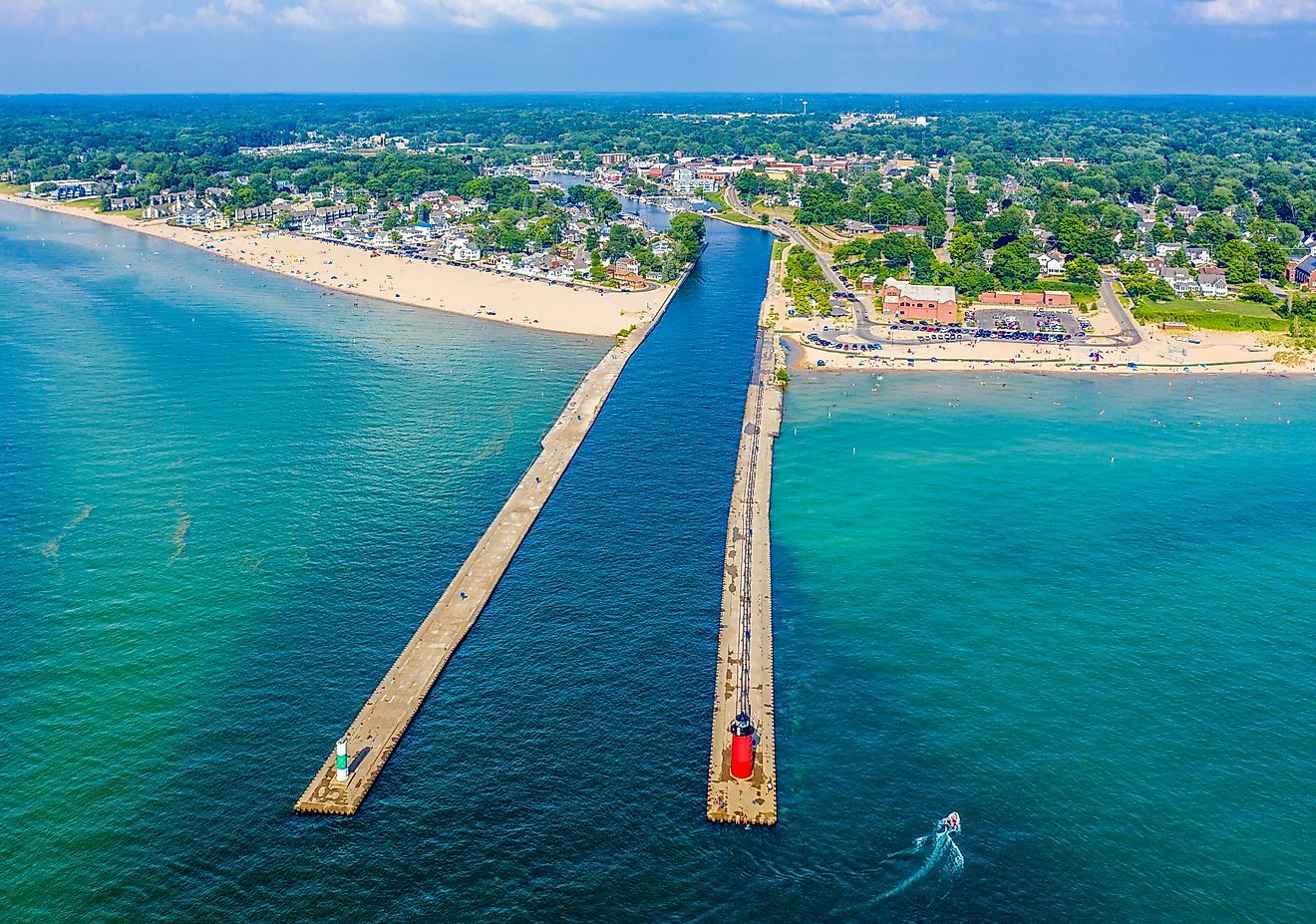
Four Satiating Towns in Southwestern Michigan

The 9 Best Towns Along Lake Michigan

Lambton Shores, Ontario: Exploring Nature and Community
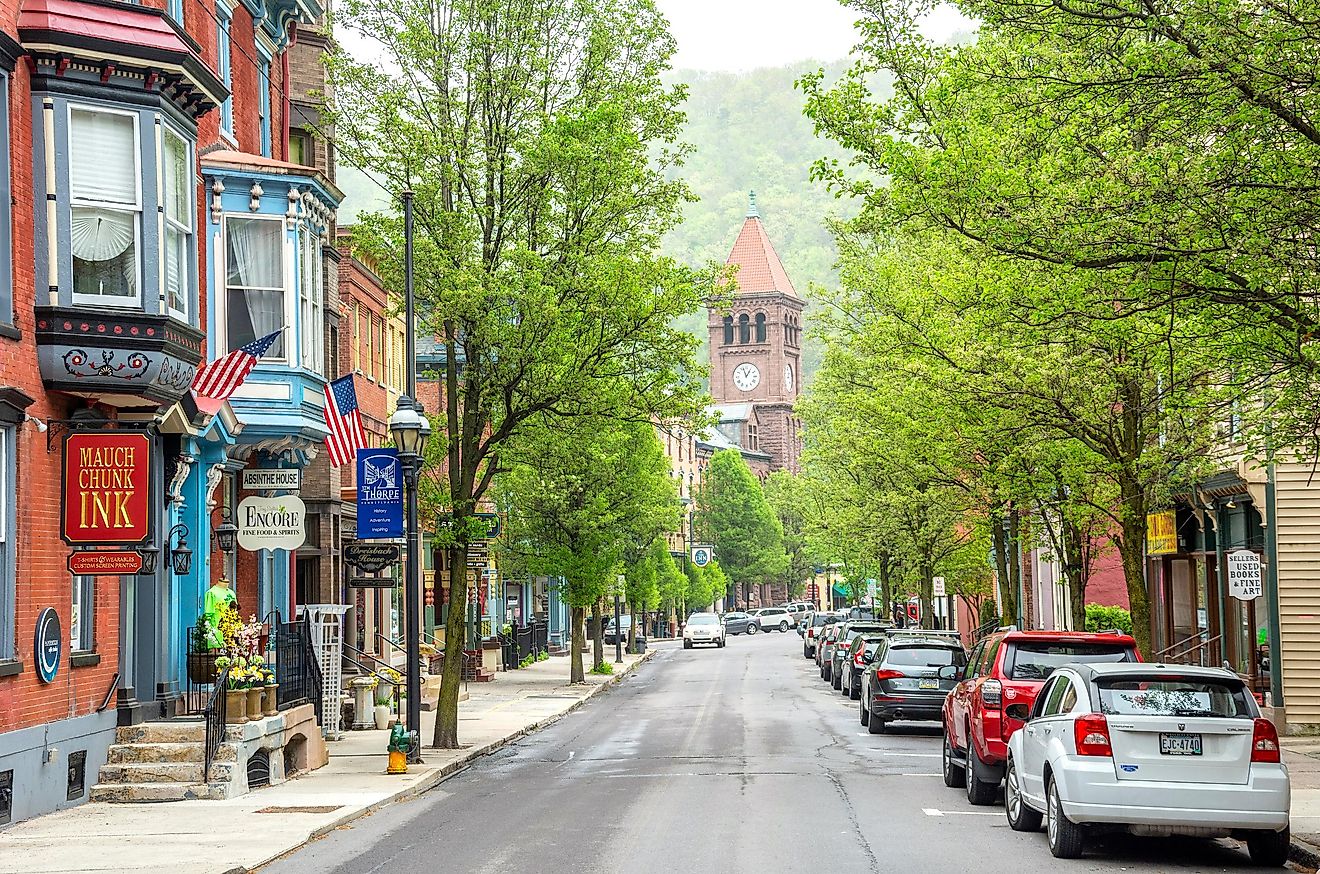
11 Most Underrated Towns In Pennsylvania To Take A Trip To
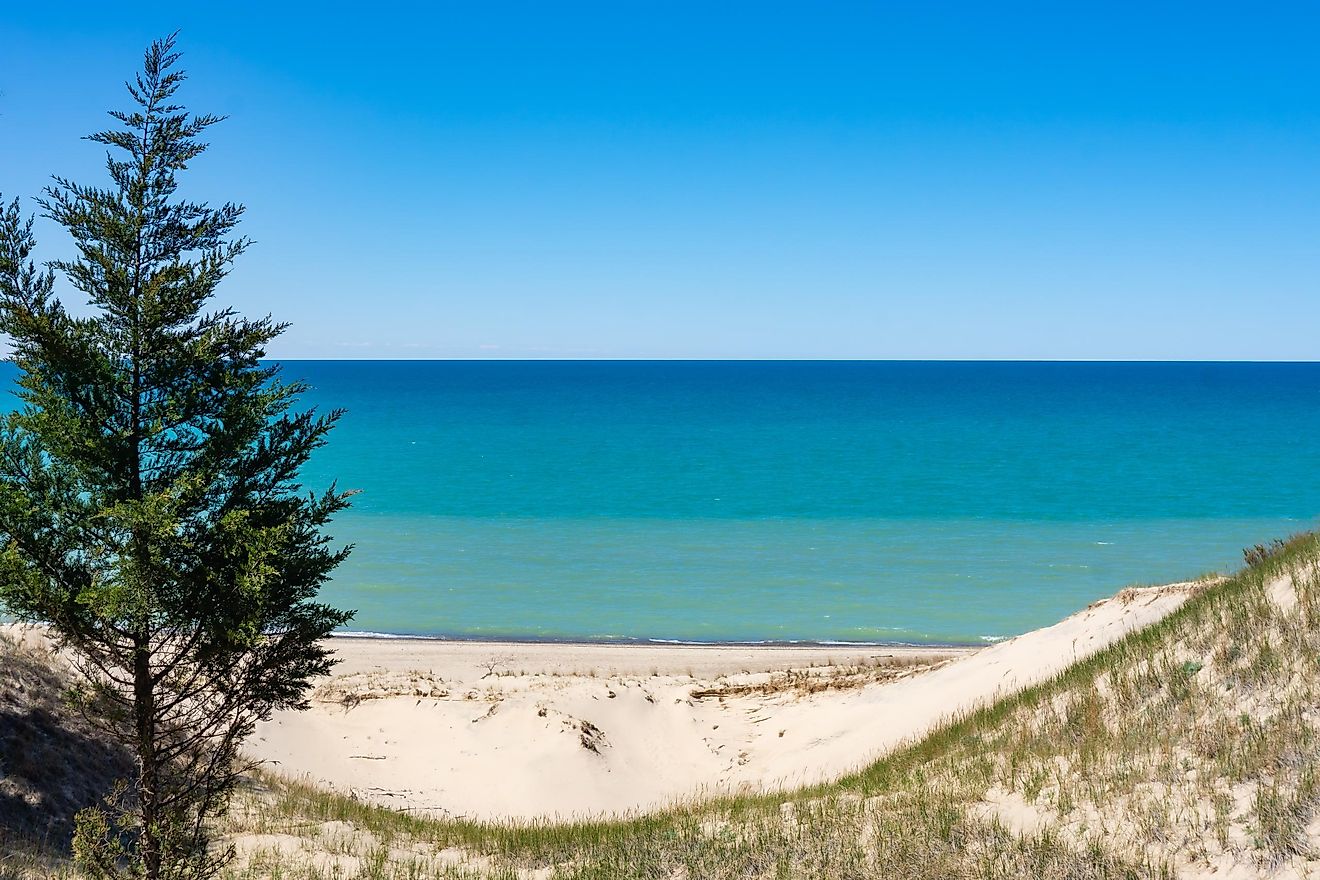
Indiana Dunes vs Warren Dunes: Comparing Two Lake Michigan Parks

13 Most Underrated Towns In New York To Take A Trip To

Tales in Transit: The Twists & Turns of World Travel
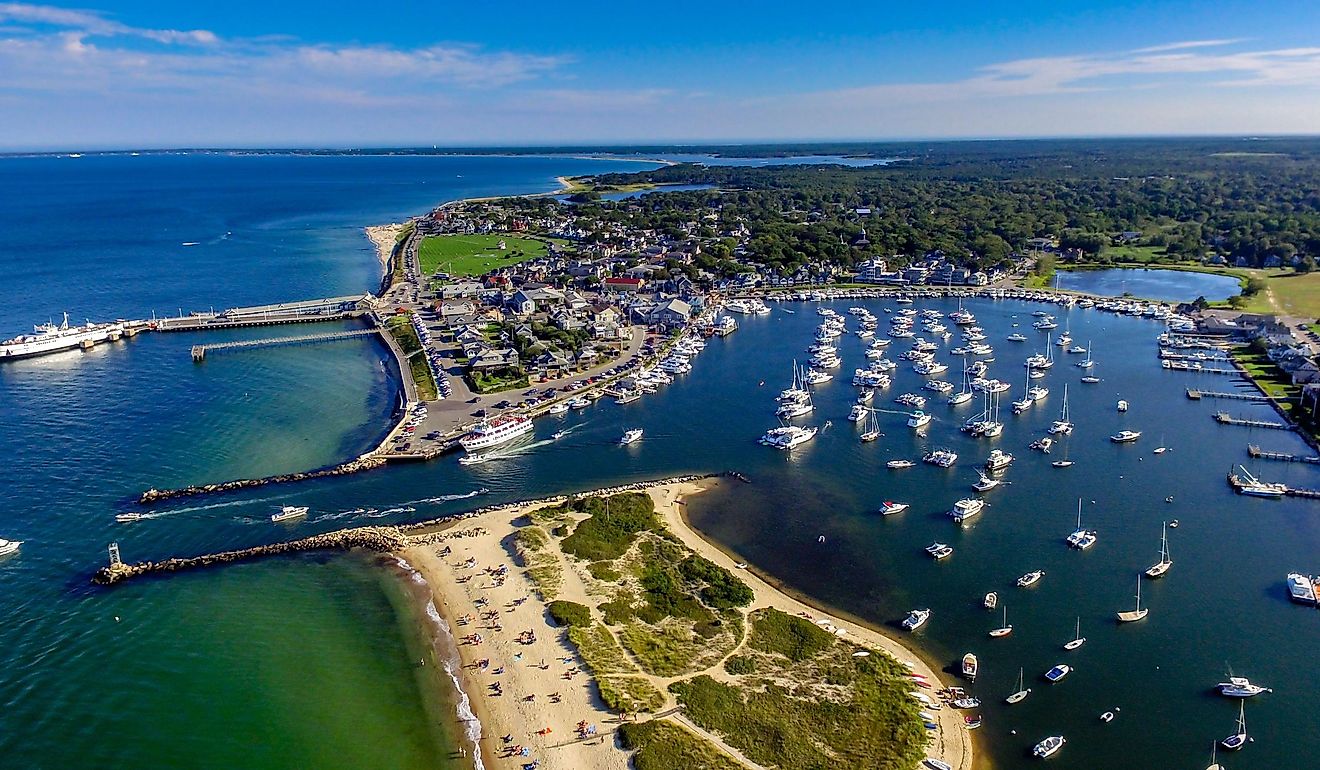
13 Most Underrated Towns In Massachusetts To Take A Trip To

Adventureite.com participates in the Amazon Affiliate Program and we earn a commission on qualifiying purchases. Learn More Here
Ecotourism, What is it and what are its 10 benefits
- Published: February 7, 2023
- Last Updated: December 26, 2023
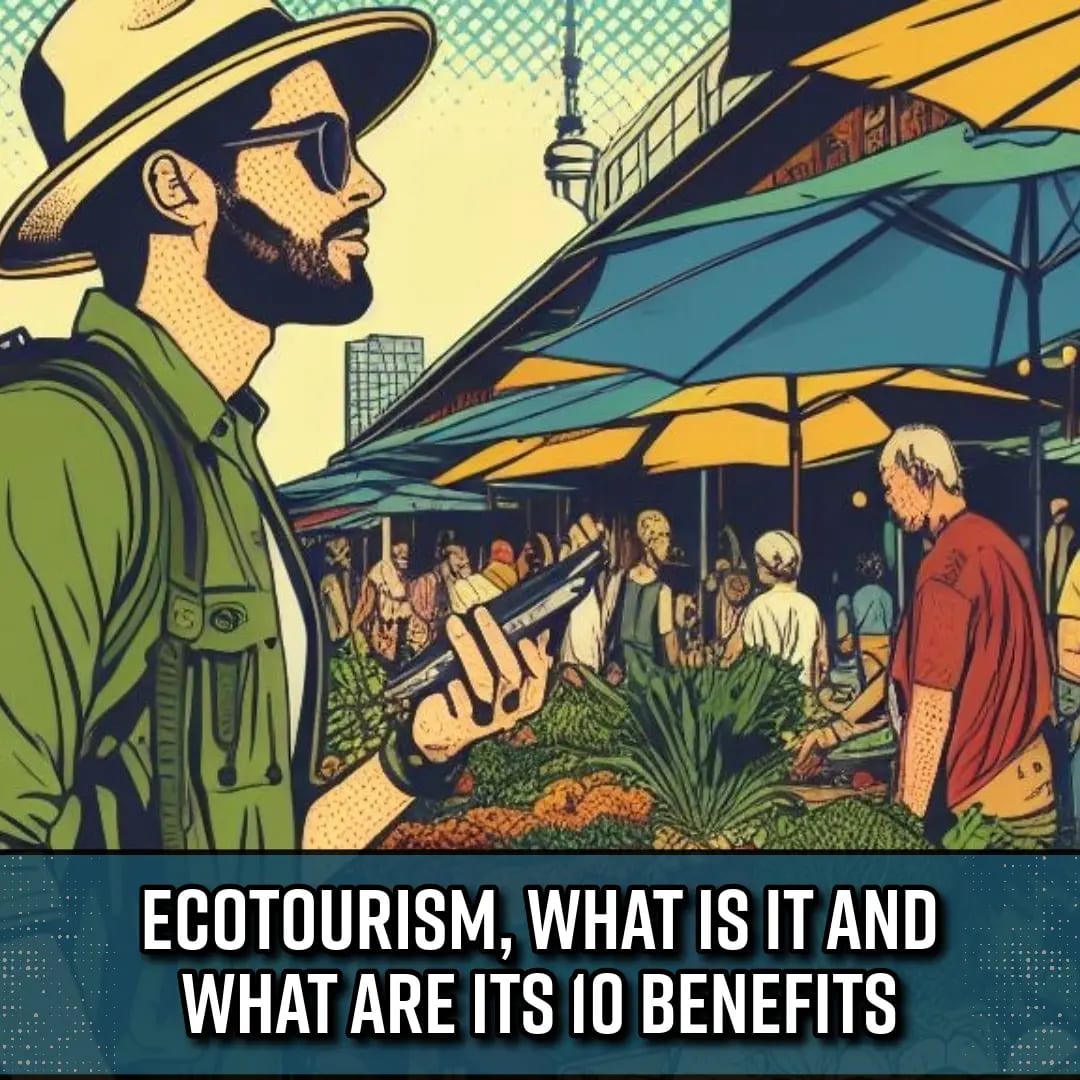
Welcome to our exploration of ecotourism, an incredible form of travel that combines adventure, exploration, and environmental responsibility. Ecotourism, also known as nature-based or conservation-focused travel, is all about enjoying our natural surroundings while ensuring we leave a minimal footprint. It involves visiting amazing locations to support, conserve, and observe flora and fauna in their natural habitats. It has often been defined as “responsible travel to natural areas that conserves the environment and improves the well-being of local people” ( source ).
Many of the conservation ideals of ecotourism are similar to the Leave No Trace philosophy that we have already covered. This method of mixing tourism and conservation isn’t perfect but it is proven to be very effective at allowing people to experience nature while giving back at the same time.

The Ethical Traveler: 100 Ways to Roam the World (Without Ruining It!) Travel can be a blast, but there are hidden costs to your trips that go deeper than your pockets. From potential impacts on the environment or the communities we visit to respecting others’ cultures, taking a moment to consider our choices can make a real impact on the planet and other people.
Key Takeaways
- Ecotourism focuses on minimizing harm to the natural environment.
- It involves visiting exotic and extreme locations to support, conserve, and observe flora and fauna.
- Ecotourism offers sustainable development, boosts local economies, and preserves native cultures and vulnerable species.
- Conservation, community involvement, and education are the core principles of ecotourism.
- Choosing sustainable destinations is crucial for responsible and eco-friendly travel.
7 Principles of Ecotourism
The seven principles of ecotourism were given by Martha Honey in the 1999 book Ecotourism and Sustainable Development .
- Ecotourism should involve travel to natural destinations
- It should minimize impacts on the environment
- Ecotourism should be built on environmental awareness
- Ecotourism should provide direct financial benefits for conservation efforts
- Ecotourism should respect local culture
- It should provide support for human rights and democratic movements
- It should provide direct financial benefits for the local people

The 10 Benefits of Ecotourism
When it comes to ecotourism, the benefits are far-reaching and impactful. By choosing to engage in this form of travel, we can contribute to the preservation of biodiversity, empower local communities, foster cultural exchange, promote environmental education, support conservation efforts, mitigate negative impacts, and experience personal enrichment along the way.
- Promotes Conservation - Ecotourism provides an economic incentive for the preservation of natural resources. By generating income from tourists visiting protected areas, local communities are more likely to value and protect these areas. In turn, this helps to conserve the environment and protect wildlife.
- Supports Local Economies - Ecotourism can provide significant benefits to local economies by generating income through tourism. This income can be used to improve infrastructure and provide employment opportunities, which can lead to a better quality of life for local communities.
- Offers Unique Experiences - Ecotourism provides the opportunity for tourists to experience nature and wildlife in a way that is not possible through traditional forms of tourism. From trekking through tropical forests to observing wildlife in their natural habitats, ecotourism offers a truly unique and unforgettable experience.
- Raises Awareness - Ecotourism helps to raise awareness about environmental issues and the importance of conservation. By visiting protected areas and learning about the environment, tourists become more informed and invested in the conservation of these areas.
- Promotes Sustainable Development - Ecotourism can promote sustainable development by generating income that is reinvested into the local community. This can help to create a self-sustaining cycle of economic growth and conservation, which benefits both the environment and local communities.
- Offers Alternative Livelihoods - In areas where traditional industries, such as logging or mining, are damaging to the environment, ecotourism can provide alternative livelihoods for local communities. By generating income from ecotourism, these communities can shift away from damaging industries and towards more sustainable forms of economic development.
- Improves Livelihoods - Ecotourism can improve the livelihoods of local communities by generating income and providing employment opportunities. This can help to reduce poverty and improve the standard of living for people living in these areas.
- Enhances Cultural Understanding - Ecotourism can enhance cultural understanding by providing opportunities for tourists to interact with local communities and learn about their culture and traditions. This can help to promote cross-cultural understanding and respect, which can have a positive impact on local communities and the environment.
- Minimizes Environmental Impact - Ecotourism is designed to minimize the environmental impact of tourism. By promoting sustainable practices, such as responsible waste management and low-impact transportation, ecotourism helps to protect the environment and conserve natural resources.
- Generates Income for Conservation - Ecotourism generates income that can be used to support conservation efforts. This income can be used to fund research, protect wildlife, and maintain protected areas, which helps to ensure that these areas remain intact for future generations to enjoy.
Ten Commandments of Ecotourism
According to the American Society of Travel Agents (ASTA) there are 10 commandments of ecotourism. These commandments echo the philosophy and dedication to sustainable and respectful travel as the 7 Principles of Ecotourism. We felt it’s important to include both because there are subtle differences. You can learn more at The Sustainable Tourism Gateway .
- Respect the frailty of the earth. Realize that unless all are willing to help in its preservation, unique and beautiful destinations may not be here for future generations to enjoy.
- Leave only footprints. Take only photographs. No graffiti! No litter! Do not take away souvenirs from historical sites and natural areas.
- To make your travels more meaningful, educate yourself about the geography, customs, manners and cultures of the region you visit. Take time to listen to the people. Encourage local conservation efforts.
- Respect the privacy and dignity of others. Inquire before photographing people.
- Do not buy products made from endangered plants or animals, such as ivory, tortoise shell, animal skins, and feathers.
- Always follow designated trails. Do not disturb animals, plants or their natural habitats.
- Learn about and support conservation-oriented programs and organizations working to preserve the environment.
- Whenever possible, walk or use environmentally-sound methods of transportation. Encourage drivers of public vehicles to stop engines when parked.
- Patronize those (hotels, airlines, resorts, cruise lines, tour operators and suppliers) who advance energy and environmental conservation; water and air quality; recycling; safe management of waste and toxic materials; noise abatement, community involvement; and which provide experienced, well-trained staff dedicated to strong principles of conservation.
- Encourage organizations to subscribe to environmental guidelines. ASTA urges organizations to adopt their own environmental codes to cover special sties and ecosystems.

The Essence of EcoTourism
When it comes to ecotourism, there are three key principles that define its essence: conservation, community involvement, and education. At the heart of ecotourism is a deep commitment to preserving the natural environment, ensuring that the places we visit remain untouched by human presence. This means treading lightly, minimizing our impact, and leaving no trace behind.
But ecotourism goes beyond conservation. It also recognizes the importance of community involvement. By engaging with local communities, we can support their livelihoods and empower them to take an active role in preserving their environment. This can be through community-based tourism initiatives, where locals become partners in sustainable development, or by supporting local businesses and artisans.
Education is another essential aspect of ecotourism. By promoting understanding and appreciation of unique ecosystems, we can cultivate a sense of responsibility towards the environment. Ecotourism offers opportunities for travelers to learn about the flora, fauna, and cultural heritage of a destination, fostering a deeper connection with the natural world and the people who call it home.
“The greatest threat to our planet is the belief that someone else will save it.” - Robert Swan

Conservation
Conservation is at the core of ecotourism. It involves protecting and preserving fragile ecosystems, endangered species, and the overall biodiversity of a region. By practicing responsible travel behaviors, such as sticking to designated trails and respecting wildlife and their habitats, we can ensure that these natural wonders remain intact for future generations to enjoy.
Community Involvement
Empowering local communities is crucial in the realm of ecotourism. By supporting local businesses and initiatives, we contribute to the sustainable development of the communities we visit. This involvement not only helps to preserve cultural traditions but also ensures that the economic benefits of tourism reach those who need it the most.
Ecotourism provides a platform for environmental education. It offers opportunities to learn about the significance of conservation, the interconnectedness of ecosystems, and the importance of sustainable practices. Through these educational experiences, we can cultivate a sense of responsibility and inspire others to protect and cherish our natural world.
What makes ecotourism unique?
Ecotourism is unique in several key ways. Firstly, it’s all about education and awareness. Ecotourists are typically more conscious and knowledgeable about the environment and wildlife they are visiting, and they seek out opportunities to learn more about these things. They want to understand the intricacies of the ecosystems they’re visiting, and how they can help to protect them.
Secondly, ecotourism is focused on sustainability. This means that the experiences offered to visitors are designed to be environmentally friendly and sustainable, with minimal impact on the environment. For example, an ecotourism operator may use renewable energy sources, like wind and solar power, to power their facilities, and may also recycle and compost waste to reduce the amount of waste that ends up in landfills.
Finally, ecotourism is about supporting local communities. This means that ecotourism operators work with local communities to create sustainable jobs and conserve the environment. They may provide training and education programs for local residents, and may also purchase goods and services from local suppliers. This helps to build a strong, resilient, and sustainable local economy.
Why is ecotourism important?
Ecotourism helps to protect the planet’s ecosystems and wildlife, by minimizing the impact of tourism on the environment. It also supports local communities, by providing sustainable jobs and supporting local economies. This helps to create a more resilient and sustainable future for both the planet and its inhabitants.
Secondly, ecotourism provides an opportunity for travelers to connect with the natural world in a meaningful and enriching way. It allows them to escape the hustle and bustle of everyday life and immerse themselves in the beauty and wonder of the planet’s ecosystems and wildlife. This connection with nature can be truly transformative, helping travelers to gain a deeper appreciation for the planet and its inhabitants, and to feel inspired to take action to protect it.
Finally, ecotourism provides a way for travelers to support sustainable and responsible tourism practices. By choosing to participate in ecotourism, travelers can help to ensure that future generations will have the opportunity to experience the planet’s ecosystems and wildlife, just as they have.
Ecotourism Documentry
We only recently watched Green Paradise and we really enjoyed it. They go into a lot of detail about some of the most amazing places on earth, and the people who live there. I can’t recommend it enough, in fact I might write a review on the series soon. I recommend checking it out, if you have Amazon Prime you can stream it for free.

Green Paradise Documentry. 10 Episodes. Explore the Earth and the most beautiful natural paradises in the world. These stunning locales are preserved thanks to the dedication of local populations. Meet the inhabitants of these lands who have developed small businesses to welcome visitors in their environment, and helped create a new form of travel: sustainable tourism.
History of Ecotourism
Ecotourism can be traced back to a group of passionate environmentalists and travel enthusiasts who dreamt of a world where the act of traveling could coexist with the preservation of natural habitats and the welfare of local communities. They believed that travel could be a powerful tool for conservation and sustainable development and that by educating travelers about the fragility of the earth’s ecosystems, they could inspire them to become more conscious and responsible tourists.
As the demand for more sustainable travel options grew, so did the popularity of ecotourism. In the late 1980s and early 1990s, several organizations and governments, including the International Ecotourism Society (TIES) , established ecotourism as a recognized travel category, and defined it as “responsible travel to natural areas that conserves the environment and improves the well-being of local people.”
Today, ecotourism is a thriving industry, encompassing everything from camping in the wilderness to staying in eco-lodges, from trekking through pristine rainforests to observing wildlife in their natural habitats. It’s a complex and dynamic industry, but at its core, ecotourism remains true to its original mission of promoting sustainable travel and conservation.

The Future of Ecotourism
We are no experts but as the world becomes more conscious of the need for sustainable travel, the future of ecotourism looks promising. With a growing focus on responsible practices and advancements in technology, tourism and travel are evolving to meet the demands of environmentally conscious travelers.
Sustainable Travel Trends
One of the key trends in ecotourism is the emphasis on sustainable travel. Travelers are increasingly seeking destinations that prioritize conservation, biodiversity preservation, and community engagement. They are looking for experiences that not only allow them to connect with nature but also contribute positively to the environment and local communities. From eco-lodges powered by renewable energy to wildlife conservation projects, sustainable travel practices are becoming the norm.
Technological Advancements
Technology is playing a crucial role in the future of ecotourism. Innovations such as smart tourism solutions, sustainable transportation options, and renewable energy sources are being implemented to reduce the industry’s carbon footprint. Additionally, advancements in communication technology are making it easier for travelers to access information about sustainable practices and make informed choices when planning their trips.

The Road Ahead
We think that with dedicated efforts from travelers, destinations, and industry stakeholders, the future of ecotourism holds great promise. By continuing to prioritize sustainability, engage local communities, and embrace technological advancements, together we can ensure that future generations have the opportunity to explore and appreciate the wonders of our planet. The journey towards sustainable travel is an ongoing one, and we all have a role to play in shaping the future of ecotourism. As fellow travelers we hope that you embrace this cause with us and help to encourage sustainable ecotourism as you explore the world.

Q: What is ecotourism?
A: Ecotourism is a form of travel that focuses on minimizing harm to the natural environment. It involves visiting areas with exotic and extreme conditions to support, conserve, and observe flora and fauna.
Q: What are the principles of ecotourism?
A: The principles of ecotourism are conservation, community involvement, and education. Ecotourism aims to ensure the places visited remain untouched by human presence, support local communities, and promote understanding and appreciation of unique ecosystems.
Q: What are some benefits of ecotourism?
A: Ecotourism offers numerous benefits, including sustainable development, boosting the local economy, and preserving native cultures and vulnerable species.
Q: How can I choose sustainable destinations for ecotourism?
A: Factors to consider when choosing sustainable destinations include the preservation of biodiversity, community engagement, eco-friendly practices, certifications and accreditations, community benefits, and the empowerment of local economies.
Q: Can you provide examples of eco-friendly destinations?
A: Some examples of eco-friendly destinations include Costa Rica, Norway, Bhutan, New Zealand, and Switzerland.
Q: What are some responsible travel practices for eco-tourism?
A: Responsible travel practices include packing light and smart, respecting wildlife and their habitats, sticking to designated trails, reducing energy consumption, and supporting local economies by purchasing goods and services from local businesses and artisans.
Q: Are there impactful projects and conservation initiatives related to ecotourism?
A: Yes, many eco-tourism destinations have impactful projects and conservation initiatives aimed at preserving the environment and promoting sustainable tourism.
Q: What is the future of eco-tourism?
A: The future of eco-tourism looks promising, with a growing focus on sustainable travel practices and advancements in technology.
Q: Where can I find additional resources on ecotourism?
A: For further information and resources on ecotourism, travelers can explore additional guides and sustainable travel tips that provide insights and recommendations on how to make the most of their eco-friendly journeys.
Q: How can I practice respect for the Earth during ecotourism?
A: It is important to practice responsible behavior during ecotourism, including leaving no trace, learning about local customs and cultures, seeking permission before photographing people, avoiding products made from endangered species, and supporting conservation programs and organizations.
Before You Go …
Thanks for reading, we hope you learned something. Before you go we would like to recommend checking out our articles on slow travel and our eco-friendly travel tips . If you have any questions or comments please contact us on our social media. Safe Travels!
Related Blog Posts

Discover the historic and natural beauty of Fort Craig Historic Site in New Mexico, a key military outpost during the Civil War, nestled between Socorro and Elephant Butte Lake. Explore the remnants of the fort, engage with educational trails, and enjoy nearby attractions like the Bosque del Apache National Wildlife Refuge. This Mother's Day adventure offers a perfect blend of history, nature, and family exploration.

Dive into the details of the Unsaflok flaw, a critical security issue in hotel locks that puts travelers at risk. This vulnerability, affecting millions of locks, underscores the importance of security awareness for anyone staying in hotels. Learn how to protect yourself during your travels.
By Summer and Bill

Summer and Bill are the dynamic duo behind Adventureite.com , a blog dedicated to inspiring others to explore the great outdoors. With a combined lifetime of experience traveling and adventuring across America, they have a wealth of knowledge to share. From hiking to camping, kayaking to travel, Summer and Bill are passionate about helping others discover the beauty of the natural world.
Book A Trip, You Deserve It!
- Cambridge Dictionary +Plus
Meaning of ecotourism in English
Your browser doesn't support HTML5 audio
- agroecology
- air pollution
- anti-conservation
- carbon capture
- dumping ground
- eco-footprint
- energy conservation
- energy security
- environmental justice
- environmentalism
- reduce, reuse, recycle idiom
You can also find related words, phrases, and synonyms in the topics:
ecotourism | Business English
Examples of ecotourism, translations of ecotourism.
Get a quick, free translation!

Word of the Day
at the coalface
doing the work involved in a job, in real working conditions, rather than planning or talking about it

Fakes and forgeries (Things that are not what they seem to be)

Learn more with +Plus
- Recent and Recommended {{#preferredDictionaries}} {{name}} {{/preferredDictionaries}}
- Definitions Clear explanations of natural written and spoken English English Learner’s Dictionary Essential British English Essential American English
- Grammar and thesaurus Usage explanations of natural written and spoken English Grammar Thesaurus
- Pronunciation British and American pronunciations with audio English Pronunciation
- English–Chinese (Simplified) Chinese (Simplified)–English
- English–Chinese (Traditional) Chinese (Traditional)–English
- English–Dutch Dutch–English
- English–French French–English
- English–German German–English
- English–Indonesian Indonesian–English
- English–Italian Italian–English
- English–Japanese Japanese–English
- English–Norwegian Norwegian–English
- English–Polish Polish–English
- English–Portuguese Portuguese–English
- English–Spanish Spanish–English
- English–Swedish Swedish–English
- Dictionary +Plus Word Lists
- English Noun
- Business Noun
- Translations
- All translations
To add ecotourism to a word list please sign up or log in.
Add ecotourism to one of your lists below, or create a new one.
{{message}}
Something went wrong.
There was a problem sending your report.

Sustainability Success

What Ecotourism is, Definition and Principles
Ecotourism is a new way of looking at tourism. It’s about sustainable tourism, which means tourism that has a low impact on the environment. Ecotourism is also about education, conservation, and community development. But, what’s the definition of ecotourism?
By definition, ecotourism is travel to natural areas that conserves the environment and improves the well-being of local people.
Now let’s see more in detail what ecotourism is, its principles, and some interesting ecotourism examples around the world!
What is Ecotourism?
Ecotourism is a type of tourism that is both environmentally friendly and educational. It focuses on the conservation of natural resources and the protection of the environment while providing locals with sustainable economic opportunities.
This form of tourism is designed to provide an immersive experience that allows visitors to gain an understanding of the local environment and its associated issues.
Ecotourism typically involves activities that are respectful of the environment, such as hiking, biking, and bird watching. It also usually involves staying in eco-friendly accommodations, such as tree houses, cabins, and eco lodges made from renewable materials.
Ecotourism operators also strive to be environmentally conscious and reduce their environmental footprint and use renewable energy sources, such as solar and wind power, whenever possible.
Ecotourism not only benefits the environment, but it also provides economic opportunities for local communities. By providing jobs and income to people in the area, ecotourism helps to support the local economy.
Finally, there is also a different flavor of ecotourism: geotourism . This is a form of ecological tourism that is focusing more on the geological aspects of the destination.
Why is ecotourism important?
Ecotourism is an important form of tourism because it helps to protect the environment and promote sustainable development .
By encouraging visitors to take part in activities such as eco-friendly travel, environmental education, and conservation efforts, ecotourism helps support local communities and their natural resources.
Ecotourism is a form of green tourism and acts on all the 3 pillars of sustainability (also known as the triple bottom line , 3 Ps , or 3 Es ): environmental, social, and economic.
- Environmental sustainability aspects: ecotourism encourages people to become more aware of the environment and their impact on it. By promoting eco-friendly practices, such as reducing energy consumption, minimizing waste, and using renewable energy sources, ecotourism helps to reduce the negative effects of tourism on the environment. This can help to create a healthier environment for everyone, both locals and tourists alike.
- Social sustainability aspects: this type of tourism helps to promote cultural sustainability , a deeper understanding of local traditions, and appreciation, as visitors get to experience the local culture and customs.
- Economic sustainability aspects: ecotourism helps to create jobs and stimulate local economies. By providing sustainable economic opportunities for local communities, ecotourism helps to create a more equitable and sustainable economic system.
The Principles Of Ecotourism
Here are some of the principles of ecotourism (as outlined by the United Nations Environment Programme ) that ensure the positive effects of tourism are felt both locally and globally.
The primary goal of ecotourism is to minimize the negative environmental and cultural impacts of tourism. To do this, travelers must be educated on the importance of conservation and the need for responsible business practices. Additionally, the money generated from tourism should be directed toward the conservation and management of natural and protected areas.
Zoning and visitor management plans should also be employed to ensure that tourism development does not exceed the social and environmental limits of acceptable change. Furthermore, it’s important to minimize the use of fossil fuels and to construct infrastructure that blends with the natural and cultural environment.
Ecotourism is all about maximizing the economic benefits for the host country, local businesses, and communities while following sustainable business practices . Those should particularly benefit local people living near or around natural and protected areas. By adhering to these principles, ecotourism can be a great way to enjoy the beauty of nature while also making a positive impact on the environment.
This means that ecotourism is not just about visiting a place and taking pictures. It’s about learning the local culture and the natural environment and doing your part to protect both.
10 Ecotourism Examples: The Best Destinations Around the World
There are a variety of ecotourism examples around the world, ranging from remote rainforest lodges to luxury safari camps.
Now, let’s dive deeper into some of the top examples of ecotourism around the world. Each of these places offers a unique and memorable experience, with opportunities for wildlife viewing, bird watching, and learning about the local culture and environment!
1. Costa Rica
Costa Rica is a prime destination for ecotourism, with its lush green rainforests, stunning beaches, and abundant wildlife. The country has made a name for itself as a leader in sustainable tourism, with a strong commitment to conservation and protecting the environment.
Costa Rica is home to many national parks and nature reserves, where visitors can explore and experience the beauty of the country’s biodiversity. From zip-lining through the tree canopy to spotting monkeys and sloths in their natural habitat, there are countless opportunities for ecotourism in Costa Rica.
Costa Rica is also home to many eco-lodges, which are designed to be both comfortable and eco-friendly. Eco-lodges are built with sustainable materials, incorporate renewable energy sources, and often offer organic food. They also strive to minimize their impact on the environment and to support local businesses and communities.
2. The Galapagos Islands
The Galapagos Islands are renowned for their extraordinary wildlife and stunning scenery. Located in the Pacific Ocean, about 600 miles west of the mainland of Ecuador, the Galapagos Islands are a perfect example of an ecotourism destination.
The archipelago is made up of 18 main islands, as well as many small islets, and is home to many unique species of plants and animals, some of which are found nowhere else in the world.
The islands are a protected environment, and the Galapagos National Park works to conserve the flora and fauna by limiting the number of visitors and strictly controlling the activities of those who do visit. The park has also implemented a number of initiatives to reduce the impact of tourism, such as the use of sustainable tourism practices and the promotion of responsible tourism.
3. The Amazon Rainforest
The Amazon Rainforest is one of the most incredible places on the planet. Spanning more than five and a half million square kilometers, it is the largest tropical rainforest in the world, home to an astounding array of plants and animals. It is a vital part of the global ecosystem, providing oxygen and helping to regulate the climate.
Ecotourism in the Amazon Rainforest is a great way to explore this incredible region and learn about its biodiversity and the threats it faces.
Visitors can experience the rainforest firsthand, discovering its unique flora and fauna, and learning about the culture of the local communities. Ecotourism activities can include guided hikes, wildlife spotting, and river tours.
The Amazon Rainforest is under threat from deforestation, poaching, and illegal logging. Ecotourism can help to protect and preserve this unique environment by providing an alternative source of income for local communities, while also raising awareness of the importance of conservation.
4. The Great Barrier Reef
The Great Barrier Reef is one of the world’s greatest natural wonders, stretching over 2,300 kilometers along Australia’s northeast coast. It is the world’s largest living organism and is home to a wide variety of marine life, including coral, dolphins, sea turtles and over 1,500 species of fish.
The Great Barrier Reef has long been a popular tourist destination, offering visitors the opportunity to explore the vibrant underwater world and experience the unique beauty of the reef.
Ecotourism is a great way to visit and appreciate the Great Barrier Reef. Responsible ecotourism practices can help to protect this delicate ecosystem and ensure that visitors get the most out of their experience.
Tour operators offer eco-friendly tours that focus on education and conservation, such as snorkeling and diving trips, boat tours (like one of those I mentioned in the examples of sustainable tourism ), and guided walks. These tours provide visitors with an understanding of the importance of the reef, while also providing opportunities to appreciate its unique beauty.
5. Yellowstone National Park
Yellowstone National Park is a unique and beautiful destination in the United States, and it is an ideal place for ecotourism. It is home to a wide variety of wildlife, including bears, wolves, bison, elk, and antelope, and its breathtaking landscapes of geysers, hot springs, and canyons are unparalleled.
For those looking to explore Yellowstone in an eco-friendly way, there are many options available. Visitors can take part in ranger-led activities, such as guided hikes, wildlife viewing, and educational programs.
These activities focus on the park’s natural environment and help to ensure that visitors are respectful of the park’s resources. Additionally, visitors can take part in volunteer programs that help to preserve the park’s wildlife and ecosystems.
Ecotourism in Yellowstone also includes sustainable practices such as reducing waste, using reusable containers, and avoiding single-use plastics.
But Yellowstone is not the only ecotourism destination in the USA, in fact, there are many breathtaking eco lodges in the United States . The country is especially rich in diverse National Parks that offer very desirable options for the green tourist.
6. The Arctic
The Arctic is a unique and fragile environment that is home to a variety of wildlife , landscapes, and cultures. Ecotourism in the Arctic is a great way to experience this region while also helping to protect it.
Ecotourism in the Arctic focuses on the appreciation of the environment and its inhabitants, while minimizing the impact on the environment.
Visitors can explore the Arctic by taking part in activities such as wildlife watching , birding, photography, and kayaking. There are also opportunities to learn about the traditional cultures of the indigenous people living in the region.
Ecotourism in the Arctic helps to protect the environment by making sure that travelers are aware of their impact and how to minimize it. This includes following the rules set by local communities and organizations, respecting wildlife, and avoiding activities that could potentially harm the environment.
7. The Antarctic
The Antarctic is the world’s southernmost continent, located in the Southern Hemisphere and surrounded by the Southern Ocean. It is an incredibly unique and diverse ecosystem, with a wide range of habitats, from the snow and ice of the polar desert to the subantarctic islands and the ocean surrounding them.
The Antarctic is home to an incredibly diverse array of wildlife, including penguins, whales, seals, and seabirds.
Ecotourism is a great way to explore the Antarctic, while also helping to preserve this precious environment. Ecotourism activities in the Antarctic focus on educational, non-invasive activities that minimize environmental impacts. These can include bird watching, whale watching , photography, and even kayaking, as long as the activity is conducted in a sustainable manner.
Ecotourism can also help to support local communities, as many of the eco-tourism activities in the Antarctic are based in local towns or research stations.
8. The Himalayas
The Himalayas are an awe-inspiring mountain range that spans across India, Nepal, Tibet, Bhutan and Pakistan. This range is home to some of the world’s highest peaks, including the world’s tallest mountain, Mount Everest.
With its lush green valleys, snow-capped mountain peaks and deep gorges, the Himalayas are a paradise for nature lovers and outdoor enthusiasts.
The Himalayas offer a unique opportunity for ecotourism, as they are home to a wide range of flora and fauna, as well as some of the world’s rarest species. These include the snow leopard, red panda, musk deer, Himalayan tahr , and the Tibetan antelope . These endangered species are protected in the various national parks and conservation areas located in the Himalayas.
9. The Sahara Desert
The Sahara Desert is the world’s largest hot desert and covers an area of over 9 million square kilometers. It’s an incredible landscape that’s full of surprises, with a diverse range of flora and fauna, unique geological features, and a rich cultural history.
Ecotourism in the Sahara Desert is a great way to explore this fascinating region. Visitors can experience the breathtaking beauty of the desert, from its vast sand dunes to its rugged mountains and canyons. There are also opportunities to witness the incredible wildlife that inhabits the region, including camels, gazelles, antelope, and desert foxes.
The Sahara Desert is also home to a number of ancient human settlements, such as the famous Berber tribes of Morocco, Algeria, and Tunisia. Visitors can learn about the unique lifestyles and cultures of these desert dwellers, as well as the history of the region.
10. The Kalahari Desert
The Kalahari Desert is a vast expanse of land located in southern Africa, covering parts of Botswana, Namibia, and South Africa. It is one of the world’s largest deserts and is home to a diverse array of wildlife and vegetation.
The Kalahari is an ideal destination for ecotourism, as it offers visitors the chance to experience a unique ecosystem and learn about conservation efforts in the region.
The Kalahari Desert is characterized by its red sand dunes and sparse vegetation, consisting mostly of shrubs and grasses. It is home to a variety of wildlife, including the African wild dog, cheetah, brown hyena, and many species of birds. Visitors can explore the desert by foot, by 4×4 , or by hot air balloon.
Ecotourism Pros And Cons
Before embarking on an ecotourism trip, it is important to consider both the pros and cons carefully.
Ecotourism has many benefits , such as helping to conserve natural resources, providing economic benefits to local communities, and increasing environmental awareness.
However, it also has some drawbacks , such as increased pressure on fragile ecosystems, potential negative impacts on local cultures, and increased costs for travelers.
Let’s look at those more in detail!
The Benefits of Ecotourism
Ecotourism can provide a number of benefits both to the environment and to local communities:
- Economic Benefits : Ecotourism can bring in additional revenue to a local economy, providing income to tour guides, outfitters, and other businesses that depend on the natural environment.
- Environmental Benefits : Ecotourism can help protect endangered species and habitats by introducing tourists to them and giving them an incentive to conserve them.
- Education Benefits : Ecotourism encourages tourists to learn more about the local environment and its importance, providing an opportunity to increase environmental awareness.
- Social Benefits : Ecotourism can help local communities by providing employment opportunities and supporting local businesses.
- Cultural Benefits : Ecotourism can help preserve local traditions and cultures by encouraging people to learn about them and experience them first-hand.
The Disadvantages of Ecotourism
Here are the potential disadvantages of ecotourism:
- Negative Impacts on the Environment : Ecotourism can have a negative impact on the environment if it is not managed properly. This includes the destruction of habitats and disruption of ecosystems.
- Overcrowding : Ecotourism can lead to overcrowding in certain areas, leading to increased pollution, environmental damage, and disruption to local communities.
- Negative Impacts on Local Communities : Ecotourism can have a negative impact on local communities if the profits from tourism don’t go back to the local people.
- Cultural Appropriation : Ecotourism can lead to cultural appropriation if tourists don’t respect local cultures and traditions. This means that members of a culture may adopt or use elements of another culture that has more attractive aspects for touristic purposes.
- Impact on Wildlife : Ecotourism can have a negative impact on wildlife if it is not managed properly. This includes disturbing wildlife habitats, overhunting, and introducing non-native species.
- It can often be expensive for tourists, who may not be able to afford the cost of flights, accommodations, and activities. This can lead to a lack of diversity in the types of people who are able to visit and enjoy the area.
Through sustainable tourism practices, ecotourism can help to conserve natural resources, reduce pollution, and protect vulnerable wildlife. Additionally, it can also provide economic opportunities for local communities, helping to create jobs and improve the quality of life in the areas visited.
Ecotourism is a great way to see the world while also helping to preserve it. By supporting eco-friendly initiatives and responsible tourism practices, we can all do our part to protect the planet. So next time you’re planning a trip, consider an eco-tourism destination. It’s a win-win for everyone.
Related Topics
- Mexico Ecotourism (Discover 10 Hidden Gems!)
- The Magic Of Ecotourism In Belize (Unmissable Experiences!)
Ecotourism 101: What is Ecotourism? The Good, The Bad, and Sustainable Ecotourism

I may earn income from affiliate links or partnerships in this post. I spend time to curate tours or products that align with my values. Thanks for supporting my work, at no additional cost to you.
Last updated on April 30th, 2024 at 08:04 pm

A re you curious about what ecotourism is, if it’s really as beneficial as it sounds, and how to ensure you’re engaging in sustainable ecotourism? Ecotourism is when we travel to vulnerable natural places to increase our understanding of the surrounding natural and cultural landscape while delivering equitable socio-economic benefits throughout the surrounding region. When conducted properly and aligned with these values, ecotourism can work toward preserving a region’s environmental conservation and cultural preservation while simultaneously improving the quality of life for those impacted by tourism. However, when models of ecotourism are put in place that don’t carefully consider the impacts of tourism and work to counter them, ecotourism can have adverse effects, such as contributing to the loss of biodiversity in a region and ultimately adding to the stresses that put these vulnerable regions at risk.
Whether ecotourism can be a force for good or damaging in some of the world’s most sensitive environments is up to us, the travelers! It is up to us to be informed about how our behaviors and choices can impact natural places. That all starts with education surrounding the topic. Let’s dive into the nuances of ecotourism, the benefits and the negatives, what “good” ecotourism looks like in practice, and, most importantly, why sustainable ecotourism matters. By understanding how to identify sustainable ecotourism, you’ll become a more informed traveler doing your part to save travel and the protected natural areas we choose to visit.

This post was carefully curated based on personal experience, an MSc in biodiversity with a thesis covering biodiversity and tourism, and research based on government documents, case studies, and international conservation entities. Get to know me better to learn more about my expertise on this subject matter.
Looking for more 101 guides to becoming a more responsible traveler? Start here!
- Agritourism 101
- Responsible Travel at UNESCO sites
- Economic Tourism Leakage 101
- Sustainable Travel Tips
What We’re Covering
What is Ecotourism
5 Requirements of Sustainable Ecotourism
Benefits and Negative Impacts
Real-life Examples
Tips to Plan an Ecotour
Discuss, Share, Engage
- Ecotourism happens in vulnerable communities and protected natural areas.
- Sustainable ecotourism engages the 3 pillars of sustainability: environmental , economic, and social benefits.
- Unsustainable ecotourism neglects 1-2 of the pillars resulting in negative implications for nature or locals.
- Nature-based tourism is often confused with ecotourism – learn how to spot the difference.
- Before engaging in ecotourism, ask yourself or the company you book how they benefit ALL three pillars.
- Often the best solution is to work directly with local tour groups or organizations.
- Ecotourism does not always mean ethical tourism.
- There is no perfect model of ecotourism. It is up to you to ensure you have a positive impact on vulnerable natural destinations.

What is Ecotourism?
One of the most common buzzwords in the sustainable travel industry is ‘ecotourism.’ Many travelers rely on this word being synonymous with environmentally friendly, ethical tourism. Others might be asking if ecotourism is as good as it says it is. When ecotourism is executed sustainably – based on research and understanding of the impacts on the natural environment and with guidance from the local communities, then yes, it can be synonymous with ethical tourism. This type of “good” ecotourism is if you create a powerful positive force for environmental conservation and local community well-being.
On the other hand, unsustainable ecotourism, a model of tourism that happens with the best intentions but fails to involve the community or maintain checks and balances regarding the environmental impact of tourism, can be detrimental to both the natural and local communities.
Ecotourism is often conducted in protected natural areas surrounded by vulnerable communities such as nature reserves, national parks, wilderness areas, heritage sites, or natural monuments. In these incredibly culturally and ecologically sensitive communities, true ecotourism can do a lot of good, while failed models of ecotourism or tourism operating under the guise of ecotourism can have catastrophic impacts. In these protected areas, ecotourism must contribute to environmental conservation and the alleviation of poverty or risk destroying the places we love as travelers.
Sustainable Ecotourism
Sustainable ecotourism, or really just ecotourism as it was intended to be, is responsible travel to protected or vulnerable natural areas focusing on environmental conservation/education while sustaining local communities’ economic and social well-being. For ecotourism to be sustainable for generations to come, it must include all three pillars, or the triple bottom line, of sustainability, as seen in the infographic. It isn’t quite enough to have all three of these pillars included; they need to be somewhat balanced, ensuring that tourism develops in a way that doesn’t take too much of an environmental toll while infusing a lot of economic benefits into the economy.
Ideally, the economic development from ecotourism is equitable and able to sustain long-term job development and growth in the region while equally contributing to wildlife conversation and preserving cultural identity. It is normal to have one piece of the Venn Diagram to be slightly larger as true equilibrium is difficult and impossible, but each should grow at a rate that doesn’t create too much imbalance. When things get out of balance, or one circle takes priority over another, no matter the intentions, we begin to have unsustainable ecotourism.

Unsustainable Ecotourism
Unsustainable ecotourism may embody or prioritize only one or two pillars of sustainable ecotourism. This can happen for a variety of reasons.
- Tour operators and travel companies may conduct ecotours as a marketing ploy to get the attention of travelers looking for more environmentally friendly travel options. These operators may conduct businesses without fully understanding their impact on the natural environment or equitably distribute tourism’s benefits within their community.
- Adventure companies or individual travelers may enjoy nature-based adventures while disregarding local communities.
- Others may seek to capitalize on the economic gain of nature-based tourism while exploiting nature.
- Culturally sensitive communities may alter their customs or traditional crafts to appeal to tourists, thus increasing their economic gain while degrading their culture.
- Perhaps a national park becomes so popular that the number of people visiting begins to have irreversible impacts on natural vegetation or wildlife.
- Other companies may lack adequate support and resources from their governments, communities, or foreign tour companies to meet well-intended goals.
These are all examples of unsustainable ecotourism, ultimately resulting in the problematic exploitation of natural resources or local communities.

Nature-based tourism vs. ecotourism?
Many people use nature-based and ecotourism interchangeably, but they are not the same. Nature-based tourism is traveling to a natural landscape to enjoy nature. Ecotourism is visiting a place with the goal of contributing to conservation while benefitting the community for a positive impact. I consider the multi-day hikes in the European Alps nature-based, as I am just out for a hike to enjoy nature. If I were to hire a local guide in Peru to take me on a culturally infused hike to learn about nature and culture – then we start to cross into ecotourism.

The penguin tour I did in New Zealand is a great example of a sustainable eco-tour . We learned about the local conservation efforts of a penguin colony on the brink of extinction (environmental), supported a local farm and conservation group (economic), and had a high-quality social engagement learning about New Zealand’s connection to the environment (Social).
Mass Tourism vs Ecotourism? What is better?
When I first started on my journey toward embracing sustainable tourism, I automatically assumed that mass tourism = bad. Ecotourism = good. This is something I see across the board among travelers. However, many tourism academics disagree on this binary and highlight the nuances and importance of well-managed tourism development, whether eco or mass.
Their arguments hinge on the fact that mass tourism ultimately contains people in places that generally already have the infrastructure to support large groups of people. Imagine if we took the thousands of people staying at an all-inclusive Disney resort – a place with adequate infrastructure to handle these numbers and dropped them all at a small Peruvian rainforest eco-lodge. The small ecolodges set up for sustainable ecotourism and minimal crowds would be overwhelmed, and the environmental and cultural damage would be dramatic. There are also examples of how ecotourism can bring tourists into places previously undisturbed by tourists historically, and it is important to first understand and plan for potential impacts.
This isn’t to put mass or ecotourism into their boxes, but it highlights that there are examples of well-managed mass tourism in areas with infrastructure that are worth supporting. Just as there are examples of poorly managed ecotourism disturbing nature for the first time, it all comes down to how tourism is managed.
What do you think about this argument? Share in the comments!
Five Requirements of Sustainable Ecotourism
What else separates sustainable and unsustainable ecotourism? It’s not enough for ecotourism to vaguely target the three pillars of sustainability at free will. Carefully thought-out itineraries should be constructed before engaging in ecotourism. While there is situational and regional flexibility in how sustainable ecotourism plays out in real life, the International Union for Conservation of Nature (IUCN) has listed five minimum requirements, hitting all three pillars, that tourists and tour operators should address before engaging in ecotourism. We can use these guidelines to create a custom itinerary when visiting vulnerable natural communities or booking a tour operator.
1. Tourism should benefit environmental conservation
Tourism activities, development, and tour operators should safeguard the environment, conserve natural resources, protect ecosystems, and benefit biodiversity. Several key players need to work together to ensure this. Governments and land managers should ensure that proper scientific impact assessments are done prior to tourism development. Rules and regulations should be established so tour companies, guides, and tourists follow. Involving the community in conservation-based tourism is key.
For us travelers, environmental education is a key component of this. As you visit vulnerable areas, you should try to learn about local biodiversity and environmental concerns. Doing some research ahead of time allows you to align your behaviors in a way that doesn’t degrade the environment, and you can also hold tourism companies accountable for their actions if you are more informed.
- Mass crowds, overdevelopment, and overtourism. Overdevelopment of the region surrounding a protected area to accommodate mass tourism may negatively impact nature. Many species are not confined to the protected natural zone, and over-development can damage migration and breeding patterns, increase water and air pollution, and increase erosion. Protected areas often have a limited capacity before ecosystem degradation may occur.
- Large tour buses or cruise ships drop large groups of people off in a protected region for a short amount of time.
- If a protected region is capitalizing on economic profit and bringing in as many guests as possible without sticking to a sustainable plan.
- Clear-cutting and ecosystem fragmentation to build large resorts
- Tour companies that allow you to touch, feed, or interact with wildlife
Actionable Steps
- Look for places with non-invasive infrastructure that keep you a safe distance from animals. Look for well-planned trails, viewing platforms/sky bridges, nature centers for education, etc.
- Find alternatives to nature’s hot spots, seeking out small-scale educational nature-based tourism.
- Visit places that minimize capacity with permits and quotas.
- Be willing to pay fees and fines that support sustainable infrastructure.
- Learn and follow all regional, local, and tribal etiquette before entering a protected area.
- Support eco-lodges, regenerative hotels, and other low-impact options.
- Book small group tours or go alone and hire personal local guides to take you into nature on a designated trail.

Read a guest post by an ecologist from India about the do’s and don’ts for visiting national parks in India . This post highlights proper behavior to ensure that you, your local guide, the ecosystem, and the animals you see are safeguarded and protected. – A great example of sustainable ecotourism.
2. Safeguard the cultural and natural heritage of the region
Oftentimes, without even knowing it, we, as travelers, support the decline of a region’s cultural heritage. With the presence of tourism, locals may feel the pressure to please us with certain trinkets or displays that don’t align with their culture to put on a show. There are a few cruise shows in Alaska that are not traditional and are upsetting to certain elders as they have permanently altered traditions to appeal to Western tourists.
There are mindful ways we can learn about and support traditions by appreciating authentic experiences; for example, The Alaska Native Heritage Center is operated by Native stakeholders, and the art, song, dance, and cultural shows are true to the tribe’s heritage.
Unsustainable tourism booms at UNESCO sites such as Hoi An are notorious for contributing to tourism tourism-fiction. This means that culture becomes a commodity rather than part of the heritage. Some have described tourism’s impacts on Hoi An as leaving the city a husk of its former self and operating more like Disneyland than a place of important culture.
- Locals selling mass-produced or cheap trinkets, such as sunglasses, outside protected zones. Many of these people may have given up traditional crafts or lifestyles to get short-term benefits from tourism in the area because they have been exploited and excluded for economic benefits.
- International tour companies that host cultural shows in which traditional songs, dances, or clothing have been changed to appeal to foreigners.
- Commodification of culture
- Invest in quality certified crafts work from master artisans – look for certifications.
- Seek out authentic cultural experiences from homestays or by learning from local guides.
- Visit Indigenous or locally-owned culture centers for an authentic educational song, dance, and cultural experience.

3. Respect Indigenous Peoples and local communities rights
If there is one thing that can grind my gears, it’s when tourists have more rights than locals. When Glacier Bay National Park first opened to tourism many Indigenous groups were no longer allowed to use the land for subsistence hunting and gathering . Meanwhile, massive cruise ships pulled in and dumped their greywater. Efforts are being made to restore subsistence rights, and Indigenous tribes can now harvest certain things, but as it still stands, most cruise companies have more rights in that Bay than many Alaskans. While the Indigenous peoples of Alaska are left suffering the consequences of cruise impacts on their ancestral land, they are also excluded from tourism’s benefits, with multinational cruise companies making the most money.
But, it is not enough to consider Indigenous peoples and the surrounding communities impacted by tourism; they must be a key partner in tourism. Their consent and well-being regarding tourism in protected areas should come first. They should have a direct say in developing tourism while receiving equitable benefits.
- Areas that give tourists more rights than local or Indigenous Peoples. i.e., when people climbed Uluru on eco-excursions despite the wishes of Australia’s Aboriginal People.
- Tours that bring you into protected natural areas without providing ways to learn about local or Indigenous culture directly from the marginalized people.
Actionable Steps
- If Indigenous groups have been displaced from an area, take it upon yourself to enter the protected area as a guest respecting the traditional owners.
- Hire local guides or meet locals to engage in cultural exchange.
- Learn about tribal history, present, culture, and wishes.
- Perform a land acknowledgment.
- If an area is sacred to an Indigenous group and they ask you not to enter, reconsider your plans and find a viable alternative.

4. Create viable, long-term economic operations in the region
The presence of a booming tourism industry looks great on paper in any region. But, if you dig deep, you’ll start to notice that maybe a lot of that money leaves the local destination and ends up in the pockets of large multinational companies. Or maybe locals don’t have access to year-round jobs that provide them with enough healthcare and healthy food because of boom-bust seasonal cycles. Ensuring local access to stable employment is important to reduce global poverty. Tourism jobs can’t only be seasonal jobs that exploit foreign workers. Locals should be interested in tourism jobs to reach management positions and receive benefits.
Many cite the economic benefits of tourism as the sole reason to develop tourism, but research shows that many locals aren’t interested in tourism jobs because of the lack of sustainable and beneficial long-term employment. When I was a tour guide in Alaska, I worked long hours during the summer months without long-term security, health care, or retirement benefits.
- Tourism leakage . Leakage happens when large international tour corporations or foreign-owned all-inclusive resorts profit off ecotourism while locals are forced deeper into poverty. Locals should be primarily profiting off tourism as they suffer any negative impacts.
- Lack of local guides. Lack of locals in management or hospitality positions.
- Mass-over-tourism booms happening during a short seasonal window, resulting in an employment depression during the off-season.
- Foreign workers are imported for cheap labor exploitation or to make tourists comfortable.
- Support locally owned tour companies providing residents with stable year-round jobs, training, and income-earning opportunities.
- Support local businesses and buy local products when traveling through vulnerable communities.
- Visit places during the shoulder or off-season to support a healthy year-round economy.
- Avoid booking with international tour companies and all-inclusive resorts unless they engage in the trip-bottom line.

5. Create meaningful and high-quality visitor experiences
If you’re stepping out of a tour bus for that Instagram photo opportunity without learning about your destination, you are not having a meaningful or high-quality experience. Slow down and enjoy the lesser-known sights, and learn about the local food, nature, and people. These tourism experiences should be led by locals with a deep affinity for a region, allowing you to connect them to the place on an intimate level. Canada has a rigorous tour guide certification called interpretative guides. The guides aim to foster a deep and meaningful connections between the local people, places, and tourists. Tourists are more likely to care for their destination if they have a connection and understanding regarding why its protection is important.
- Tour busses that drop people off in a protected area to look around and snap a few photos and leave without offering educational information or ways to learn about the landscape.
- Violating local rules to gain access to a protected area for an Instagram photo.
- Engage in ecotourism that hinges on environmental education and cultural connection.
- Stay in a region longer than a bus stop or half a day.
- Book locally-owned accommodation, engaging in regenerative practices that educate you meaningfully.
- Please do it for more than the gram.

The Pros and Cons of Ecotourism
There is no perfect model of truly sustainable ecotourism. Even the most sustainable ecotourism models will have some negative implications, but the ultimate goal is to create a long-term sustainable plan that maximizes benefits and minimizes negative impacts . As you can see the potential benefits are almost equal to any potential negative impacts. The key is understanding how your presence can have a positive or negative impact, and strive to check as many positives as possible. Ensure you are engaging in ecotourism that ticks positives in environmental, social, AND economic, otherwise, it is likely the negatives outweigh the positives of sustainable ecotourism.
Does the Good Outweigh the Bad?

I went on an eco-tour to see brown bears in the wild in Alaska . We learned about brown bears from a distance and the Lake Clark National Park ecosystem (environmental) with a local company (economic) on a quality tour (social). However, they could have included more information about the region’s Indigenous culture (social). So, I did some of my own research, doing a land acknowledgment and discovering the park’s true name is Qizhjeh Vena , meaning a place where people gather in the Dena’ina language. Despite a few shortcomings, I decided this ecotour had more positive than negative impacts especially since Indigenous Alaskans have access to the park. But this shows that not everything will be perfect. You can weigh your options and take personal actions outside of the tour to balance it out, such as independent research, donations, land acknowledgments, and buying high-quality souvenirs.
Ecotourism in Practice
We’ve covered a lot so far, but let’s review a few real examples of sustainable and unsustainable ecotourism in practice so you can better identify them.
Sustainable – Mountain Gorilla Trekking Ecotourism
Mountain gorilla treks in Uganda and DR Congo are great sustainable ecotourism models supported by local government, residents, and conservation groups. Uganda even has a conservation economy that prioritizes conservation as an economic value. Mountain gorillas are endangered in a vulnerable natural habitat surrounded by high-density rural farmers. A sustainable ecotourism model in the region protects both gorillas and includes the livelihood of residents.
Environmental: The presence of tourists deter poachers and encourage local governments to implement protection of the gorillas. Gorilla populations are increasing as a result of sustainable ecotourism.
Economic: Locals are offered stable employment opportunities as guides, trackers, and anti-poaching guards. Many of them are ex-poachers, which reduces the poaching threat even more. Over five years, US$428,000 was directly invested in Rwandan communities, helping locals build schools, enact locally-driven environmental projects, and aid food security.
Social : Cultural exchange between local guides and tourists enhances cultural and environmental education. Local guides can showcase years of local expertise and take pride in their culture and nature. Gorilla ecotourism has played a fundamental role in keeping the peace in Rwanda in a post-genocide landscape.

Interested in learning more about ethical mountain gorilla treks? Kesi from Kesi to Fro created an awesome guest post detailing her first-hand experience seeing mountain gorillas in the wild. You can join her on a group trip to Uganda to work with local tour operators to support conservation, boost the local economy, and engage in cultural exchange. Learn more about sustainable gorilla trekking!
Unsustainable – Machu Picchu Ecotreks
Ecotourism in Machu Picchu has exploded over the last decade. Tourism in the region has grown unchecked, with international and local tour companies capitalizing on the economic benefit of a booming industry. However, tourism grew unsustainable, focusing primarily on the economy rather than the environment or social aspects. This is a prime example of when ecotourism turns into mass overtourism.

Photo by Alan Hurt Jr. Unsplash
Environment: Mass development in the region surrounding Machu Picchu threatens South America’s last remaining pocket of the Andean cloud forest. Increased waste from humans adds to air and water pollution. Heavy foot traffic damages the fragile Paramo grasslands. Noise pollution contributed to the disappearance of the Andean condors from the region. Migrating and breeding patterns of threatened animals have changed.
Economic: Most workers and guides are left without work or stable year-round income during the off-season. Tourism leakage, where locals do not benefit as much as they should from tourism in the region, is problematic.
Social: Portions of the city are sliding downhill, causing damage to a cultural and historical icon. Visitors have defaced, broken, and damaged parts of the city. An increase in cheaply made trinkets has caused a decline in local artisanal craftwork. Overall, the region has suffered a loss of cultural authenticity. The visitor experience has suffered greatly, too, with packed trails and long waits.
*This does not mean that all Machu Picchu treks are bad. You can still visit, but be respectful as you visit, support local tour operators, respect permits, buy quality souvenirs, pay additional fees, and follow all instructions from your guide to minimize your impact. You should also consider other ways to learn about the region’s history or find an alternative hike.
View this post on Instagram A post shared by Susanna • Sustainble Travel (@curiositysaves.travel)
Tips for Planning a Sustainable Ecotour
By now you should have a pretty good idea of what constitutes sustainable ecotourism and be able to identify if your next nature-based adventure checks some of these boxes, but here are my top tips to help you get started.
Read Their About Page
You can tell a lot about a tour operator by looking at their “about” page. I always say the more details, the better. Tour companies, hotels, and excursions near vulnerable nature and communities should freely offer up a lot of detailed information about how they are hitting that triple bottom line. If any of the three pillars of sustainable ecotourism is missing from their mission statement or is not easily accessible online, that is your first major red flag. Browse the website to see how they support the environment, local economic development, and cultural conservation.
Look for Greenwashing
There is the possibility that companies will engage in greenwashing, presenting information on their website that makes for a convincing sustainable ecotourism model. Some signs companies are greenwashing are when they offer vague information, make general statements about committing to sustainability without examples, or put customer satisfaction and fun at the center of their advertising rather than social impact.

When in Doubt, Ask
I always recommend sending an email asking how they give back to the community, where your money goes, what local conservation efforts are, how they engage with local culture if they employ locals, etc. The tour company should be able to respond with detailed statements of how they consider and benefit local communities, economic vitality, and conservation of the natural environment.
Check Their Business Model
Is sustainability part of their core mission, or is it an afterthought? Research shows that companies built around a sustainable business model prioritizing social, economic, and environmental benefits to the local community are more likely to be ethical in the long term. Companies that create a sustainable statement as an afterthought or in response to harmful behavior they are caught for are more likely to engage in damaging behavior. A great example of this is Carnival Cruises. Carnival has literal pages outlining their commitment to the environment, but this was created because a court ordered them and not necessarily because they wanted to do it from the goodness of their heart. Look for companies that were founded to create a positive impact. This information is often included in an origin story or about section.

Find the Owner
Who owns the company? Is it locally owned? Google the name of the owner. For example, many cruise lines and resorts appear to be small boutique companies, but they are owned by large international conglomerates. If in doubt, Google “Who owns X eco-resort.”
Look for certifications, read reviews, and the internet stalk them. Look for environmental warnings report cards, read comments on their social media, and dig up any information you can find.
Self Planning? Carefully Craft Your Itinerary
If you are self-planning carefully, identify each hotel and excursion operator to see how they engage in the triple-bottom line. Research environmental concerns in the area. For example – did you know you should clean your shoes in Hawai’i before entering protected natural areas? Learn about Indigenous and local culture and history. Be aware of local etiquette for engaging in nature.

- Create a checklist and save it on your computer to help you identify sustainable ecotourism. Having this handy will help you identify sustainable ecotourism excursions that you can feel good supporting.
- What are some of your favorite sustainable eco-tour companies or excursions you’ve supported? Let us know in the comments so we can all learn about great companies around the world working toward helping local communities and protecting our environment.
Make sure you share this post so all your fellow travelers can discover the benefits of sustainable ecotourism and be able to identify the difference between sustainable and unsustainable ecotourism – so we can all do our part to save travel!

About the Author: Susanna Kelly-Shankar
Related Posts

Biking The Pacific Rim National Park on the Multi-Use Trail: ʔapsčiik t̓ašii

22 Sustainable Beach Tips to Plan an Eco-friendly Beach Trip

Impacts of Beach and Coastal Tourism – Beach Tourism 101
20 comments.
Eco-tourism may eventually turn into over-tourism. AFAIK Bhutan is the leader in eco-tourism and they have achieved so through active community participation and effective government regulation.
Thanks for writing the post.
Hi Pawan, Yes, ecotourism can quickly turn into over-tourism and it is the responsibility of the traveler to do their research and engage in sustainable ecotourism. That’s lovely you’re engaging the community! I wish you the best and hope I am able to visit Bhutan in the future!
This is so detailed! So much to think about and consider how we can do better during our travels. There’s always room to do better!!
I love how much ecotourism is starting to get attention. I think, especially for travelers, we love the earth and communities around the earth so much that it’s so important to learn how to connect responsibly and take care of it/each other
It really is important to learn about sustainable ecotourism and how to engage to be mindful of the environment. Thanks for reading.
This is alot of great information.
Thank you for such a thought provoking post. I learned a lot. You’ve given me much to think about. Thank you for all that you’ve invested in this post.
Thanks for sharing this insightful post on ecotourism. The way you broke down and explained everything was better than anything else I’ve read on the topic.
I love this! It’s so important to differentiate between nature-based tourism and eco tourism, and I feel like even I have been guilty of confusing thee two in the past. Definitely saving this and sharing!
It’s super confusing – and not always the fault of the traveler with greenwashing or companies that simply don’t know any better or lack resources to be sustainable. So, hopefully, this guide to ecotourism helps differentiate between nature-based tourism, sustainable and unsustainable ecotourism. Thanks for reading.
This is such a smart post. It’s well written and very compelling. It’s the kind of information I would gladly assign my environmental ed. students. Great job!
Oh let me know if you end up sharing it with some of your students. It is a great topic to learn about regarding the intersection of the environment and tourism.
For island destinations, the problem is often even more a concern. Islands belonging to countries with a mainland usually have tourism that’s developed from the mainland, with resorts being technically local but are really effectively like foreign owners since there’s often a distinct cultural difference between the two. After all, if the tourism collapses because the nature is gone, the resort investor just liquidates and goes back to the mainland, where they have their real homes. But the islanders are often tempted by the promises of employment by such resort developments, that sometimes they don’t query too hard which of the resorts are legit committed to them and which are insincere. It’s really bullying and it pisses me off.
That’s a great addition talking about islands with the mainland – that even though they are local there can still be problems. I know this likely happens in the Hawaiian islands. I agree with the bullying tactics. Sometimes the lure of money is so tempting for these places that they are pigeonholed into supporting sustainable tourism. In Alaska, one small Indigenous town simply asked a major cruise line to limit capacity during their drop-offs and within 2 days the cruise line said they would no longer dock there and take all their money. It was an all-or-nothing situation for people simply asking for larger cruise companies to engage in some sustainable behaviors. Thanks for sharing!
That’s a good hard look at an issue we are all struggling with. I’m going to keep all this in mind when booking my next trip.
Thanks for this insightful blog post! Love to read something different and outstanding! We really need to talk more about ecotourism!
this was so informative I didn’t realize there were so many aspects to eco tourism. Thanks for sharing
It is a great article about eco-tourism and sustainable tourism, you have explained everything in detail. It only teaches us how we can travel responsibly. Thanks for this valuable information.
Thank you so much for taking the time to read this, I really appreciate it. I hope you learned something new about sustainable ecotourism. Make sure you share it to pass along the message.
Very insightful article. Thank you so much.
Leave A Comment Cancel reply
Notify me of follow-up comments by email.
Notify me of new posts by email.
This site uses Akismet to reduce spam. Learn how your comment data is processed .

What is ecotourism and why is it so important?
We’ve all heard of the term ecotourism, but how many of us know what is really means?
The term ecotourism gets thrown about way too much these days, with people claiming to be ‘ecotourists’, when they don’t really understand the principles of ecotourism. Well, I intend to change this!
Today, I will teach you what you need to know about ecotourism. I will cover what is ecotourism, definitions of ecotourism, why it is important, the history of ecotourism and the principles of ecotourism. I will also provide a brief history of how the concept came about. Towards the end of this article I discuss the advantages and disadvantages of ecotourism (this is the important stuff- don’t close the page before you reach this part!). Finally, we will look at some famous examples of ecotourism around the world.
Are you ready to learn more about ecotourism? Keep scrolling and by the end of this article you will know everything you need to about ecotourism…
The difference between sustainable tourism and ecotourism
What is ecotourism a simple explanation, ecotourism definitions, why is ecotourism important, history of ecotourism, provide long term benefits, promote responsibility, minimise negative impacts, demonstrate strong leadership and management, offer site-sensitive accommodation, provide first-hand experiences, demonstrate sustainable tourism practices, integrate tourism into planning, support the local economy, work with stakeholders, staff training, responsible marketing, undertake research, ecotourism activities, environmental advantages, economic advantages, social advantages, environmental disadvantages, economic disadvantages, social disadvantages, ecotourism in costa rica, ecotourism in kenya, ecotourism in the gambia, ecotourism in norway, ecotourism in belize, further reading.
Before we begin to discuss the concept of ecotourism, I would clear up a common misnomer about the difference between sustainable tourism and ecotourism. Sustainable tourism and ecotourism are NOT THE SAME. They are two different concepts with different underlying principles.
An ecotourism project doesn’t, by definition, have to be sustainable . And sustainable tourism doesn’t have to involve the environment (remember- there are THREE pillars to sustainable tourism. Didn’t know this? Then you should definitely take a look at my article on sustainable tourism ).
Here is the major difference:
- Ecotourism is focussed predominantly around the notion of environment.
- Sustainable tourism is focussed on the practical longevity of tourism.
In actual fact, ecotourism is often (although sadly not always-more about this later) an example of sustainable tourism. It comes under the umbrella of sustainable tourism. It is just one example of sustainable tourism.
OK, so is that clear now? Sustainable tourism and ecotourism are NOT THE SAME.
Right, I’m glad that we have that one cleared up. Now lets get on with the article…. so what exactly is ecotourism?
You stumbled across this article because you want to know more about ecotourism, right? So lets start with a simple explanation…
To put it simply, ecotourism is responsible travel to natural areas which conserves the environment and improves the well-being of local people.
There are generally three dimensions to any ecotourism project:
- It is based around nature
- An environmental education is provided
- It is sustainably managed
Of course, there are many discrepancies over exactly what ecotourism should look like and how it should be managed. Each project is unique and operates in its own way.
However, as a general rule of thumb, we can assume that if a project is designated as an ecotourism venture, it will involve nature, provide education about said nature and operate sustainably.
As with most types of tourism , there are many definitions that have been developed within both the academic community and by various stakeholders of tourism to identify the concept of ecotourism.
The first formal definition of ecotourism was developed by Ceballos-Lascuráin in 1987. He defined ecotourism as; ‘ travelling to relatively undisturbed or uncontaminated natural areas with the specific objective of studying, admiring, and enjoying the scenery and its wild plants and animals, as well as any existing cultural manifestations (both past and present) found in these areas’.
Since this time, the concept has evolved somewhat, and in 1993 Wight suggested that ecotourism was a sub-sector of sustainable tourism, identifying it as an ‘ ethical overlay’ of tradition nature-based tourism.
Tickell (1994) simply summarised ecotourism as ‘travel to enjoy the world’s amazing diversity of natural life and human culture without causing damage to either’.
And the International Ecotourism Society states that ‘ around the world, ecotourism has been hailed as a panacea: a way to fund conservation and scientific research, protect fragile and pristine ecosystems, benefit rural communities, promote development in poor countries, enhance ecological and cultural sensitivity, instil environmental awareness and a social conscience in the travel industry, satisfy and educate the discriminating tourist, and, some claim, build world peace.’

As I explain at length in my article on the environmental impacts of tourism , it is important that we protect the environment. Ecotourism is a great way to do this.
We are destroying our planet. It’s happening and it’s happening fast. The population is expanding globally at a rapid rate. And with this we have more waste, more energy consumption and more crowding .
Tourism is inherently one of the most environmentally destructive activities on the planet. Taking just one transatlantic flight omits more pollution into the air per passenger than the average daily commute to work (in the UK) for a year.
Did this surprise you? Head on over to the WWF website to calculate your carbon footprint .
And do you know what the most ironic thing is? Tourism RELIES on the very environment that it damages! Go figure, huh?!
Ecotourism is important because it promotes awareness. It educates people about biodiversity, nature and wildlife. It helps to conserve and protect species and wildlife.
Ecotourism plays an important role in the recent history of tourism . The exact origins of the concept of ecotourism are not entirely clear. But what we do know for sure is that its really started to gain some gravitas in the 60’s and 70s.
In 1965, Hetzer was one of the first to address the concept of ecotourism, by identifying four pillars of responsible tourism. The four pillars, also referred to as principles are:
- minimising environmental impacts
- respecting the host culture
- maximising the benefits to the local community
- Maximising tourist satisfaction
It was the first ‘pillar’ that gained the most attention, highlighting the notion of ecological (aka eco) tourism.

Some argue that the term itself was coined by a Mexican environmentalist named Héctor Ceballos-Lascuráin. Lascurain used the word ecotourism to describe his travels to natural, unspoilt areas, where tourists could appreciate and enjoy the natural beauty and culture. This is an example of the ‘pure’ ecotourism noted in the diagram above.
Lascurain later became the founding president of the Mexican Association for the Conservation of Nature. In the 1980s he was the most influential Mexican in the environmental conservation sector. In 1984 he founded the first Mexican ecotourism travel agency , which he named Ecotours.
The word ‘ecotour’ was formally recorded in the Oxford English Dictionary in 1973 and the term ecotourism followed in1982. Despite the term being absent from the dictionary until the 80s, academics continued to address the issue prior to this. Early references to ecotourism were found in Millar’s work in 1978. Millar examined national park planning for ecodevelopment in Latin America.
It was in the 1980s that the understanding of the term ecotourism began to become widespread. This was the result of an increased awareness of environmental impacts of tourism , alongside a growing dissatisfaction for mass tourism . By the mid 1980s, many countries had identified ecotourism as a way of achieving environmental conservation and economic production. At this time many ecotourism projects were in the planning and development stage .

In the early 90s Epler Wood founded The International Ecotourism Society (TIES) . The International Ecotourism Society (TIES) is a nonprofit organisation dedicated to promoting ecotourism. They help organisations, communities and individuals promote and practice the principles of ecotourism. The organisation currently has members in more than 190 countries and territories, with a range of tourism stakeholders involved including: academics, consultants, conservation professionals and organisations, governments, architects, tour operators, lodge owners and managers, general development experts, and ecotourists.
In 2002, the World Ecotourism Summit further addressed the concept of ecotourism. The outcome of the summit was that 8 postulates were developed, these stipulated that ecotourism should:
- have a natural area focus that ensures visitors have the opportunity to personally and directly experience nature
- provide interpretation or educational services that give visitors the opportunity to experience nature in ways that lead to greater understanding, appreciation and enjoyment
- represent best practice in ecological sustainability practices
- contribute to conservation of natural areas and cultural heritage
- provide ongoing contributions to the local community
- respect and be sensitive to the culture/s existing in the area
- consistently meet consumer expectations
- be marketed and promoted honestly and accurately so that realistic expectations are formed
Since this time, awareness and popularity of ecotourism has continued to grow. It is estimated that ecotourism represents approximately 15% of all tourist expenditure. The sector continues to grow at around 5% each year. Despite the recent COVID-19 pandemic bringing travel and tourism almost to a complete halt, there continues to be a strong desire and interest for eco-based holidays.
The principles of ecotourism

Ecotourism is identifiable because of its underlying principles. These are the aspects that make up the concept, that define what ecotourism is, how is occurs and what it means. Below, I have briefly outlined what the principles of ecotourism are.

Ecotourism should be designed to provide benefits to the local environment and the local community. This includes aspects such as regeneration, employment, improved social services, research, protection of flora and fauna, growth of species and the protection of wildlife.
These benefits should be long lasting, demonstrating that the ecotourism project is sustainable.

Education is a core principle of ecotourism.
Ecotourism should educate the tourists who visit about the local area and the wildlife that resides within it. It should also educate other tourism stakeholders including the host community, Government, NGOs and the industry as a whole.
Ecotourism provides opportunity for research and development and for both locals and tourists to really gain an understanding of the biological diversity on offer.

Ecotourism should promote ethical and moral responsibility amongst all of those involved.
Tourists, local and other stakeholders should be aware the impacts of their actions and act responsibility.

The negative impacts of tourism should be minimised at all times.
This includes environmental aspects such as littering, erosion , displacement of animals, trampling and pollution.
It also includes social impacts such as globalisation, cultural erosion , enhancing disparities etc.

Ecotourism should demonstrate a strong management approach. This includes management of the physical area as well as the people within it.
Strong management should prevent over-visitation and overtourism , and to promote responsible behaviour amongst tourists. This could include the implementation of various interventions, such as limiting visitors numbers as a given time, blocking off certain areas or providing educational materials.

There are many different types of accommodation offered in ecotourism destinations, not just eco lodges.
In order to adhere to the principles of ecotourism, any accommodation that is associated with the concept of ecotourism should be site-sensitive. This means that it is not wasteful of local resources or destructive to the environment. It should also provide ample opportunity for learning about the environment and for sensitive cultural exchange with local communities.

Ecotourism typically facilitates first-hand experiences with nature. This comes in different shapes and forms, from staying in an ecolodge in the jungle, to birdwatching, to working in turtle conservation in Costa Rica.
First-hand experiences help people to learn easier. And education is another core principle of ecotourism. It also fosters a culture of appreciation.

As I outlined at the beginning of this post, ecotourism is a form of sustainable tourism (most of the time). Therefore, eco tourism should demonstrate a commitment to the three pillars of sustainable tourism: the environment, society and the economy.
In doing so, the ecotourism project should minimise any negative impacts and maximise any positive impacts to the environment, society and the economy.

Tourism planning is important and ecotourism should demonstrate a strong planning process that involves all tourism stakeholders .
Tourism development should be integrated into national and local strategic planning frameworks. These frameworks should undertake environmental impact assessments, as wells other sustainability assessments as part of the planning process.

Economic leakage in tourism should be avoided. Activities should take economic impacts to account, whilst continuing to ensure environmental conservation.
Economic benefits should be aimed towards the local economy and communities.

In order for ecotourism to be sustainable it requires commitment by all stakeholders. This includes members of the local community, staff, tourists and different levels of Government.

Adequate staff training will help to teach employees about sustainable tourism practices. Staff can be taught how to integrate sustainable practices into their work lives.

Responsible ecotourism businesses and destinations should ensure that marketing material is informative and education. It should demonstrate a sincere respect for the natural, social and cultural environments of destination areas.

Research is a powerful tool. Ecotourism destinations should facilitate ongoing research. This will enable to best management strategies to be adopted in the destination and elsewhere.
There are many different types of ecotourism and different ecotourism activities.
A tourist can choose to go on an ecotourism holiday, whereby most aspects of their trip revolve around the concept of ecotourism. Or they can incorporate some elements of ecotourism into their holiday. For example, I stayed in an ecolodge in The Gambia as part of a larger trip visiting the country, the ecotourism element accounted for about 20% of my visit.
Below is a list of ecotourism activities. This list is not exhaustive.
- staying in an ecolodge
- birdwatching
- bike riding
- jungle trekking
- mountain climbing
- volunteering
- wildlife spotting
- sightseeing
- educational tours
- photography
- horse riding
Advantages of ecotourism

Ecotourism can be a fantastic way to bring money into the local economy whilst also satisfying societal needs and conserving the natural environment. Of course, for this to be successful there needs to be strong management, but it is entirely possible.
Of course, the major positive impact of ecotourism is the way that it can help to protect the environment. This can happen in many ways, from raising money that can be spent on environmental research, to encouraging tourists to volunteer to help with breeding programmes of animals that are near extinction.
Ecotourism helps to keep destinations and areas natural and unspoilt. It promotes regrowth of flora and fauna. It encourages diversification of wildlife.
Ecotourism also has many economic advantages.
It creates employment for local people. It brings in foreign currency (if international tourists are targeted). It raises money through taxation, which can then be reinvested in important areas such as education and healthcare.
Ecotourism can also have positive impacts on the local community. Facilities and infrastructure (such as new roads or shops) that are developed for tourism can often be utilised by the local people too. And the money raised through tourism can help to enhance their lives. For example, the money might be used to build a new doctors surgery or social club.
One of the core principles of ecotourism is education. Therefore ecotourism can help to raise awareness of important issues. Issues that may previously gone under the radar can now be exposed on the global stage. This can help their cause and further the preservation and conservation work that is already ongoing.
Disadvantages of ecotourism

Ecotourism is not perfect and there are also disadvantages that should be noted. Good planning and sustainable management should aim to reduce these negative impacts.
Ecotourism often occurs in areas that have fragile ecosystems. These areas sometimes struggle to accommodate the tourists and their associated ecotourism activities. Think Antarctica or the Maldives . Known as ‘last chance tourism’, tourists are often encouraged to visit these areas before it is ‘too late’.
Many tourists choose to visit a particular destination because it is mating, breeding or hunting season. This is because these are the best times to get a good look at the wildlife. The problem is, however, that the presence of tourists may impact the behaviour of the animals- they may choose to mate less frequently, thus reducing population sizes, for example.
Whilst ecotourism is by definition a small and intimate venture, is often exceeds capacity limits for a given location. In other words, it presents itself as overtourism , whereby there are more tourists than the destination can comfortable cope with. This then has adverse impacts on the local area- the environment and society.
Even if the tourist activities at the ecotourism destination have a small environmental impact, there may have been significant impact caused during the tourist’s journey to get there. For example, an ecotourist visiting the Ecuadorian Amazon from the UK will have to take a 15 hour flight to get there! The amount of carbon produced in this single flight would be more than the average person produces in an entire year.
Ecotourism isn’t usually cheap. And there is no denying that it has huge economic benefits. However, much of the money spent goes to foreign-owned tour operators , travel agents and airlines. This economic leakage reduces the positive impacts to the local area.
The market for ecotourism is specialised and in order to market their product, many ecotourism ventures partner with larger tour operators, most of whom are based in the Global North. This means that much of the money spent by tourists does not end up in the local area where the tourism takes place, but instead is directed back to major economies such as the USA and the UK. The most money is retained by individual travellers, who do not book via an intermediary.
As I explain ion my article about Butler’s Tourism Area Lifecycle , social impacts increase with the number of visitors. As ecotourism grows in an area, so do the social impacts.
As ecotourism often takes place in place is locations that are somewhat remote, the local population number is often small. This means that it is not uncommon for tourist numbers to be higher than the number of people who live in the area permanently.
This can cause many social impacts , such as resentment, theft, cultural erosion , globalisation , loss of language and more.
In some instances, the development and growth of ecotourism has resulted in the displacement of local people. Dedicated protected areas and conservation efforts will sometimes mean that local people can no longer continue their traditional line of work. This could include hunting wildlife or selling souvenirs made from local wildlife or plant species.
Whilst the ideals of ecotourism are pure, the local community will not be receptive to the idea if this means taking away their ability to make enough money to feed their families or send their children to school. In cases such as this, effective top-down management is required to ensure that people are provided with alternative employment and training, where necessary. However, the reality is that this often does not happen.
Ecotourism examples
There are plenty of examples of ecotourism throughout the world. Here are my top five:

Costa Rica has a well developed ecotourism industry. In fact, is claims to be the world leader in ecotourism!
From zip lining and walking along the tree tops on the Arenal Hanging Bridges to mountain top walks in the Monteverde Cloud Forest to giant turtle breeding in Tortuguero, there is plenty to do in Costa Rica for the eco-conscious traveller.

With its wide open plains, abundant wildlife and bucket loads of culture, it is no wonder that Kenya is a popular ecotourism destination.
Kenya has a wide range of ecotourism activities. There are unique cultural activities for tourists to take part in here, such as visiting the Masaii Mara tribe.
There is also plenty to do in terms of wildlife. You can undertake a volunteer tourism programme, climb Mount Kilimanjaro or go on safari, amongst other things. Oh, the David Sheldrick Wildlife Trust is highly rated too.

As I mentioned earlier, I had my very first ecolodge experience in The Gambia.
We stayed far away from the main tourist resorts in Footsteps Ecolodge . Here we ate ethical sourced food, used a compost toilet and spent our days relaxing on a deserted, unspoilt sandy beach overlooking Senegal. It was pure bliss!

Norway prides itself on its sustainable tourism principles.
Offering a variation of tours and holidays in the fjords and mountainous areas, Norway promotes many experiences that promote unspoilt nature and sustainability.

Almost 1/3 of Belize is protected in national parks, nature reserves or sanctuaries.
Belize have done a lot to demonstrate their commitment to sustainability in recent years. They have banned single use plastic cutlery and banned offshore drilling. After years of conservation efforts, the barrier reef has now been removed from the danger list.
It is no wonder that the National Geographic has Belize at the top of their ecotourism list.
Now that I have taught you the basics of ecotourism, I suggest that you do a bit more reading. I have plenty of useful articles on this website and there are also some fantastic books that I recommend. I have listed these below for you.
Useful books-
- Ecotourism and Sustainable Development: Who Owns Paradise? – the most comprehensive overview of worldwide ecotourism available today, showing how both the concept and the reality have evolved over more than twenty-five years
- Ecotourism: Transitioning to the 22nd Century – a critical introduction to the analysis of tourism from a sociological and geographical perspective, the title is essential reading for higher-level and graduate students and researchers in tourism, sociology and geography.
- How to be a highly Sustainable Tourist: A Guidebook for the Conscientious Traveller – a great guide with tips on how to travel sustainably
- The Intrepid Traveler: The ultimate guide to responsible, ecological, and personal-growth travel and tourism – Leading travel expert Adam Rogers draws upon 40 years of experience exploring more than 130 countries in every region on Earth to share the smartest ways to travel in this tip-filled guide
- Outdoor Recreation: Environmental Impacts and Management – an academic text discussing the sustainability of outdoor pursuits
- Sustainable and Responsible Tourism: Trends, Practices and Cases – Sustainable tourism case studies from around the world
- Responsible Tourism: Using tourism for sustainable development – a textbook addressing the concept of sustainability in terms in development
Useful articles on this website-
- Sustainable tourism explained: What, why and where
- Economic impacts of tourism
- Environmental impacts of tourism
- Social impacts of tourism
- Authenticity in tourism
- Economic leakage in tourism
Ecotourism 101: Ecotourism Examples, Definition & Best Practices

What is Ecotourism: A Conceptual Understanding
Types of ecotourism, in-depth ecotourism examples, best practices for implementing ecotourism in your business, the future of ecotourism: trends and opportunities, frequently asked questions.
If you are closely keeping tabs on the travel industry, you probably know it’s one of the most dynamic landscapes. The chances are that this phenomenon results from how agile businesses in the sector are. In other words, the tourism industry’s products and services always reflect the most recent consumer needs and expectations.
One of the newer tourism branches is ecotourism which reflects the needs of consumers interested in minimizing their carbon footprint while traveling while preserving nature. Although relatively new, this travel trend is quite important given that it revolves around conserving the environment and trying to improve the well-being of the local communities.
Below you can find everything about this travel sector, including ecotourism examples, definitions, best practices, and more.
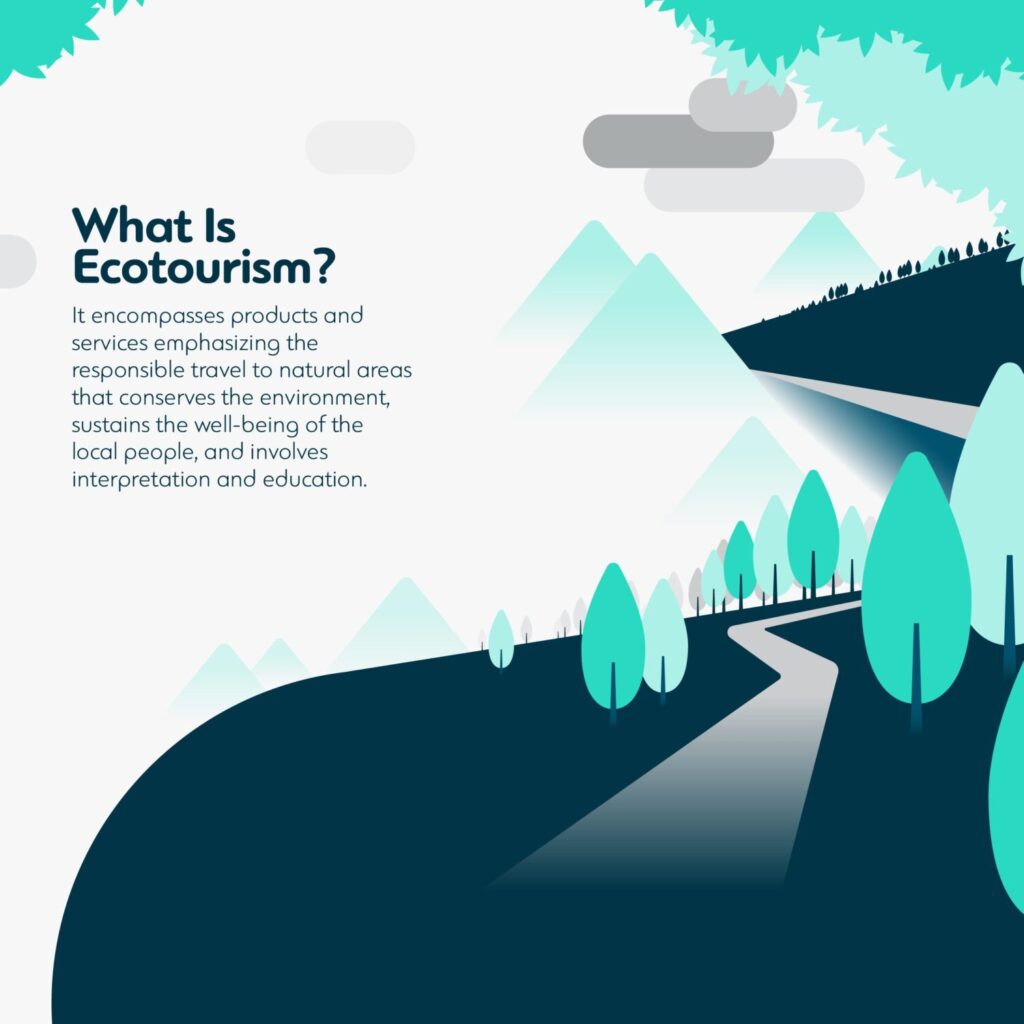
Before we move on, let’s first define what ecotourism is. The widely accepted ecotourism definition goes along the following lines:
“Ecotourism encompasses products and services emphasizing the responsible travel to natural areas that conserves the environment, sustains the well-being of the local people, and involves interpretation and education.”
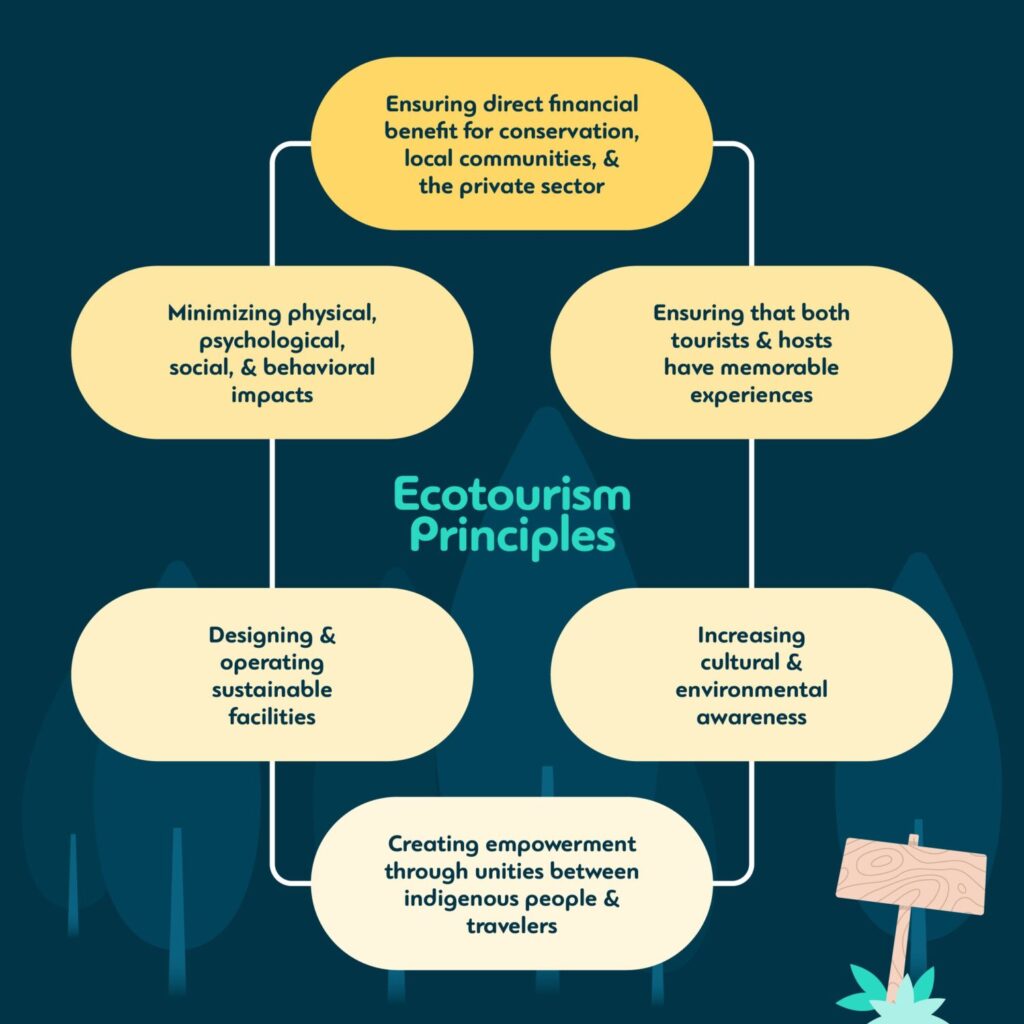
Simply put, ecotourism is where sustainable travel and conservation meet . If you look at ecotourism activities, you will notice they all have something common. These “things” are called ecotourism principles, and they include :
- Ensuring direct financial benefit for conservation, local communities, and the private sector;
- Minimizing physical, psychological, social, and behavioral impacts;
- Ensuring that both tourists and hosts have memorable experiences;
- Increasing cultural and environmental awareness;
- Designing and operating sustainable facilities;
- Creating empowerment through unities between indigenous people and travelers.
Ecotourism has several roles. The most obvious role would be the preservation of the environment, including natural resources. As the sub-component of sustainable tourism , it also promotes the preservation and conservation of cultural as well as natural resources .
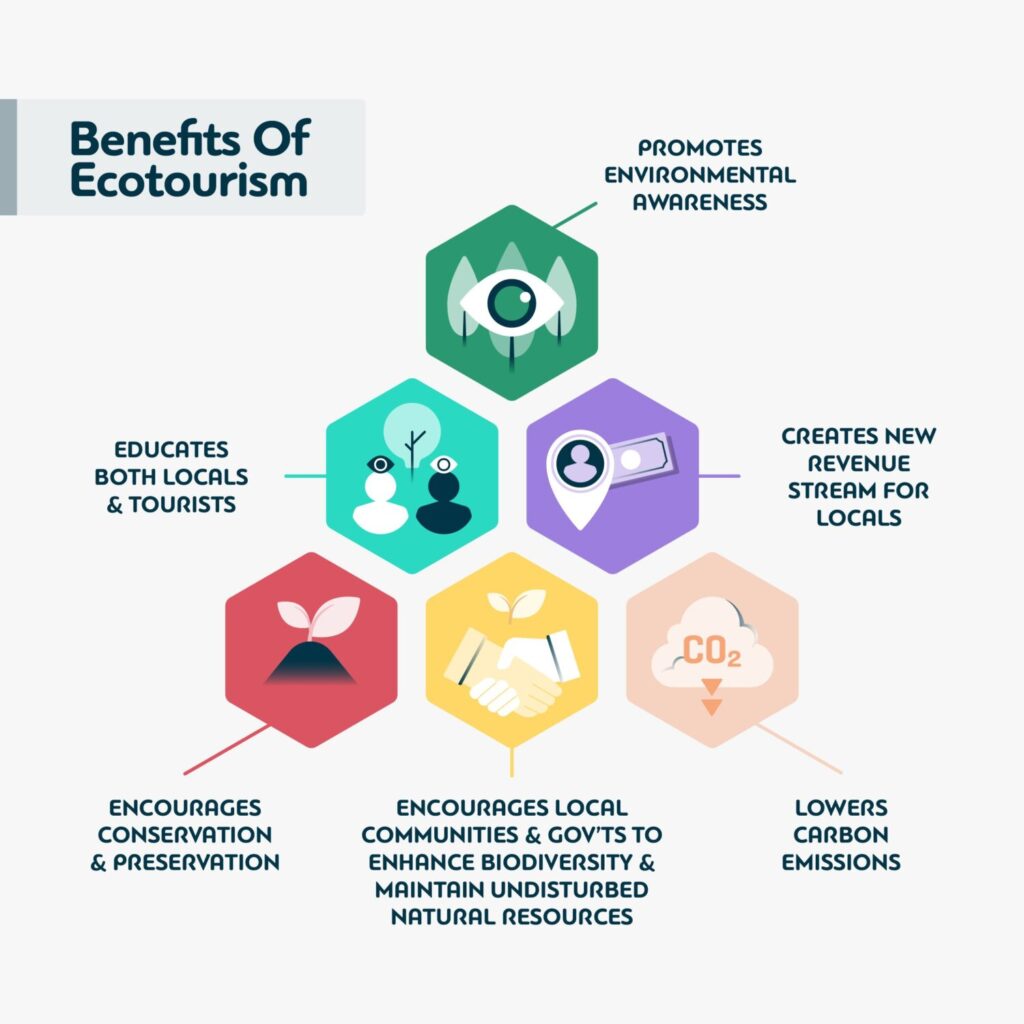
Since it has a couple of roles, ecotourism offers numerous benefits. The most noteworthy ones include:
- Promotes environmental awareness;
- Educates both locals and tourists;
- Creates new revenue stream for locals;
- Encourages conservation and preservation;
- Encourages local communities and governments to enhance biodiversity and maintain undisturbed natural resources;
- Lowers carbon emissions.
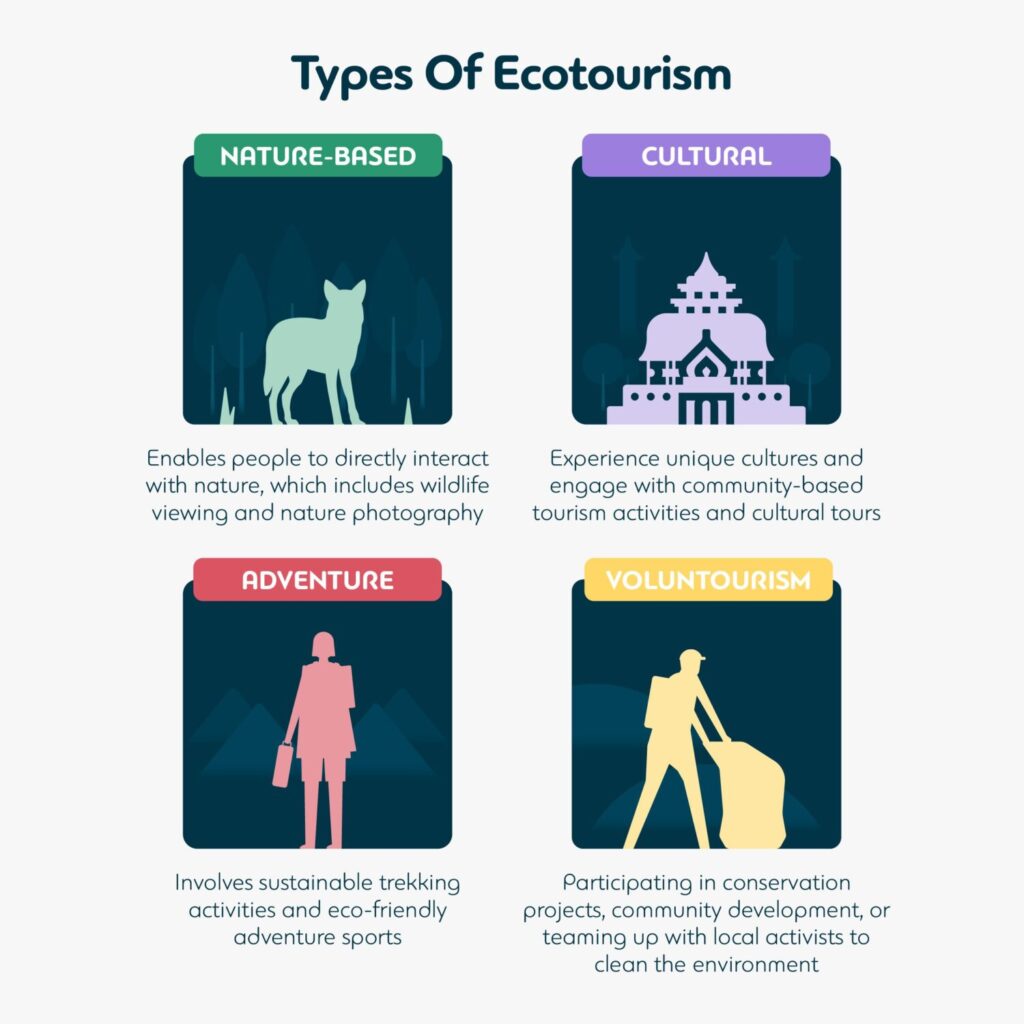
While it may appear as a coherent field, ecotourism is quite a diverse niche. In fact, there are four unique types of ecotourism. The types come from the kind of activities that tourists can engage in.
Nature-based Ecotourism: Direct interaction with nature
As the name implies, nature-based ecotourism is all about enabling people to directly interact with nature. The imperative is to allow consumers to experience nature firsthand while ensuring nothing is disturbed. The most common nature-based ecotourism activities include wildlife viewing and nature photography.
Cultural Ecotourism: Focusing on local cultures, traditions, and customs
Some destinations have to offer more than natural attractions. Some places are attractive to tourists because of the local communities that live there. Many things can make a community unique, but in this case, it’s culture. Many consumers want to experience unique cultures and engage with community-based tourism activities and cultural tours.
Adventure Ecotourism: Combining Thrill and Sustainability
Adventure tourism is as old as tourism itself. Adventure ecotourism is one of its newest sub-components. Destinations can attract responsible consumers if they market their activities as eco-friendly. Some examples include sustainable trekking activities and eco-friendly adventure sports.
Adventure ecotourism is also attractive to businesses looking for eco-friendly alternatives to traditional team-building meetups.
Voluntourism: Combining travel with volunteering for good causes
Consumers deeply devoted to preserving nature are interested in a specific type of ecotourism called voluntourism. Look at it as a combination of travel and volunteering centered around a good cause. Some examples of voluntourism include participating in conservation projects, taking an active role in community development, or teaming up with local activists to clean the environment.
Now that you understand what ecotourism really is let’s see how ecotourism principles reflect on specific initiatives. Here are a couple of ecotourism examples to learn from.
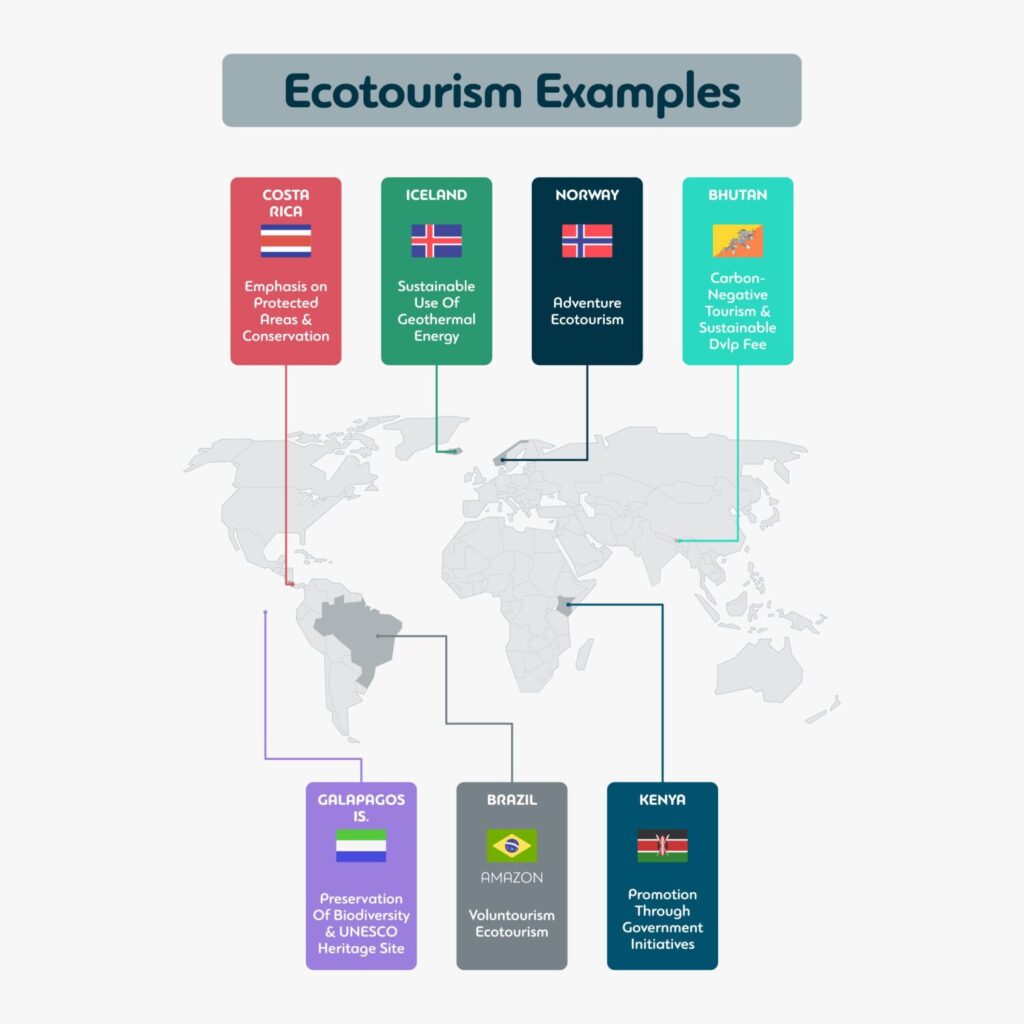
Costa Rica: Emphasis on Protected Areas and Conservation
Costa Rica is a perfect ecotourism example to learn from because it’s deeply embedded into Forever Costa Rica’s Protected Areas Program . The program was launched in 2010, and so far, it raised over $5 million. Making the program a national strategy enabled Costa Rica to complete 97% of the planned projects.
The focus was and still is on protected areas and conservation. The projects aimed to improve collaboration with local communities and use technical tools to improve the control of protected areas and monitor their management. As a result , the country has to offer over 26 national parks, 58 wildlife refuges, 15 wetland areas, 32 protected zones, and 8 biological and 11 forest reserves.
Iceland: Sustainable Use of Geothermal Energy
Iceland is another excellent example of a leader in the world of ecotourism. Once again, it all happened because the government took an active role in bringing the entire country as closely as possible to zero carbon emissions.
Iceland’s strongest suit is geothermal energy. In fact, approximately 85% of primary energy use in this country comes from renewable sources, and 66% of energy use comes from geothermal sources . According to the same source, more than 90% of homes in Iceland are heated with this type of energy. The country also uses geothermal energy to keep the streets free of snow and ice.
Bhutan: Carbon-Negative Tourism and Sustainable Development Fee
Bhutan is an attractive tourist destination found on the bucket lists of many consumers. The key people in its government know the country’s strengths lie in its unique nature and culture – and to conserve and preserve it, the country needs money. To secure the cash, Bhutan decided to implement a Sustainable Development Fee.
The carbon-negative tourism and sustainable development fee supports cultural and environmental development. At the start of 2023, the country raised the fee to fund all the projects aiming to promote and ensure sustainability.
Galapagos Islands: Preservation of Biodiversity and UNESCO Heritage Site
We can’t talk about ecotourism without mentioning Galapagos Islands. This destination is famous for its unique flora and fauna. Some species are endemic, and you can’t see them anywhere if you don’t visit Galapagos. Back in 1976, Galapagos was designated a Natural World Heritage site.
UNESCO designated it a Biosphere Reserve in 1984 and 17 years later a Ramsar Site . The islands also have exclusive sustainable travel partners. You won’t be able to engage in sustainable tourism in Galapagos if you don’t strive to make your business environmentally friendly, source locally produced products, and work with local employees.
Kenya: Promoting Ecotourism through Government Initiatives
Kenya is a prominent example of how to do ecotourism right because the government actively established clear rules, regulations, and policies to promote it. What is it all about? Well, one of the government’s primary goals is to attract tourists to Kenya, especially those that value wildlife and nature.
The country’s official organization Ecotourism Kenya is responsible for promoting responsible tourism activities. The organization encourages all parties engaged in tourism to adopt responsible practices.
Additional examples highlighting different types of ecotourism
There are many examples of ecotourism. Here are a couple more you can further research and learn from:
- Voluntourism in the Amazon – thanks to voluntourism programs , tourists can visit Amazon and rainforest, stay in local villages, protect local wildlife, and teach art, mathematics, and English. This activity helps generate additional revenue for the locals, thus offering an alternative to hunting;
- Adventure ecotourism in Norway – Norway has created tours specifically tailored to the needs of eco-conscious travelers . Travelers can experience northern Norway, tour numerous summits, and trek arctic routes.
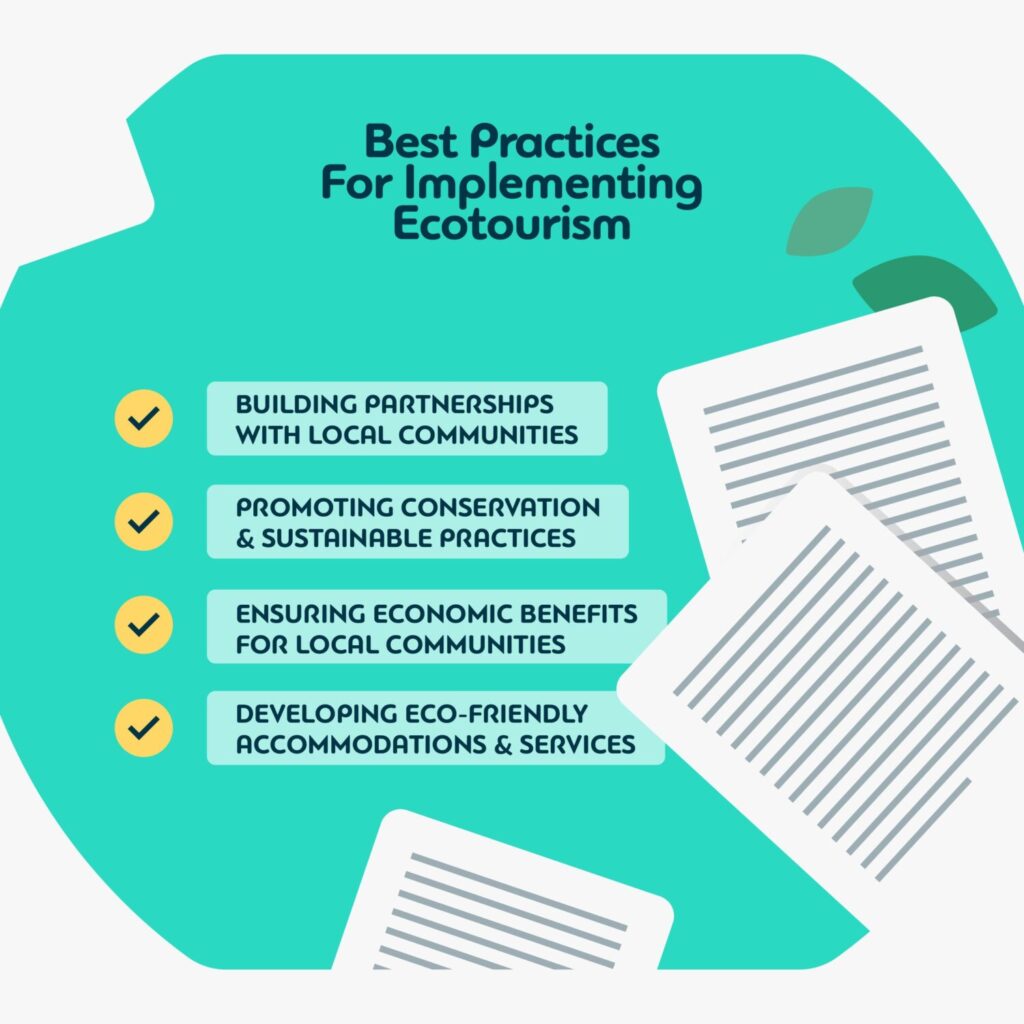
Before you can follow ecotourism principles, you must ensure your success by identifying the best practices for implementing ecotourism in your business.
Building Partnerships with Local Communities
Ecotourism is all about building bridges between your brand and local communities. The focus is on building long-lasting relationships based on trust with the people you plan to work with . After all, they will be directly responsible for the quality of travel and stay experience. You should establish communication with local communities to discover details about specific destinations and expectations of local communities.
Promoting Conservation and Sustainable Practices
Every travel brand that enters the ecotourism space has to adjust its policies and business logic. At the center of operation here, we now have conservation and sustainability. Yes, you should promote both efforts, but they should also reflect your business.
You should leverage your online presence, including your official blog and social media profiles, to promote these practices. You should also share with people what you as a company did to minimize the impact on nature and conserve communities in destinations in your offer.
Ensuring Economic Benefits for Local Communities
While ecotourism is all about preserving nature and conserving the culture of local communities, it’s still a segment of a large industry. It means that every type of ecotourism has to generate revenue for both travel companies and local communities.
You should find the most optimal ways for local communities to reap economic benefits from their engagement with tourism. The funds can help them see your relationship as valuable, and they can use the excess money to start small businesses, restore local attractions, and make destinations more appealing.
Developing Eco-Friendly Accommodations and Services
Finally, you should work on developing eco-friendly accommodations and services. As mentioned earlier, it can help you promote conservation and sustainable practices. It can also help you attract consumers interested in buying travel products and services from green brands exclusively.
More and more world organizations embrace and promote the eco-friendly paradigm making a cross-industrial standard. It’s safe to assume that the future of ecotourism looks bright. Here are three facts that contribute to this bold claim.
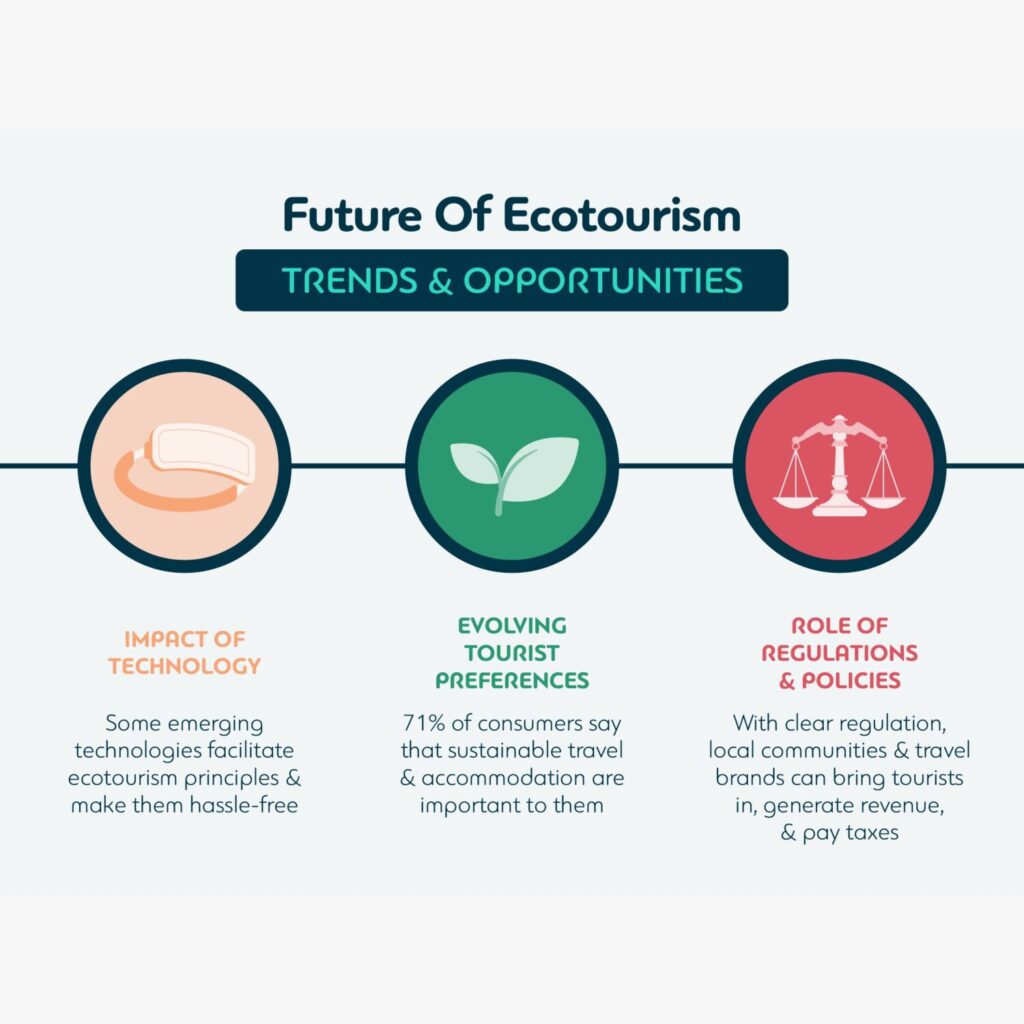
Impact of Technology on Ecotourism
Technology keeps going forward at a rapid pace. Some of the emerging technologies facilitate ecotourism principles and make them hassle-free. Take augmented reality, for instance . This technology alone can significantly help with sustainability, conservation, and preservation, especially when paired with virtual reality, which streamlines virtual tours .
The technology in drones has become quite sophisticated as well. Modern drones have longer flight times, can carry quality video equipment, and have no carbon footprint. Drones are bound to keep revolutionizing ecotourism .
Evolving Tourist Preferences: Demand for Authentic and Sustainable Experiences
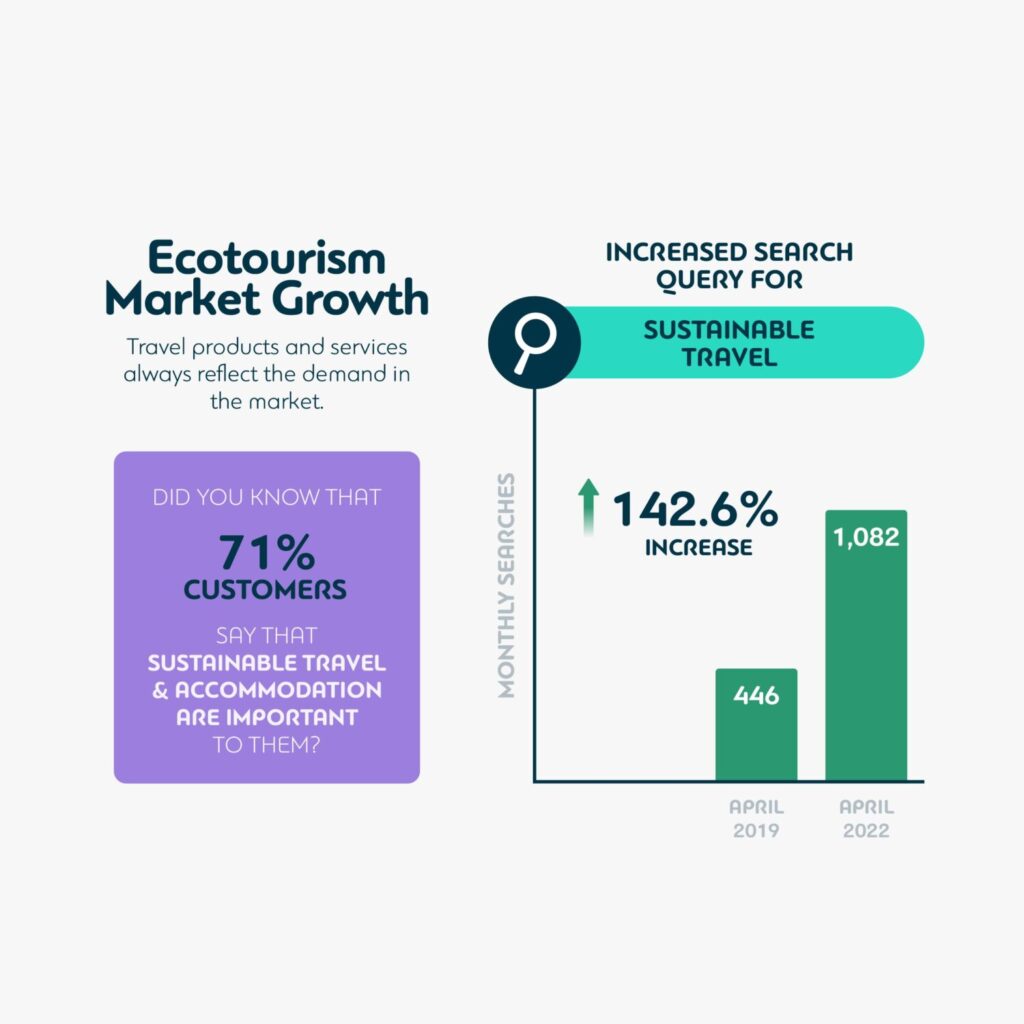
Travel products and services always reflect the demand in the market. Did you know that 71% of consumers say that sustainable travel and accommodation are important to them? The same source also cites that the “sustainable travel” search query trend has increased by almost 150% from 2019 to 2022. The demand for authentic and sustainable experiences is not only there, but it keeps growing as well.
Role of Regulations and Policies in Promoting Ecotourism
Governments in attractive ecotourism destinations have probably the most crucial role . Governments can write regulations and policies to promote ecotourism and prepare and implement standards for its certification and implementation. With clear regulation, local communities and travel brands can engage in prosperous relationships to bring tourists in, generate revenue, and pay taxes.
Ecotourism is gaining traction among travelers of all ages. People are interested in travel and accommodation options, activities, and experiences with none to minimal impact on local communities and nature. At the same time, it’s an excellent opportunity for travel brands and countries to generate additional revenue streams.
However, revenue is not the only reason to embrace ecotourism. Turning to ecotourism is vital for the future of the tourism industry as it can help bring the entire sector to zero carbon emissions and enable small communities worldwide to thrive.
You can start by implementing the best eco-friendly practices relevant to your industry. Next, you can build partnerships with local communities, promote conservation and sustainable practices, ensure economic benefits for local communities, and develop eco-friendly accommodations and services.
You have several marketing strategies at your disposal. You can engage with relevant influencers on social media, develop a PPC strategy plan, and target relevant keywords with your content marketing strategy.
Ecotourism is a complex model which requires thorough analysis and planning. Next, there is often a lack of motivation from communities. You can overcome these common challenges by communicating the benefits to local community representatives and comprehensive investigation, analysis, planning, and execution.
New tech like augmented and virtual reality can help you promote ecotourism. You can even create virtual tours for your consumers to help protect some highly endangered species in attractive environments.
There are many global initiatives promoting ecotourism you can look into, such as the European Commission with its Natura 2000 Award program , UNWTO Sustainable Development , World Animal Protection , EarthCheck , and many others .

Subscribe to our newsletter
Yay you are now subscribed to our newsletter.
Cristóbal Reali, VP of Global Sales at Mize, with over 20 years of experience, has led high-performance teams in major companies in the tourism industry, as well as in the public sector. He has successfully undertaken ventures, including a DMO and technology transformation consulting. In his role at Mize, he stands out not only for his analytical and strategic ability but also for effective leadership. He speaks English, Spanish, Portuguese, and Italian. He holds a degree in Economics from UBA, complementing his professional training at Harvard Business School Online.
Mize is the leading hotel booking optimization solution in the world. With over 170 partners using our fintech products, Mize creates new extra profit for the hotel booking industry using its fully automated proprietary technology and has generated hundreds of millions of dollars in revenue across its suite of products for its partners. Mize was founded in 2016 with its headquarters in Tel Aviv and offices worldwide.
Related Posts

What Is a Tourist Flow? 6 Characteristics
5 min. En las últimas décadas, el turismo ha experimentado un crecimiento notable, pasando de ser una actividad elitista a un fenómeno de masas. De acuerdo a la OMT, el volumen de negocio del turismo hoy en día iguala, o incluso supera, a las exportaciones de petróleo, automóviles o productos alimenticios. Se trata de una […]

From Screening to Hiring: A Guide to Effective Recruitment in the Travel Industry
6 min. The recruitment process of new employees is not based on a paradigm that applies across industries, instead, it revolves around best practices. The same goes for travel companies, including travel tech brands. We are talking about a very profitable market that reached $10.0 billion in 2023, attracting entrepreneurs and numerous workers. It simply […]

Unveiling the 13 Hottest Travel Trends of 2024
13 min. No one knows better than you how dynamic the realm of travel is. Dynamic shifts brought by technological strides, ever-changing traveler priorities, and global events are the new normal in 2024. How do you navigate this landscape that keeps transforming? You should familiarize yourself with the very travel trends that shape the world […]
Eco Tourism – Definitions, Types, History, Characteristics, and Functions
Around the world, ecotourism has been hailed as a panacea: a way to fund conservation and scientific research, protect fragile and pristine ecosystems, benefit rural communities, promote development in poor countries, enhance ecological and cultural sensitivity, instill environmental awareness and social conscience in the travel industry, satisfy and educate the discriminating tourist, and, some claim, build world peace.
Ecotourism is a form of tourism that attempts to minimize its impact upon the environment, is ecologically sound, and avoids the negative impacts of many large-scale tourism developments undertaken in the areas which have not previously been developed.
History of Eco Tourism
The origins of the term ‘ ecotourism ‘ are not entirely clear, one of the first to use it appears to have been Hetzer(1965), who identified four ‘ pillars ‘ or principles of responsible tourism: minimizing environmental impacts, respecting host cultures, maximizing the benefits to local people, and maximizing tourist satisfaction. The first of these was held to be the most distinguishing characteristic of ecological tourism.
Other early references to ecotourism are found in Miller’s (1978) work on national park planning for ecodevelopment in Latin America, and documentation produced by Environment Canada in relation to a set of road-based ‘ecotours’ they developed from the mid-1979s through to the early 1980s.
Ecotourism developed ‘within the womb’ of the environmental movement in the 1970s and 1980s . Growing environmental concern coupled with an emerging dissatisfaction with mass tourism led to increased demand for nature-based experiences of an alternative nature.
At the same time, less developed countries began to realize that nature-based tourism offers a means of earning foreign exchange and providing a less destructive use of resources than alternatives such as logging and agriculture.
By the mid-1980s, a number of such countries had identified ecotourism as a means of achieving both conservation and development goals. The first formal definition of ecotourism is generally credited to Ceballos Lascurain in 1987.
Definitions of Eco Tourism
According to Ceballos-Lascurain, ecotourism is the , ” traveling to relatively undisturbed or uncontaminated natural areas with the specific objective of studying, admiring, and enjoying the scenery and its wild plants and animals, as well as any existing cultural manifestation (both past and present) found in these areas.”
Ecotourism Society defines ecotourism as, ” responsible travel to natural areas which conserves the environment and improves the well-being of local people.”
According to the Ecotourism Association of Australia , ” ecotourism is nature-based tourism that involves education and interpretation of the natural environment and is managed to be ecologically sustainable.”
This definition recognizes that ‘natural environment’ includes cultural components and that ‘ecologically sustainable’ involves an appropriate return to the local community and long-term conservation of the resource.
According to Tickell , ecotourism is “travel to enjoy the world’s amazing diversity of natural life and human culture without causing damage to either”.
Ecotourism is ecologically sustainable tourism that fosters environmental and cultural understanding, appreciation and conservation.
Types of Ecotourism
Fennell considers that ecotourism exits within the broader classification of tourism types which, at an initial level, can be divided into the following types:
- Mass Tourism
- Alternative Tourism
Mass tourism we saw as the more traditional form of tourism development where short-term, free-market principles dominate and the maximization of income is paramount. The development of the tourism industry was originally seen as a desirable and relatively ‘clean’ industry for nations and regions to pursue. This was particularly true in terms of benefits in foreign exchange earnings, employment and infrastructural development such as transport networks.
These days we are more prone to vilify or characterize conventional mass tourism as a beast; a monstrosity which has few redeeming qualities for the destination region, their people and their natural resource base.
This is not to deny that ‘ mass tourism ‘ has caused problems, because it has. There has, quite justifiably, been a need to identify an alternative approach to tourism development that lessens the negative consequences of the mass tourism approach.
Thus the ‘ alternative tourism ‘ perspective has become a popular paradigm. This alternative approach has been described as a ‘competing paradigm’ to mass tourism, but it can also be viewed as a complementary approach to tourism. That is, it is not possible to have ‘alternative tourism’ to.
So, the discussion returns to a semantic debate, perhaps it is best to accept that alternative tourism is a natural outcome of the maturing understanding of tourism development and its strengths and weakness. Fennell states that :
Alternative tourism is a generic term that encompasses a whole range of tourism strategies (e.g. appropriate, eco, soft, responsible, people to people, and green tourism) all of which purport to offer a more benign alternative to conventional mass tourism in certain types of destinations.
However, Weaver quite rightly points out that there are also many criticisms of alternative tourism. It is clear that just because alternative tourism has developed as a reaction to the negative consequences of mass tourism it is not necessarily less harmful or better than its alternatives.
Nature of Ecotourism
Tourism activity is expected to grow by 4.3% per annum in real terms between 2008 and 2017. Ecotourism or nature-based tourism has become the fastest growing sector of the tourism industry growing 3 times faster than the industry as a whole.
There can be no doubting of the increasing trends in environmental concern allied with the historically prevalent trend of travel as for, of escape to nature, driven by the pressures of urban living encourage people to seek solitude with nature, therefore, increasing the numbers of visitors to national parks and other protected areas.
There are a number of dimensions to nature-based tourism. All forms of travel to natural areas are not necessarily ecotourism, but this provides a useful step in differentiating nature-based tourism from ecotourism and gives us a number of levels at which to distinguish the relationship between specific tourism activities and nature:
- Those activities or experiences that are dependent on nature.
- Those activities or experiences that are enhanced by nature.
- Those activities or experiences for which the natural setting is incidental.
There are several classes of nature-based tourism, each utilizing a combination of these dimensions. Bird watching, for example, can provide a pleasant and relaxing holiday based around a general interest in nature and the environment. So that without the natural environment it would be difficult to carry out the activity.
Similarly, camping is an activity/experience which often enhanced by nature. Most people would prefer to camp in some type of natural setting rather than on the side of a busy road. Therefore, nature is an integral part of these experiences but not the fundamental motivation for them.
Principles and Guidelines of Ecotourism
Ecotourism attracts people who wish to interact with the environment and, in varying degrees, develop their knowledge, awareness, and appreciation of it. The Ecotourism Society gives the principles and guidelines of ecotourism. These are following as:
- Prepare travelers to minimize their negative impact while visiting sensitive environments and cultures before departure.
- Prepare traveler for each encounter with local cultures and with native animals and plants.
- Minimize visitors impacts on the on the environment by offering literature, briefing, leading by example, and taking corrective actions.
- Minimize traveler impact on cultures by offering literature, briefings, leading by example, and taking corrective actions.
- Use adequate leadership, and maintain small enough groups to ensure minimum group impact on destination. Avoid areas that are under-managed and over-visited.
- Ensure managers, staff and contract employees know and participate in all aspects of company policy to prevent impacts on the environment and local cultures.
- Give managers, staff and contact employees access to programmes that will upgrade their ability to communicate with and manage clients in sensitive natural and cultural settings.
- Be a contributor to the conservation of the region being visited.
- Provide competitive, local employment in all aspect of business operation.
- Offer site-sensitive accommodations that are not wasteful of local resources or destructive to the environment, which provide ample opportunity for learning about the environment and sensitive interchange with local communities.
- Focuses on personally experiencing natural areas in ways that led to greater understanding and appreciation.
Characteristics of Eco-Tourism
Ecotourism is travel to fragile, pristine, and usually protected areas that strives to be low impact and (often) small scale. It helps educate the traveler, provides funds for conservation, directly benefits the economic development and political empowerment of local communities, and fosters respect for different cultures and for human rights.
Some important characteristics of ecotourism are following as:
1) Involves travel to the natural destination . These destinations are often remote areas, whether inhabited or uninhabited, and are usually under some kind of environmental protection at the national, international, communal, or private travel.
2) Minimize impact . Tourism causes damage. Ecotourism strives to minimize the adverse effects of hotels, trails, and other infrastructure by using either recycled or plentifully available local building material, renewable sources of energy, recycling and safe disposal of waste and garbage, and environmentally and culturally sensitive architectural design.
3) Builds environmental awareness . Ecotourism means education, for both tourist and residents of nearby communities. Well before the tour begins, tour operators should supply travelers with reading material about the country, environment, and local people, as well as a code of conduct for both the traveler and the industry itself. Ecotourism projects should also help educate members of surrounding communities, schoolchildren, and the broader public in the host country.
4) Provides direct financial benefits for conservation . Ecotourism helps raise funds for environmental protection, research, and education through a variety of mechanisms, including park entrance fees; tour company, hotel, airline, and airport taxes. And voluntary contributions.
5) Provides financial benefits and empowerment for local people . Ecotourism holds that national parks and other conservation areas will survive only if, there are happy people around the perimeters. The local community must be involved with and receive income and other tangible benefits (potable water, roads, health clinics, etc.) from the conservation area and its tourist facilities.
6) Respects local culture . Ecotourism is not only “greener” but also less culturally intrusive and exploitative than conventional tourism. Whereas prostitution, black markets, and drug often are byproducts of mass tourism, ecotourism strives to be culturally respectful and the human population of a host country.
7) Supports human rights and democratic movements . The United Nations-sponsored World Tourism Organization proclaims that tourism contributes to “international understanding, peace, prosperity, and universal respect for and observance of human rights and fundamental freedoms for all.
Such sentiments, however, are little reflected in conventional mass tourism. In this way, ecotourism supports humans rights and, to establish international peace.
Functions of Ecotourism
Eco-tourism is nature-based, environmentally educated and sustainably managed. Ross and Wall (1999) outline the five fundamental functions of ecotourism namely:
1. Protection of natural areas 2. Education 3. Generation of money 4. Quality tourism 5. Local participation
Economic Effects of Ecotourism
The job generated by ecotourism provide an important reason for interest in and support for, the phenomenon. These jobs often occur in areas relatively untouched by traditional development efforts and represent tangible economic benefits from natural areas.
Several studies have assessed the local employment benefits of ecotourism; not surprisingly, the level of benefits varies widely as a result of differences in the quality of attraction, access and other factors.
Some important economic effects of ecotourism are following as:
Fiscal Impacts (taxes, fees, expenditures)
Ecotourism not only generates government revenue through business and other general taxes but also through industry-specific channels, such as payment of occupancy and departure taxes.
Reduced access to the resource
Tourism utilizes various resources as inputs into the products and services provided to visitors. In the case of ecotourism, one of these products is nature in a partially or totally preserved state.
Preservation of natural areas often involves reduced local access to resources, such as wood or medicinal plants. In so far as tourism is a partial or sole rationale for preserving an area, it also causes reduced access to resources.
Many destinations have experienced increased price for goods, services, and land due to tourism development, and this is a cost borne by residents of the area who purchase these items.
Effects of the income distribution
In some cases, tourism development exacerbates existing income inequalities within destination communities, while in others it generates new financial elites.
Revenue sharing
At some ecotourism destinations, residents benefit from revenue-sharing programmes that either provide cash payments or, more commonly, funding for community projects such as well or schools.
Environmental Effects of Ecotourism
The impacts of ecotourism depend on what ecotourism is. The critical issue is that ecotourism should involve deliberates steps to minimize impacts, through the choice of activities, equipment, location and timing, group size, education and training, and operational environmental management.
There is now quite an extensive literature on impacts such as trampling, which is easy to quantify experimentally. However, very little is known about impacts such as noise disturbance, soil and water-borne pathogens, and interference with plant and animal population dynamics and genetics, which are likely to have far greater ecological significance.
Some important environmental effects of ecotourism are following as:
- Crushing or clearance of vegetation.
- Soil modification.
- Introduction of weeds and pathogens.
- Water pollution from human waste.
- Air pollution from generator exhausts, noise from machinery, vehicles, and voices.
- Visual impacts.
- Disturbance to wildlife through all of the above, and through food scraps and litter, etc.
A new group of tourism clients has emerged who are demanding different activities, experiences and approaches to tourism from the industry: ‘ these are the ecotourists – people who require environmentally compatible recreational opportunities, where nature rather than humanity predominates ‘.
They are shrugging off the shackles of traditional tourism in search of knowledge and experience. Their interest is not in lounging by hotels pools or hectic sightseeing schedules. They are interested in visiting wilderness, national parks, and tropical forests, and in viewing birds, mammals, trees and wildflowers.
They want to experience new lifestyles and meet people with similar interests to themselves and they want to see their traveling dollars contributing toward conservation and benefiting the local economy.
Ecotourists can be generally characterized as having higher than average incomes, largely holding tertiary qualifications and there tend to be more female ecotourists than men.
According to the International Ecotourism Society, ecotourists are experienced travelers who are more likely to have a college/university degree and have a higher income bracket .
Ecotourists are expecting discovery and enlightenment from their ecotourism experience. Personal growth in emotional, spiritual, as well as intellectual terms, appear to be expected outcomes from ecotourism travel for the majority of these travelers.
Ecotourism Organizations
Ecotourism organizations are the administrative or functional structures that are concerned with ecotourism. Ecotourism organizations help into to minimize the negative impacts and maximize the positive impacts of ecotourism. These organizations can be sorted into three categories:
- Membership non-government organizations (NGOs)
- Public sector or governmental agencies
- Non-membership organizations (NGOs)
Ecotourism organizations, found throughout the world, play important roles ranging from grass-roots advocacy to international policymaking.
International Organizations
In the international arena, many different organizations address ecotourism related issues. World Tourism Organization (WTO) plays an important role in the development of ecotourism. The United Nations Development Program (UNDP) is another international governmental organization that deals with ecotourism, through its international development assistance programme.
WTO and UNDP are just two examples of how international governmental ecotourism related organizations can play a role in making ecotourism a tool for sustainable development. At the international level NGOs also play a role.
Tourism Concern, a UK based NGO dedicated to ensuring tourism is just and sustainable form of business has worked for many years to make tourism more sustainable.
The US-based TES is dedicated solely to ensuring that ecotourism is a viable tool for biodiversity conservation and community development.
National Organizations
Government plays an important role in the national arena. Government related ecotourism organization active at this level generally come from areas: parks management agencies, universities, tourism ministries, and environment or natural resource ministries.
For example, in Kenya, much of the government related ecotourism activities at the national level is performed by the Kenya Wildlife Services (KYS), a quasi-governmental organization whose mandate is the management of wildlife in the country.
Every country has their national organizations for conservation and preservation of natural resources and ecotourism.
Sub-national Organizations
Below the national level is found regional, state and local areas for action. Ecotourism organizations play a role at each of these levels. Queensland Tourism and Tourism Saskatchewan are two examples of state-level public sector ecotourism organizations.
In Australia, Queensland Tourism’s environment division publishes a quarterly newsletter titled EcoTrends informing industry, NGOs, universities and the public sector about ecotourism- related events, accreditation recipients, department research and policy.

IMAGES
VIDEO
COMMENTS
Ecotourism is responsible travel to natural areas that conserves the environment, sustains the well-being of the local people, and involves interpretation and education. Learn about the ecotourism principles and how to minimize impacts, build awareness, and deliver positive experiences.
Ecotourism Definition and Principles . Freder / Getty Images. A conservationist by the name of Hector Ceballos-Lascurain is often credited with the first definition of ecotourism in 1987, that is ...
Ecotourism is a form of tourism marketed as "responsible" travel (using what proponents say is sustainable transport) to natural areas, conserving the environment, and improving the well-being of the local people. The stated purpose may be to educate the traveler, to provide funds for ecological conservation, to directly benefit the economic development and political empowerment of local ...
Ecotourism is traveling sustainably and supporting local ecosystems. Learn how ecotourism can help the environment, the economy and your education, and discover five ways to be a mindful ecotourist on your next trip.
ecotourism: [noun] the practice of touring natural habitats in a manner meant to minimize ecological impact.
Ecotourism is responsible travel to natural areas that conserves the environment, sustains the well-being of the local people and involves interpretation and education. Learn how ecotourism helps the environment, local communities and travelers, and discover some of the best ecotourism destinations around the world.
Ecotourism is responsible travel to natural areas that conserves the environment and improves the well-being of local people. Learn about the origins, evolution, and core principles of ecotourism, and how it can make a positive impact on destinations around the world.
Ecotourism is tourism that observes and appreciates nature and culture in natural areas, with educational and environmental benefits. UN Tourism provides ecotourism guidelines, market studies and activities to support ecotourism development and conservation.
Ecotourism is responsible travel to natural areas that conserves the environment and benefits the local people. Learn about the origin, meaning, and guidelines of ecotourism, and how it differs from green and sustainable tourism.
Ecotourism is a type of tourism that aims to minimize its negative impacts on the environment and local communities. Learn how ecotourism differs from adventure travel, what sustainability practices hotels and resorts can adopt, and what are some examples of ecotourism destinations.
Ecotourism is responsible travel to natural areas that conserve the environment and benefit the local people. Learn the principles, benefits, challenges and differences of ecotourism compared to mass tourism and staycation.
An Introduction to Ecotourism. An Overview of Ecotourism. Ecotourism is broadly defined as low impact travel to endangered and often undisturbed locations. It is different from traditional tourism because it allows the traveler to become educated about the areas — both in terms of the physical landscape and cultural characteristics, and often ...
Ecotourism is a type of tourism that involves visiting natural areas with low-impact and positive socio-economic and environmental effects. Learn about the origin, objectives, and advantages of ecotourism, as well as its role in the economy of some countries.
Ecotourism offers sustainable development, boosts local economies, and preserves native cultures and vulnerable species. Conservation, community involvement, and education are the core principles of ecotourism. Choosing sustainable destinations is crucial for responsible and eco-friendly travel.
ECOTOURISM definition: 1. the business of organizing holidays to places of natural beauty in a way that helps local people…. Learn more.
Definition, Examples and Long-Term Impact. Eco-tourism focuses on ecologically sustainable travel in order to conserve the natural environment. We'll look at popular eco-tourism destinations, and how they are impacted. According to The International Ecotourism Society ( TIES ), eco-tourism can be defined as "responsible travel to natural ...
Ecotourism is a type of tourism that is both environmentally friendly and educational. It focuses on the conservation of natural resources and the protection of the environment while providing locals with sustainable economic opportunities. This form of tourism is designed to provide an immersive experience that allows visitors to gain an ...
Sustainable ecotourism engages the 3 pillars of sustainability: environmental, economic, and social benefits. Unsustainable ecotourism neglects 1-2 of the pillars resulting in negative implications for nature or locals. Nature-based tourism is often confused with ecotourism - learn how to spot the difference.
Ecotourism is responsible travel to natural areas that conserves the environment and benefits local people. Learn the history, principles and advantages of ecotourism, and see some examples from around the world.
Before we move on, let's first define what ecotourism is. The widely accepted ecotourism definition goes along the following lines: "Ecotourism encompasses products and services emphasizing the responsible travel to natural areas that conserves the environment, sustains the well-being of the local people, and involves interpretation and education."
Eco tourism is a form of tourism that aims to minimize environmental impact, respect local cultures, and benefit local communities. Learn about the origins, characteristics, and functions of ecotourism, as well as the different types and levels of nature-based tourism.
Ecotourism comes from two words, ecosystem and tourism. So before understanding the principles and benefits of ecotourism with examples, we have to follow the meaning of the two constituting words. An ecosystem is an environment where various types of organisms live and survive by depending on each other. The ecosystem makes biological ...
Ecotourismis a travel experience, first and foremost, that helps travelers come to a better understanding of unique natural and cultural environments around. the world. Hundreds of specialized tours and lodges now exist in natural areas that allow small groups to see unique environments and cultures with lo.